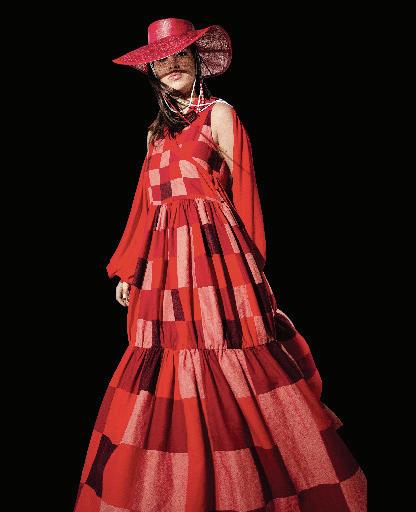






















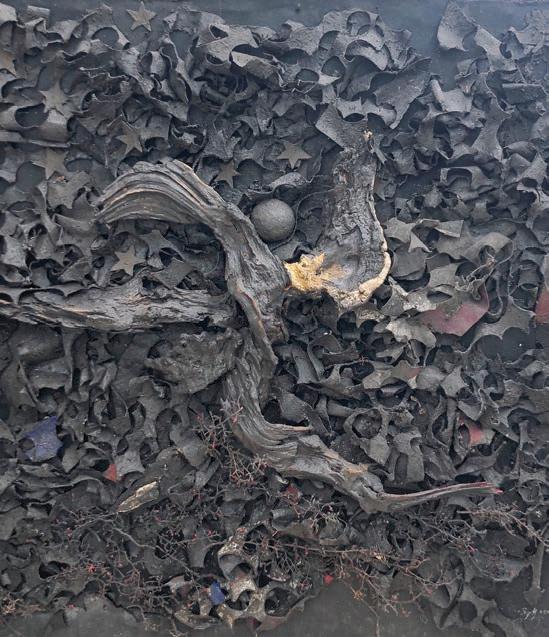
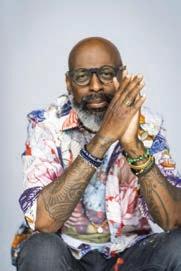
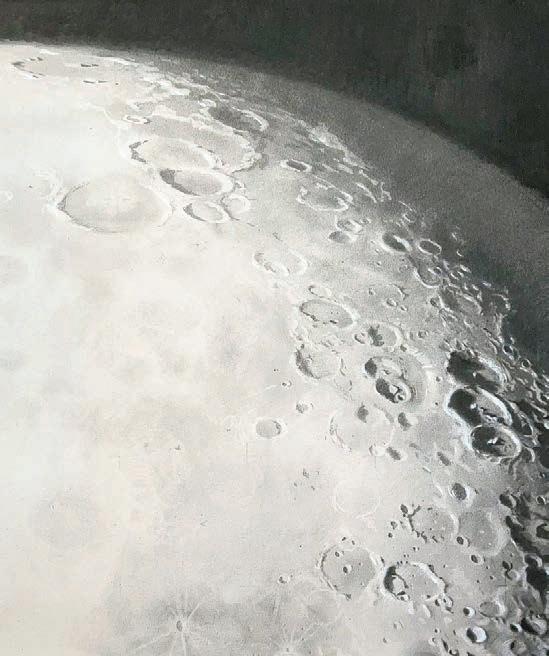
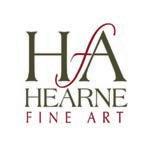 BY C H A R L Y P A L M E R
BY C H A R L Y P A L M E R
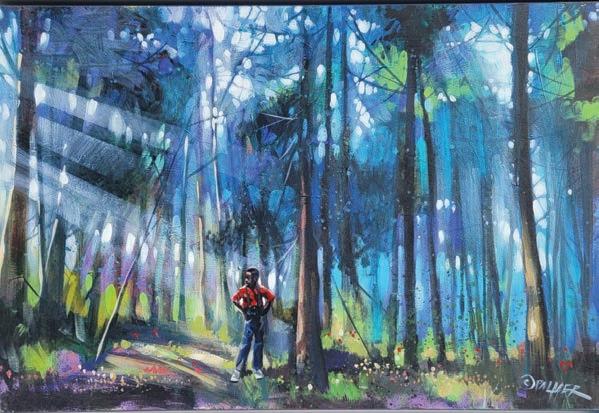







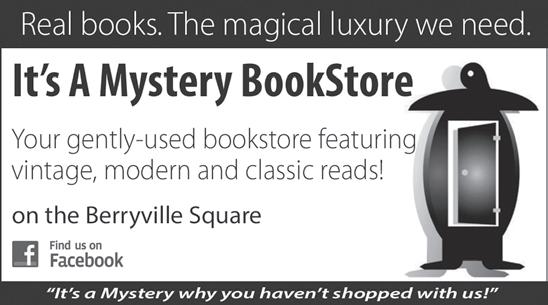
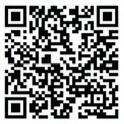
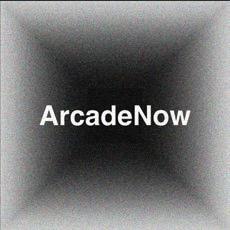
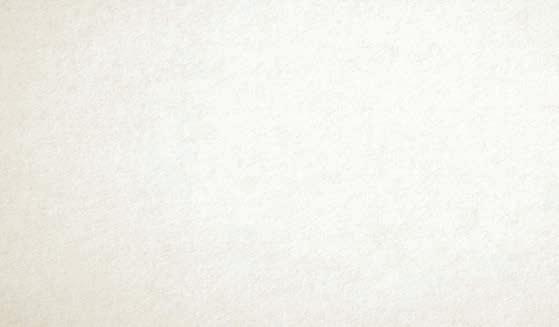 Bess
Bess



Autumn is here, and I’m quite ecstatic about this. Does that really relate to this new issue? Nope. But I’m always willing to take a moment to recognize sweater weather. Because I own way more sweaters than anyone should. This is my time to shine.
We are back showcasing many talented artists in Arkansas. Every time we do a Visual Arts Issue, it’s difficult because there are so many talented people to fit in our limited number of pages. If we overlooked you, please reach out and send us your stuff. We aren’t snubbing you; we just get busy. I’m very grateful to Madi Love and J. Spendlove for serving as creative consultants on this issue and putting up with the hectic pace of building out this issue.
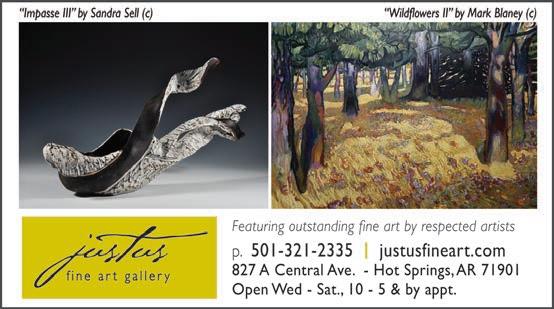
Also, a special thanks to our old friend–the versatile and talented Suzannah Schreckhise–who’s always working on something amazing. Her NWA Mask Project was an interesting response to our 2020 quarantine, and we are happy to showcase this as a special section for her. She recruited some incredible people for this, so be sure to check out her section.
Also, I’d like to send lots of love to our Associate Editor Jenny Vos, who took this issue off to get married! Congratulations to her and her spouse, Charmis, on their union. When I saw them slow dancing to Elvis’ “Only Fools Rush In,” I may or may not have gotten a little choked up. Thankfully, our contributor Cassidy Kendall stepped up to help with editing duties this go-round. Check out her media organization, The Hot Springs Post, and look for her byline elsewhere. We hear she might be hitting the big time soon.
Despite inflation and supply chain issues, The Idle Class is hanging in there this year. We couldn’t do it without our many great sponsors who have stayed with us over the years. We even had a few old friends return for this issue, so thank you to all of them. Please, please, please patronize these places, check out their websites and purchase their goods or services! Most advertising dollars go into the pockets of Big Tech these days. Mark Zuckerberg owns like half of Hawaii at this point, so every dollar spent locally keeps him from buying more beachfront real estate. Do you really wanna see more of his surfing pics with the six layers of sunscreen on his nose? The world doesn’t need that. So shop local with our supporters. Thanks for reading, and go break out those sweaters!
Kody Ford Publisher + Editor-in-Chief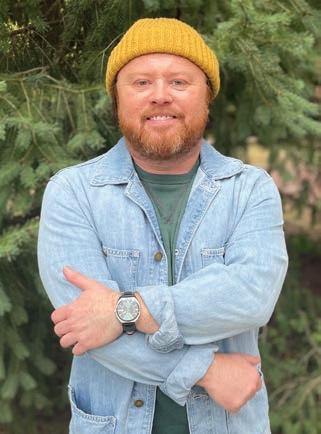
Fashioning America: Grit to Glamour +
Listening Forest
Crystal Bridges Museum of American Art CrystalBridges.org
IG / @crystalbridges
The fall season brings new ex periences to the Crystal Bridg es Museum of American Art in Bentonville. No matter what your schedule, the museum has two unmissable engage ments this season, including a daytime in-gallery fashion ex hibition and an outdoor, night time forest lights excursion
Fashioning America: Grit to Glamour
Open through Jan. 30, 2023
Get red-carpet ready for the museum’s first exhibition dedi cated to fashion! From dresses worn by first ladies to art-in spired garments to iconic fash ion moments that defined a generation, Fashioning Amer
ica: Grit to Glamour offers a dynamic interaction between video, imagery, and over 100 garments and accessories se lected from across two centu ries of fashion. The exhibition emphasizes the work of design ers who immigrated to Ameri ca, Native American and Black designers and iconic fashion brands and their impact on vi sual culture in every decade.
Open through Jan. 1, 2023
Listening Forest, created by artist Rafael Lozano-Hem mer, uses light, sound and projections to create an in teractive walk through the woods. This site-specific ex hibition brings together eight immersive installations, each one activated by you: your heart rate, your body, your voice and your movements direct the forest’s response.
Add your heartbeat to an ar ray of 3,000 lightbulbs, each glimmering to the pulse of a different participant from the

past. Control giant, 20-foottall stick figures made of light. Leave a voice recording that will join a chorus of echoes left by previous forest visitors and much more. Listening For est is open Wednesday-Sun day evenings after dark.
- Erica HarmonOct. 28, 2022 - Feb. 24, 2023

Reception - Oct. 28, 5-7 p.m. Arts + Science Center for Southeast Arkansas asc701.org IG / @asc701
The Arts & Science Center for Southeast Arkansas, locat ed at 701 South Main Street in Pine Bluff, presents Madai Taylor’s An Elegy to America in Black & White II. This poi gnant and provocative exhibi tion of non-subjective works of art with accompanying po
etic writings detail the reason for the pain and suffering of Black folk brought by ship and sold into bondage. It relates to Biblical prophecy against the backdrop of American History, as exacted by the American Spirit. An Elegy to America in Black & White II builds upon Taylor’s 2018 body of work.
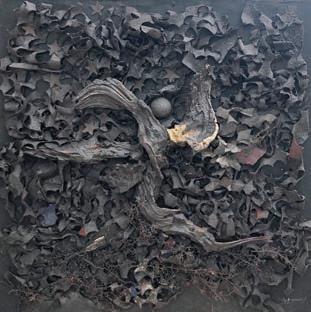
This exhibition is supported in part by a grant from the Arkansas Hum-anities Coun cil and the National Endow ment for the Humanities.
madaitaylor.com
Nov. 3-6, 2022
CALS Ron Robinson Theater
Filmland.org
IG: @arkansascinema
The Arkansas Cinema Society will host their fifth annual cele bration of cinema on Nov. 3-6, 2022, at CALS Ron Robinson Theater in Downtown Little Rock. The event will feature curated selections from festi vals such as Sundance, Tribe ca, Toronto and more. Oth er events include workshops with industry professionals from Arkansas and abroad; in-person screenings of selec tions from the Filmland: Ar kansas program; happy hours and afterparties; and special guest Q+As with filmmakers.
Over the last few years, Film land has hosted award-win ning directors Richard Linkla ter, David Lowery and Chloe Zhao; producers such as Evan Hayes, Fred Berger & Brian Ka vanaugh-Jones; and actors like
Jessica Chastain, Will Forte, Ted Danson and Mary Steen burgen. Filmland has provid ed Arkansans early opportu nities to watch award-winning films such as Nomadland, One Night in Miami and The Eyes of Tammy Faye
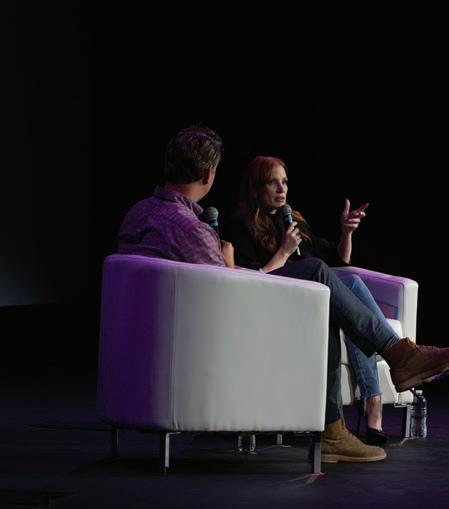
The full program will be an nounced in late October. Get tickets at Filmland.org.
ArcadeNow
Nov. 11-12, 2022 / The Bakery District
@arcade.now
ArcadeNow
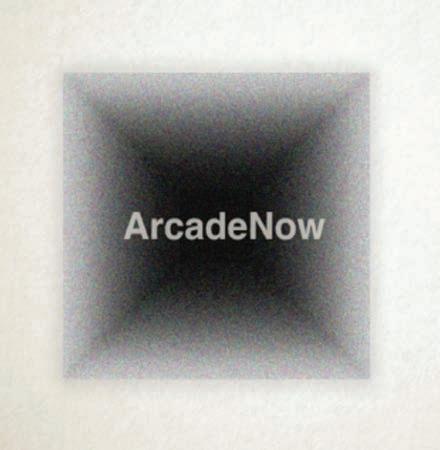
aims to champion and create space for the more experimental side of music, film, dance, and visual art. The genre of music is un defined but will include elements of post-classi cal, ambient, electronic, solo instruments, modu lar synth, and a rapper paired with string quartet.
The brainchild of Emmy-nominated composer Amos Cochran, ArcadeNow is funded through the Artists 360 Community Activator grant provided by the Mid-America Arts Alliance. The line-up features Matt Magerkurth, Thomas Echols, Leon Carlo, Job Smoot, Stringsmen + Baang, Kevin Blagg, Damian Cheek, The Drowned and Christian Serrano-Torres.
The event runs Nov. 11-12, 2022, at The Bakery Dis trict in Fort Smith. Each evening, doors will open at 6 p.m. with performances at 6:30. Tickets are $25 for two-days and $15 for single day. Follow the link in the ArcadeNow Instagram (@arcade.now) to get tickets.
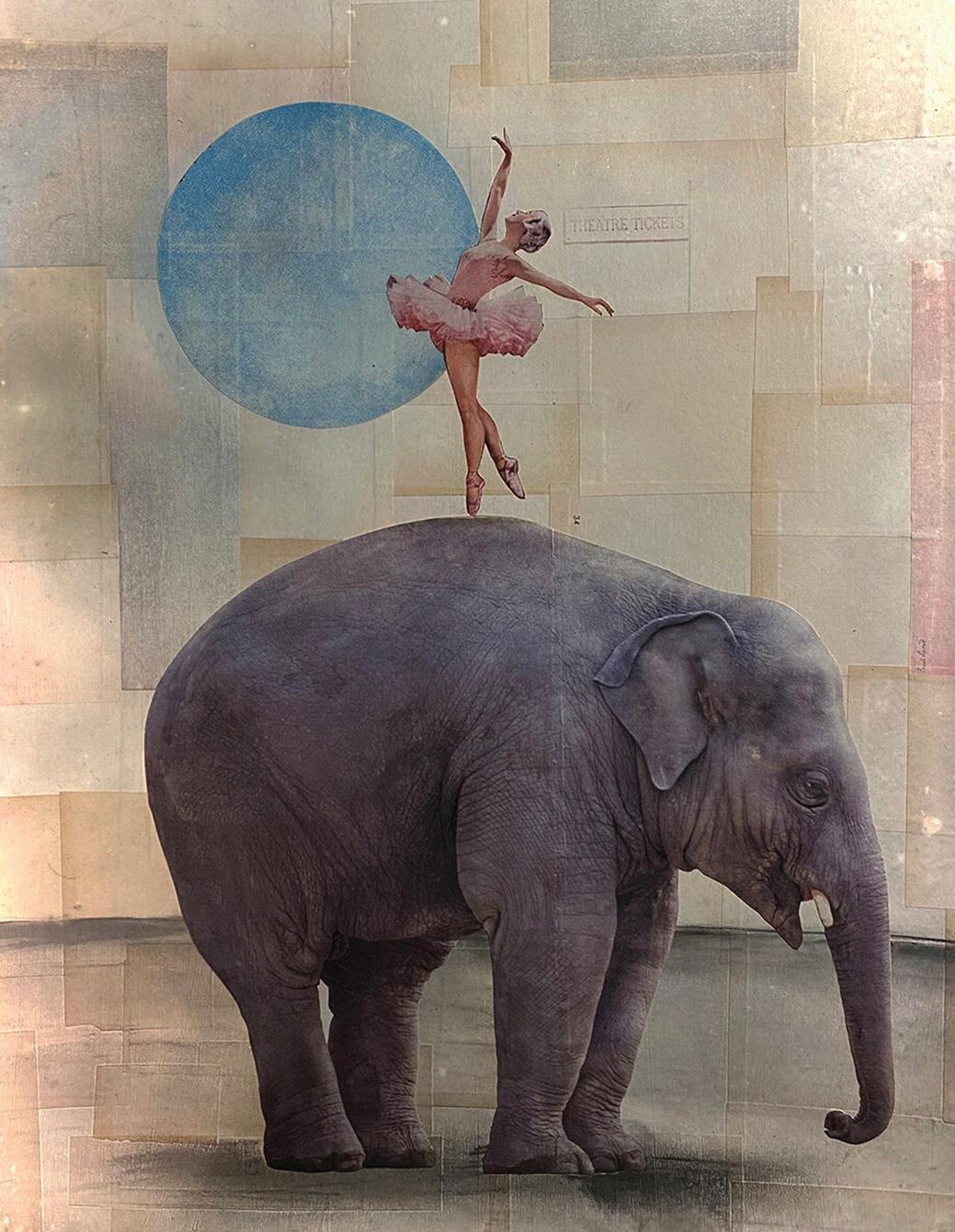
“I’ll Have It All” by Meikel Church

we get someone to turn down the music? No, Sam, I am not too drunk to be standing on this chair. Don’t tell me to climb down again. Don’t act like you can’t see that I’m here. I’m here. Here I am to proclaim the fucking miracles of the Lord and to say: hold up, listen. Know this: that the Lord reigns over I-20 at 3 a.m. in the morning. He saw my Corolla sitting in a ditch with semis rushing past, rattling prayers out of asphalt. He saw my torn hose and ant-bitten shins. He didn’t look away, even though the angels were fluttering around His face like moths, and even though there was only me and some roadkill as far as yonder goes.
The Lord’s got a sharp-tuned ear. The Lord hears when crickets orgasm, and He heard the last cough of my Corolla as it finally hit empty and rolled to a stop.
Could y’all give me a break from your yammering a second? No, I’m not a Jehovah’s Witness. And no, I’m not on speed. Open your ears. Can’t a bitch praise for a moment?
Praise the Lord who gave me this bubble backside that I fall on most days. Praise Him for the cushioned landing. Praise the Lord for the mountains of late-night diner food that went into this ass, for waffles and chicken fries and Velveeta queso, and praise Him for the perfect spandex skirt, the skirt I found at Goodwill. Praise the bourgeois club girls throwing out their clothes because they dripped a little ketchup on the thigh. Lord, have they not heard of Tide to go Instant Stain Remover? I mean, come on. Praise for Tide to go.
Praise the Lord of wobbling and twerking. Praise the Lord of hips that might as well be jelly, for bass so loud that you’re jiggling even when you’re standing still. Praise Him for the jiggle, the wild dance of what was once corn cakes and
jambalaya now just ricocheting off your bones, thrilled to still be kickin’ it with you.
And for The Door, for that dirty venue with holes in the walls and perpetually-clogged toilets, for all the bands and DJs I’m embarrassed to name that I’ve seen there. Praise the Lord for shitty music and too much eyeliner, for lipstick smeared on plastic cups, for the way men still look in skinny jeans even when they’re having to dye their graying roots. Praise the Lord that He made them vain enough to keep wearing skinny jeans even when they should probably move on from those acid-washed vasectomies. Praise Him for those of you daring your circulation to stop right here with just the right combination of fried fish and denim, just for the glory of your asses.
For I am hashtag blessed. I am hashtag truly blessed. I am hashtag praising the Lord for the many ways I’ve been blessed since I woke up this morning, afflicted with the blues that you get when you’ve been working at minimum wage for too long, when your breath smells like the primordial ooze they call breakroom coffee, when you’ve been living in your friend’s basement for a year now, forced to share a bed with their dog Buster, who is possessed by an entire congregation of fleas.
Listen. The Lord has super eyesight. He sees right down to skeletons, which are yawning, which are falling asleep and forgetting how to move. The Lord will prod. He’ll poke. He puts a thirst in the chest that can only be quenched with European remixes of Kanye and Usher.
Praise the Lord for every step taken towards the club, even the ones going backwards or sideways, the drunk-bladder hopscotch outside a gas station toilet, the mile-long walk from my car because I didn’t want to pay twenty dollars for valet parking. Praise the Lord for free parking in
abandoned gas station lots, even if you have to creep your way around buildings and dart across freeways like Indiana Jones.
Praise for the other women in the bathroom line at The Door, for the messenger of the Lord who told me, “Those shoes are dope,” for the fratboy prophet of the Lord who yelled, “Get crunk,” for the Lord in his infinite weirdness speaks through donkeys and flames, and sometimes reflective glass, and sometimes bass guitars, and sometimes even me. Hell yes. Rejoice.
You ever get lost in the woods outside your friend’s house, taking a walk to just try to clear your head, pushing at brambles and baby branches all sprung and crazy and in your business? Getting scratched up by the underbrush, bit by mosquitoes, and starting to wonder if anything you ever try to do just for yourself is worth it? Because every time you begin to launch a life something goes wrong: you take the pill because you’re scared and turn up pregnant anyway, then your boyfriend dumps you for someone named Katrina, just like the hurricane that sent you to this shit-biscuit town in the first place, and maybe you didn’t lose just your family home that late summer, didn’t just lose your dad’s record collection, didn’t just lose your cat, Iggy, whose body was never found, but something else, too. Those weeks standing in line at the Superdome, always waiting for water or news of your family, who could have been dead for all you knew, rioters on one side, assault rifles on the other, some squat ting to shit anywhere, some exposing themselves to children because nothing mattered. That late summer you were a bitch, not in the badass way you wanted, but doglike, cowed, hungry. Twice while you were sleeping against the wall, you woke to some stranger above you, someone who wanted to take the power from your body, plug into you like an outlet. You thought: nothing matters. You thought: I’m dead. Once, you were knocked to the ground, and your right hand was crushed, breaking the bird-fine bones of your fingers. And ever after you hated drinks called hurricanes, hated people called hurricanes, hated hurricanes called hurricanes.
You ever walk faster and faster into a part of the woods that looks dark? As though the deeper you go, the more your ability to transform, to become animal, feral? And all of a sudden you stumble out into a clearing where a bunch of wild plum trees are growing, and it’s just that time of the year when they’re loaded with blue-purple fruit, clustered like fat grapes around one another, twined by honeysuckle and bees losing their ever-loving minds, humming over the sexiness of it all? And you think to yourself: I need to dance. This skeleton still moves.
No really, I’m almost done. And listen, it’s not the beer speaking.
Because the Lord, He sings in the shower. The Lord, He knows how to get low. The Lord, He taught us to pray any way we can, any place we can.
When I left The Door last night, a man followed me outside. He told me to stop. He told me he just wanted a minute. I kept walking. My cell phone was dead. When I heard him behind me, I tried to run, but I stumbled onto my knees. There wasn’t a streetlight or headlight to see. I got up and kept running, thinking about the man’s legs, longer than mine.
Listen: the Lord has hands that can bend back the sky like a blanket, and He kept that man back until I could get in my car and drive.
I drove on and on, not thinking about the empty-tank light flashing on my dashboard until the car seized up and I was on the side of the road, heels off, trying to flag down one of the passing trucks. I put on emergency lights and waved a white bag. No one stopped for me. It seemed darker than night. I stepped into an ant bed, and angry mouths tore up my ankles.
My legs on fire, my car off the road, I wanted to cry but I started laughing instead. I sat in the driver’s seat thinking: you stupid, you stupid, you stupid woman. You immature, you pathetic, you sad little no one, out here alone. Lord help you, you just had to go dancing. For a minute it felt like what I had learned of myself last summer would continue to be true: I’m buried and no one’s going to dig me out.
But the Lord sent some of those bored, moth-like angels down. I swear I almost saw them. Butter-yellow and bobbing to keep out of my peripheral. A hunch hit me. I put my fingers to the ignition and the car started right up. My needle went from Empty to Full, holy gasoline to keep me going, all the way back to Louisiana, all the way to this bar and BBQ, where I can dig up my old dead body and shimmy with her.
What, you don’t believe me? You don’t have to. I’m believer enough for the both of us.
The Lord, He gets shit done. Don’t be dumb. Praise Him for late nights and long roads, praise Him for filling these bone-dry craters with enough fuel to get you to morning, for stopping your enemies, for getting your gears going and your hips moving and your feet stomping and your wheels rolling—no wait, let me finish!— praise for the things that are dead and still being resurrected, like my feet, like my lips, like punk rock and crop tops, like boogies, like blues, like psalms and prayers, like me telling you: I will not shut up. Amen.
“A Psalm for a Full Tank of Gas” was originally
Bayou
Bentonville bets big with FORMAT Festival, bringing in world-renowned musicians and artists alongside regional talent.
WORDS / MARY LOU HILL

The city of Bentonville might not be a name tourists previously recognized. Once viewed as just a small, rural town, this Southern city’s name and reputation are now one to be noticed nationwide. On Sept. 23-25, 2022, Bentonville hosted FORMAT Festival – a three-day and night multidisci plinary experience encompass ing music, art and technology.
Once the festival was announced last Spring, the buzz reached sig nificant cities across the nation
— spreading the word about this small town’s ambitious endeav or. The hype grew, and when fall arrived the highly-anticipated festival debut was finally here.
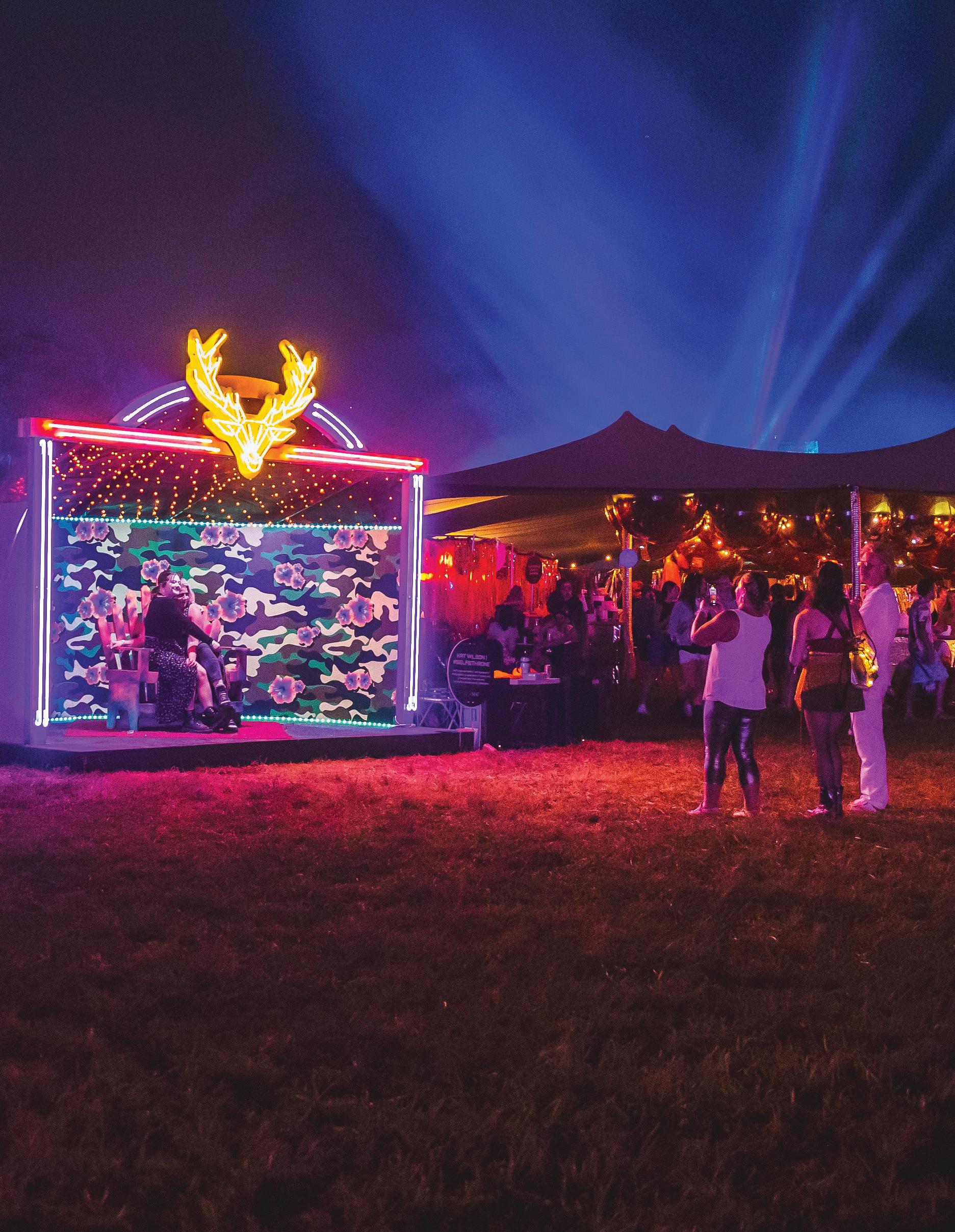
Anxious festival-goers drove into the Ozark mountains and onto the 250 acres of Sugar Creek Airstrip. Wristbands in tact, the reality of the dancing, eating and singing to come set in as they drove under the large, free-flowing and fluffy arch that reads, “FORMAT,” designed by Athen Brandon.
In the center of the festival sits two stages: The North and South of Oz. This is where acts such as The Marias, Nile Rodg ers & Chic, Khruangbin played, Herbie Hancock, Beach House, The War on Drugs, Phoenix, The Flaming Lips, Thundercat and the once-Fayetteville-based Honey Collective performed.
Bars offering specialty cock tails and non-alcoholic energy drinks, along with food vendors, were also present. Local favor ites like Bondi Bowls, Bougie
Selfie Throne by Kat Wilson w/ Derrick Maxey Photo by Kat Wilson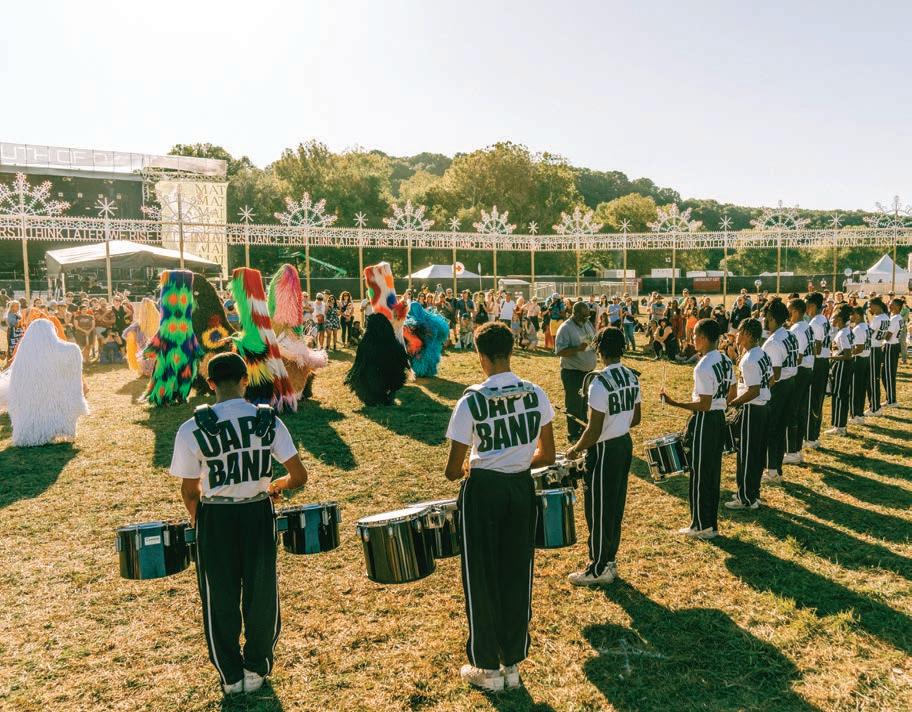
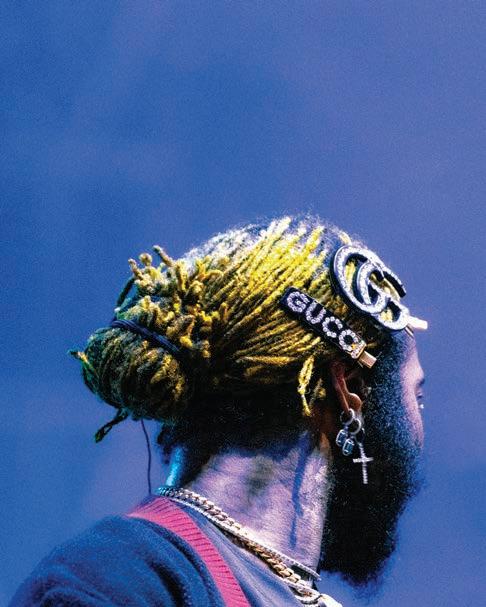
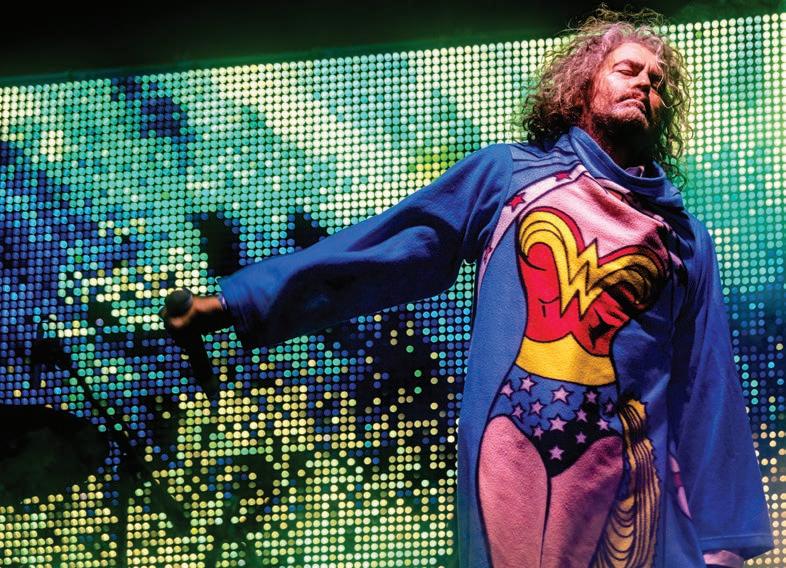
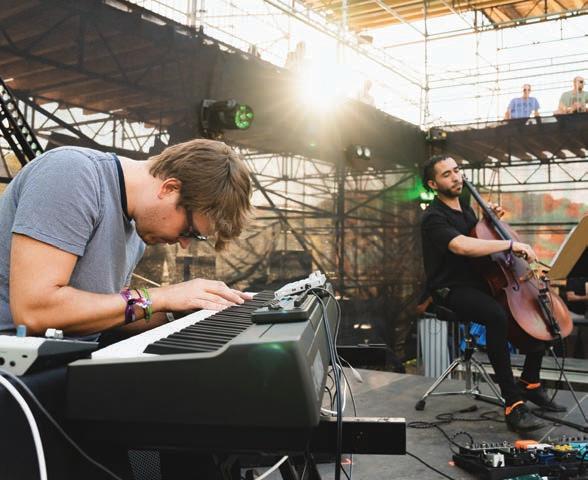
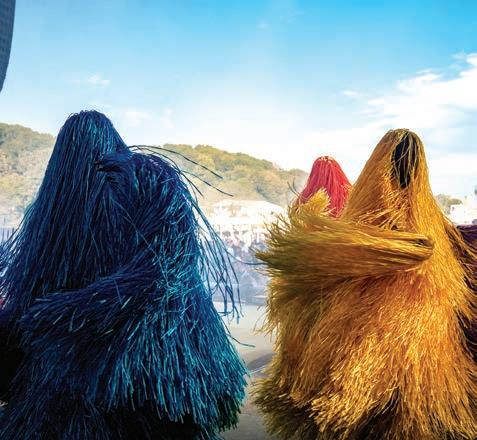
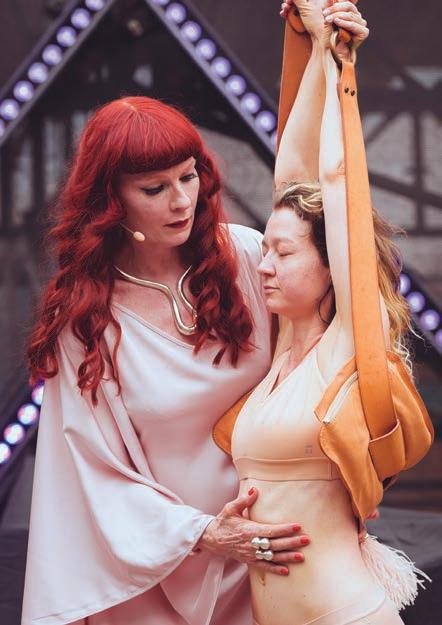
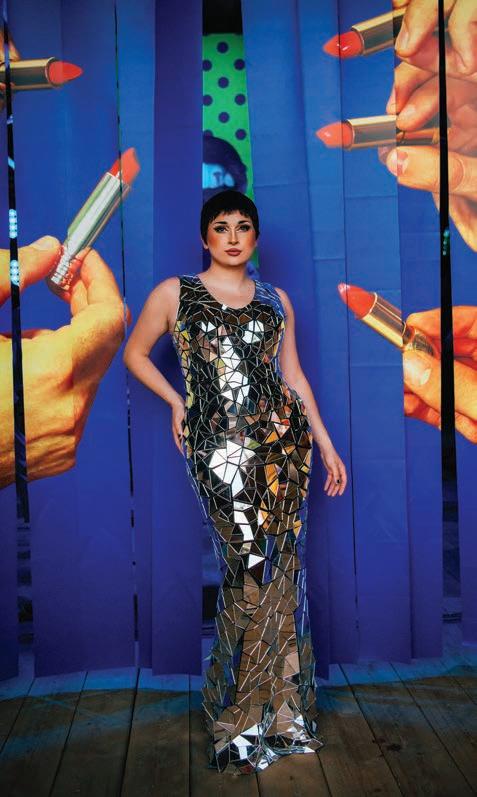 Nick Cave w/ JLin + UAPB Drumline
Photo by Pooneh Ghana
Wayne Coyne Photo by Roger Ho
Amos Cochran + Christian Serrano Torres
Photo by Ismael Quintanilla III
Nick Cave’s Sound Suits + King Fish Photo by Roger Ho
Maddy Morphosis Photo by Charles Reagan
Thundercat Photo by Pooneh Ghana
Betony Vernon’s Hypnosis (w/ Lela Beesom)
Photo by Ismael Quintanilla III
Nick Cave w/ JLin + UAPB Drumline
Photo by Pooneh Ghana
Wayne Coyne Photo by Roger Ho
Amos Cochran + Christian Serrano Torres
Photo by Ismael Quintanilla III
Nick Cave’s Sound Suits + King Fish Photo by Roger Ho
Maddy Morphosis Photo by Charles Reagan
Thundercat Photo by Pooneh Ghana
Betony Vernon’s Hypnosis (w/ Lela Beesom)
Photo by Ismael Quintanilla III
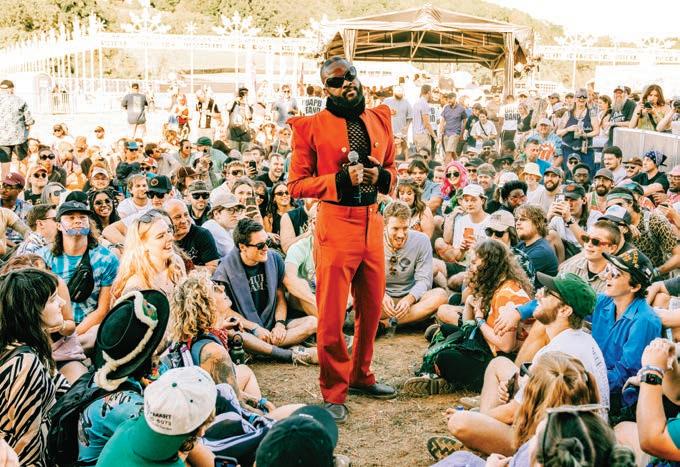
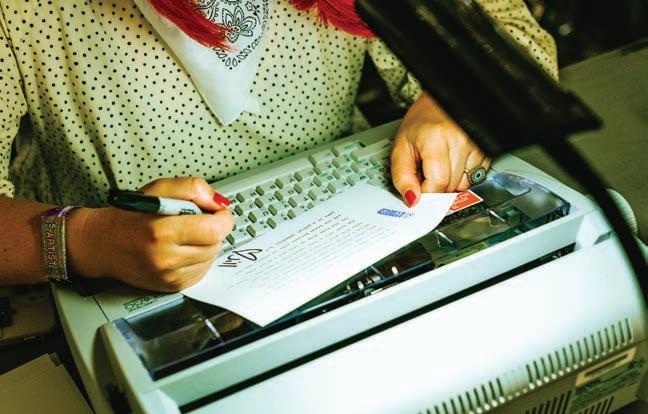
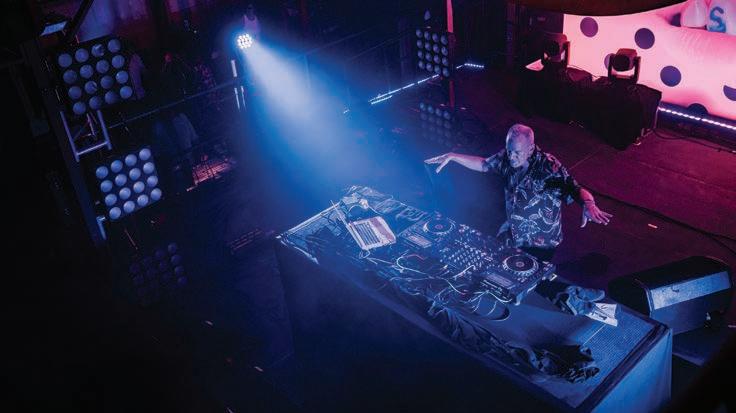
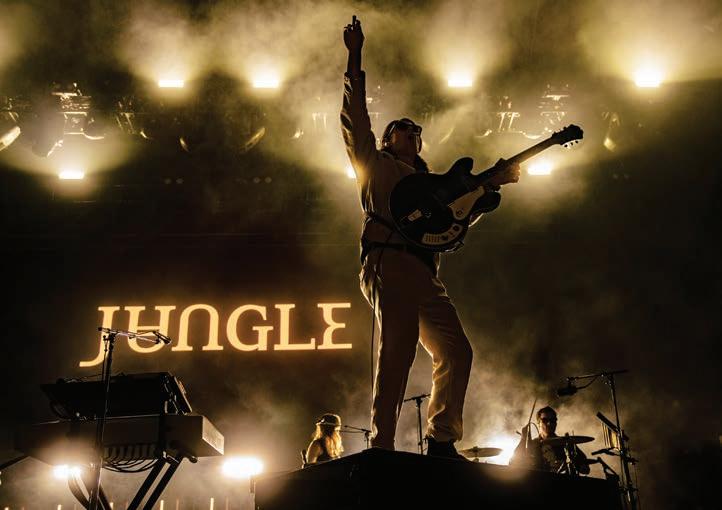
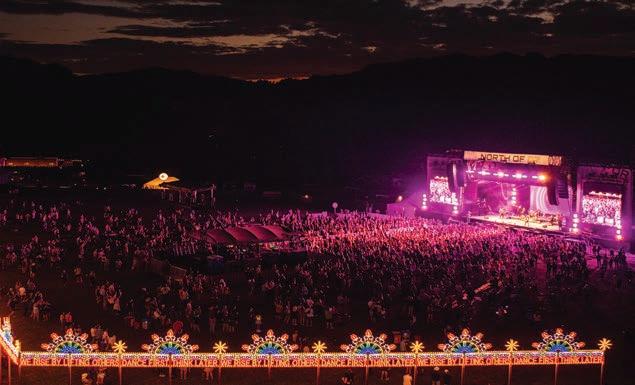
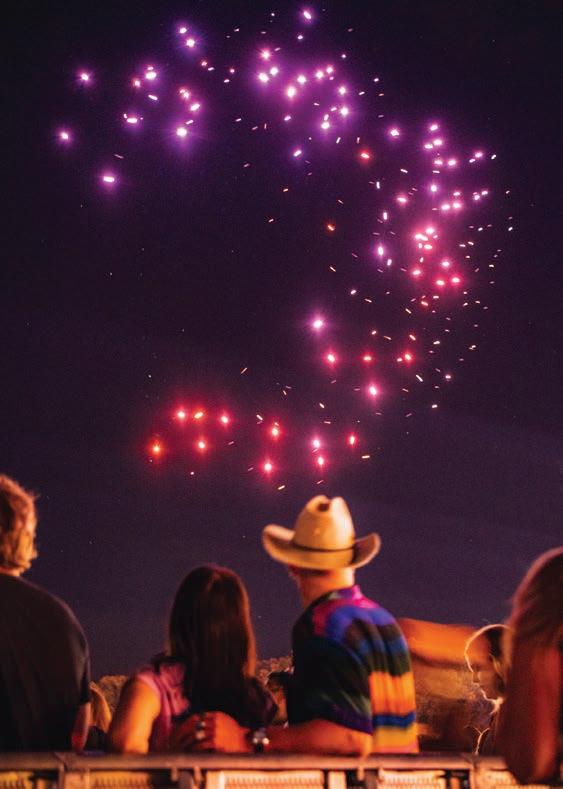
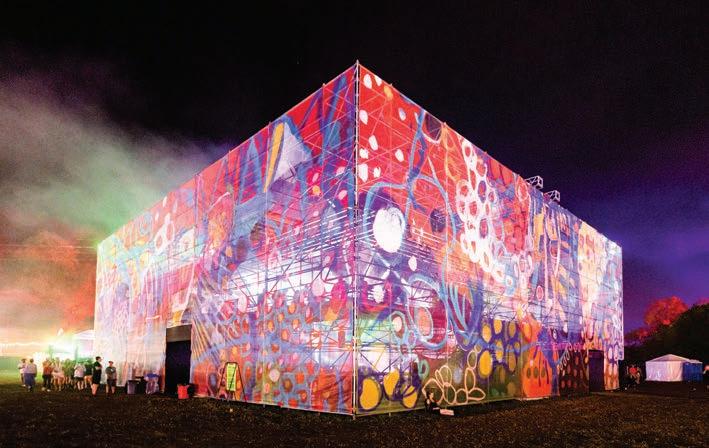 Phoenix Photo by Charles Reagan Jungle Photo by Roger Ho
Fatboy Slim Photo by Roger Ho Genesis Owusu Photo by Pooneh Ghana
Bizarre Bazaar
Photo by Pooneh Ghana
North of OZ stage Photo by Charles Reagan
The Cube Photo by Grant Hodgeon
Phoenix Photo by Charles Reagan Jungle Photo by Roger Ho
Fatboy Slim Photo by Roger Ho Genesis Owusu Photo by Pooneh Ghana
Bizarre Bazaar
Photo by Pooneh Ghana
North of OZ stage Photo by Charles Reagan
The Cube Photo by Grant Hodgeon
Buns, Pedal Pops and Hotboxx Woodfire Pizza were offered in the festival’s food courts.
En route to the back of the grounds, you can cycle through the Bizarre Bazaar — a maze of discovery and curiosity, ranging from local vendors, entertain ment and food. Onyx Coffee, Superfine Sweet Shop and Pink House Alchemy were some food and beverage choices offered, along with retail stores such as Vada, Restore Hyper Well ness and Block Shop Textiles.
Next to the Bazaar, NWA artist Kat Wilson’s neon #selifethrone shone bright in the night. Wil son designed that interactive art piece and it was built by Der rick Maxey. You couldn’t pass by without stopping for a pic and mingling with Wilson and her hype man, Rev. Randy Love.
Wilson said, “I feel like I talk ed to every festival goer. By Sunday night, I didn’t even have a voice left. I think #selfi ethrone let anyone and every one become part of the art.”
Festival-goers that felt like get tin’ down could hit the Disco Barn, a barn transformed into an eclectic madhouse of daily get down’s, vinyl funk sets and live world music. DJ’s Fatboy Slim and Amémé took the stage late Friday night, pulling in fans
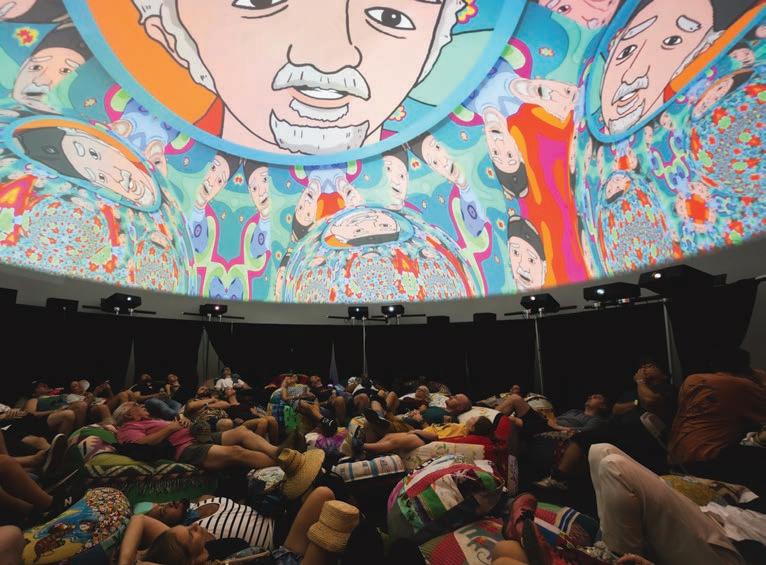
for each of their two-hour sets.
The more techno-inspired en tourage were pulled to The Cube: a journey taking you through augmented sonic real ities, including deep listening sessions, renowned musical acts and local instrumentalists. Past The Cube was DomeRx, an im mersive 360-degree artspace with lasers and light shows cre ated by artist Darren Romanelli.
Emmy-nominated compos er Amos Cochran performed Saturday in The Cube with Italian Hypnotherapist, Beto ny Vernon and Sunday along side Christian Serrano-Torres.
“It was an honor to have been a part of the inaugural FOR MAT Festival,” Cochran said.
“It’s the first time in my career I felt like I was a part of some thing that really landed on a higher tier of professionalism and overall artistic quality.”
Upon sunset, the festival grounds transformed from a daylit throne of activities to an awe-inspiring party. Next Door, a speakeasy, multi-roomed immersive instal lation, provided acts from local musicians and surprise perfor mances, including the hit French DJ, Dombrance, on Sunday.
Saturday brought the Fayette ville-based band, The Phlegms, to perform at Next Door for
an hour set, packing the venue to the edge. They performed their popular songs, “Filter ing,” “Rapid” and “I Will Find You,” along with unreleased songs that will be on their new album released next summer, Phlegms vocalist Avery Lee said.
Past Next Door, the last ven ue at the edge of the grounds is Smokey’s, a forest oasis sur rounded with colorful lights and hidden enclaves, described as an “adult playground.” Smokey’s offered headlining DJ acts Shy girl and Lindstrom to perform in its entrancing light shows.
Annabel Glover, of Fayette ville, attended the festival for all three days and described the experience as a “crazy and awesome party the whole time, a lot of good colors and good music, great vibes.”
Glover’s favorite act of the fes tival was The Phlegms, stat ing their performance was mind-blowing, she said. She is already planning on coming back next year to enjoy what else the festival is going to offer.
Photos courtesy of FORMAT Festival + Kat Wilson
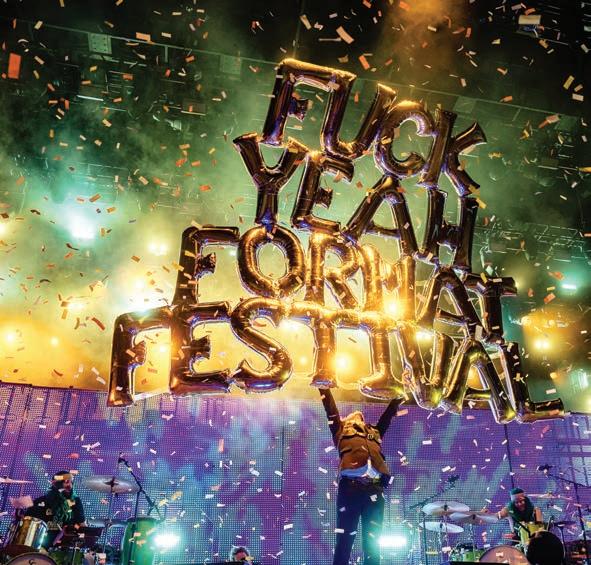 The Flaming Lips Photo by Roger Ho DomeRX Photo by Ismael Quintalla
The Flaming Lips Photo by Roger Ho DomeRX Photo by Ismael Quintalla
Filmmaker, actor + producer Nancy Pop is making a name for herself in the NYC film scene, but she cut her teeth here in Arkansas.
WORDS / CASSIDY KENDALL
Romanian born and Arkan sas raised, award-winning actress, producer and film maker Nancy Pop made the move from the Natural State to New York in order to pursue her career. Having now spent the past nine years doing so, Pop is armed with insight to share with fellow Arkansas creatives trying to make it to the big screen.
At the young age of 17, Pop moved to Manhattan to further her education at Marymount Manhattan College. New York is where she stayed to continue her career. Over the past years she has internationally screened her feature film, Poets Are The Destroyers, and produced mul tiple short films. She even has quite a few commercials, three mini series and a music video under her belt.
She has undoubtedly been busy while in New York, but Pop was quick to note it’s not necessary to leave the state of Arkansas to create such films. When Pop was first introduced to film, it was at the age of 14 on the set of “Moderngrumble,” an Arkan sas-based short film written and directed by Toby Venable. This is where she fell in love with the industry.
“Toby Venable was probably my biggest source of inspiration as far as like, seeing what the pow er of film can do,” Pop said.
Set inside a tiny house off the highway in the middle of no where, she was able to see the world we know be transformed.
“I was just there to film some scary movie, but you stepped into this house and Toby was
telling me like, ‘Oh yeah you know we had to have our pro duction designer come in and they completely redesigned ev erything (and) added all these props,’” Pop said. “They just made it look so cool and like the way that they transformed the world you know and then being able to see that film after we had shot and seeing what they created out of this creepy-look ing house; it was just so cool.”
“Moderngrumble” showed her the power of film. “I kind of just fell in love with the whole, the whole process of it all, you know, starting at that point in my life when I saw what they were able to do with these real ly small budgets, making these really cool art house films,” she said.
A lot of people may think they can’t make movies in Arkansas to start a career in the industry, but Pop said after spending nine years in New York she has come to realize this is not true.
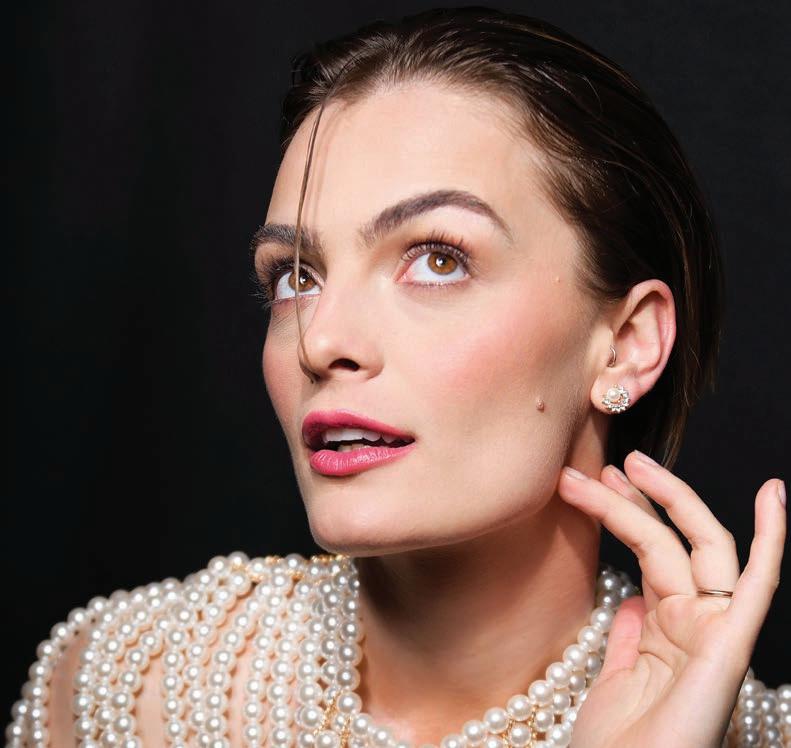
“It definitely helps to be here (in New York) and meet people here, but I would go back home any day of the week right now and and be back in Northwest Arkansas for like, six months or even a year, if it meant that I could be with my family and friends,” she said, “and I can easily make a movie there right now, you know?
“You can really be making things there anytime anyhow, anyway. You just need to have the right team and you need to find a way to raise the money for it, but there’s nothing stopping anybody from making the next Sundance winner or Con winner if you live in Fayetteville or Hot Springs or Little Rock or wherev er. It’s just you just need to do it. Just pick up a camera and start filming.”
Aaron Cheesman is a 25-yearold self-professed Internet baby, perfectionist, Soundcloud rap disciple, and multidisciplinary creative who’s made a home for himself in music. Since his de but mixtape, 2018’s Herbal Ice, Cheesman has planted his fin gerprints on every stage of his music’s production and stoked his urge to innovate, search ing for new frontiers that weave technology and art together.
“I can’t get away from music. It’s ev erywhere. My AirPods are my most important possession to me in the world,” Cheesman says. “When I wake up, I have to listen to music. I have to listen to music in the car. It has to be part of my everyday life.”
Since its advent in the early 2010s, the hip-hop microgenre nick named “Soundcloud rap” has drawn listeners for its numbedout vocal delivery, spacey, Auto Tune-laden soundscapes and a lyrical focus on heartbreak and alienation. Cheesman leans more into the emo and R&B threads of the Soundcloud rap tapestry.
Where many pioneers of Sound cloud rap bottled the energy of drugs or the party in their music, Cheesman is more interested in the underlying intimacy found in taking a good, hard look at yourself in the club’s bathroom mirror or having a smoke out side the function with someone who knows who you really are.
The 2022 Black Apple Award Winner for Favorite Solo Musician has released her latest work, No Better. Tracked live with her band, Steel only added some extra harmonies on the songs after the fact.
“They were essentially one takes, which makes me proud of my band considering we just started performing together and there is a closeness we all shar_e and respect,” said Steel.
Accompanied by 3-D animated album art and an NFT of an AR scan of his head, both of which he created himself, 2021’s A LOTUS FOR YOU, is Cheesman’s most re cent offering. With the romantic, synthy decadence of tracks like “WEDDING CAKE” and “PROM NIGHT,” the project contains the dejected sensitivity of Yung Lean and a dash of the playfulness of SahBabii, all strained through the nocturnal stylings of PARTYNEX TDOOR. Mastered and mixed to a sparkly shine, LOTUS came about from drafts of songscreat ed during a year in China in 2019.
Following the release of LO TUS, Cheesman started an artist residency with CACHE Studios in Bentonville in 2021, where he began writing his upcoming project, Homeostasis, and pre viewed several of the songs in a high-energy performance at CACHE Studios in May 2022.
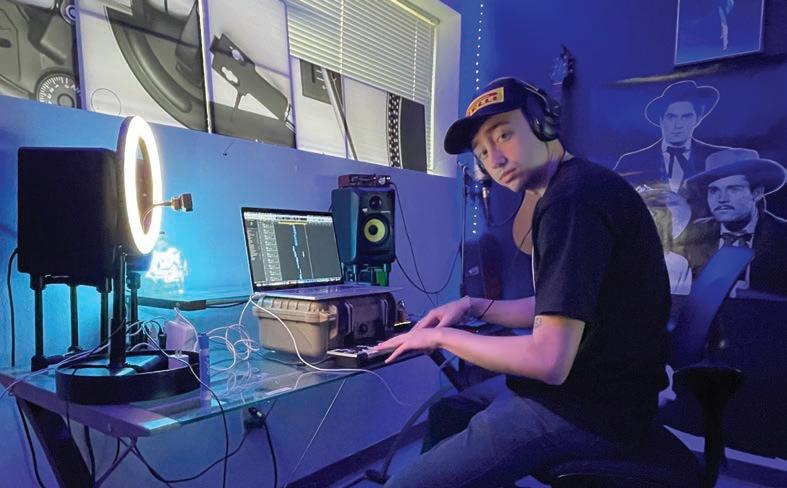
After the deaths of XXXTENT ACION, Lil Peep, and Juice WRLD, internet discourse has conjectured that Soundcloud rap is dead, but artists like NWA’s own Cheesman are doing their part to evolve the genre.
“I would tell a younger version of me just to keep going and stay pos itive and to believe in yourself. No body’s going to believe in you like you believe in yourself,” Cheesman says. “The game does not stop.”
IG: @aaroncheesman“We recorded with Arlie Stiles at George’s in the big room all in a few hours of time. I felt this was the best way to truly give the feeling of what we sound like performing on stage. I am all about making sure you can hear the soul of my music and I want the heart of the band to be felt and heard as well.”
No Better is be available on CD and all online streaming platforms. Patti will launch her Bandcamp and website soon.
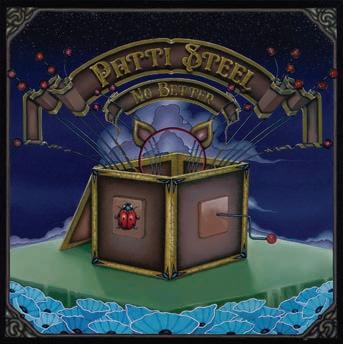
This is a call to all music lovers struggling to figure out their di rection in life. This is for the fans who have decided they want to be more than fans. Maybe booking shows is right for you, and veteran show booker Roger Barrett is here to help. Here’s what he had to say:
Start small and then work your way up. Ask local bands and ven ues how you can help them. Get to gether a small team with friends who can support you, spread the word about your shows and be emotion ally supportive if things get tough.
The best place to get started booking is at a DIY venue. Booking a house show is the best hands-on practice. You can book with an established DIY house, or if you have enough experience with music equip ment, you can talk to your neighbors about start ing your own DIY venue. Be sure to learn your way around a PA system and mixing vocals.
Unless you work at a venue, find another way to make money. Be prepared to send your own money to an artist at first.
Be prepared to message a booking agent or the band directly. If you start booking tour ing bands at all-ages DIY space or bar ven ues, start with door deals. If your goal is to bring touring bands to your town, offer them all of the door income after the bar’s percentage.
Keep it simple when sending a band an offer. The best offer for a touring artist is between $500-800. If you feel confident you can sell 40 tickets at $10 you could offer a $400-guarantee vs. 75% at the door.
Don’t overcomplicate when reaching out to a booking agent. Just ask if the band is touring near town and make an offer. Let them know you’re an independent promoter and your past experience. Then send them venue information once it’s secured.
Get a local band to open. If you’re booking tour ing bands, door deals heavily favor them, and you can’t offer a local band as much if most of the door goes to the touring band. It’s essential to be open with the bands about your budget.
Promotion is crucial. You’ll need your booking ac count on Twitter, Facebook and Instagram. Have your buddies spread the word and announce your shows a few months ahead. Create announce ment posts, advanced ticket sales, and reminders.
Only book what you’re interested in. That’s where branding comes in. You really want to cre ate a name for yourself so that when people see your posters of a band they don’t know, they will at least know that you typically bring in good music.
Above all, keep it fun. Book the shows you want to see and feel confident promoting. Keep your friends involved. Keep doing it.
The songs of Better Luck Next Time find Fayetteville sing er-songwriter Ashtyn Barbaree exploring her love of co-writing and her own development as a songwriter over the last few years. The topics cover a wide variety of situations, but they all
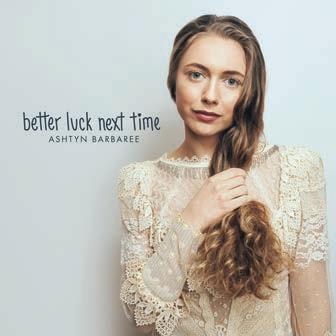
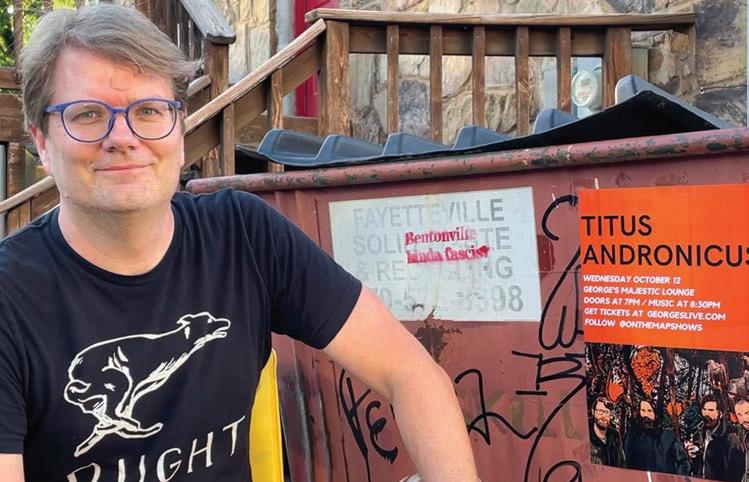
feel personal, she says.

Tracks like “Up In Flames” pull from the headlines where a woman in Lincoln, Nebraska, made national news headlines after she caught her apartment on fire burning love letters.
Better Luck Next Time is available digitally on streaming services. Physical copies can be purchased at her shows.
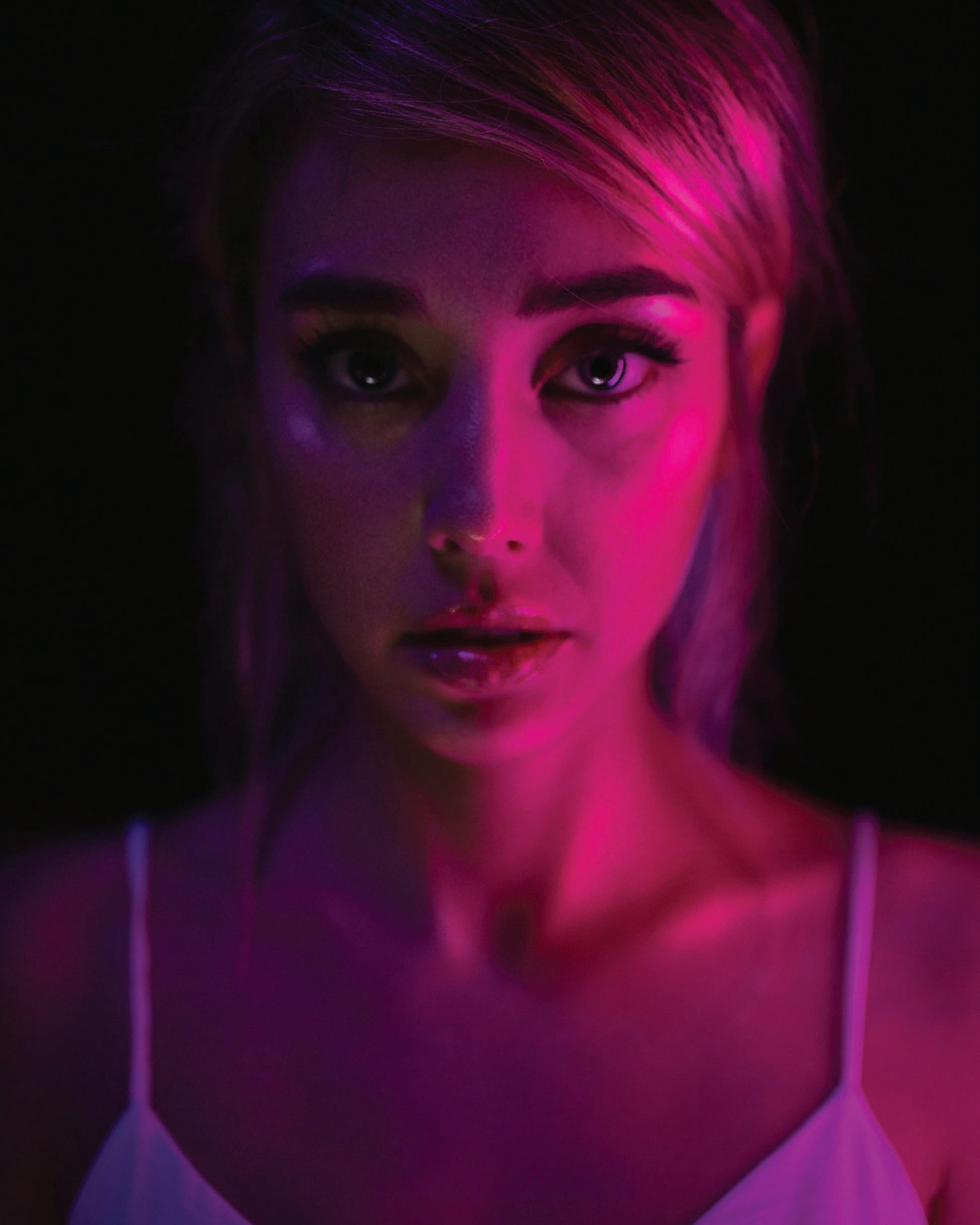

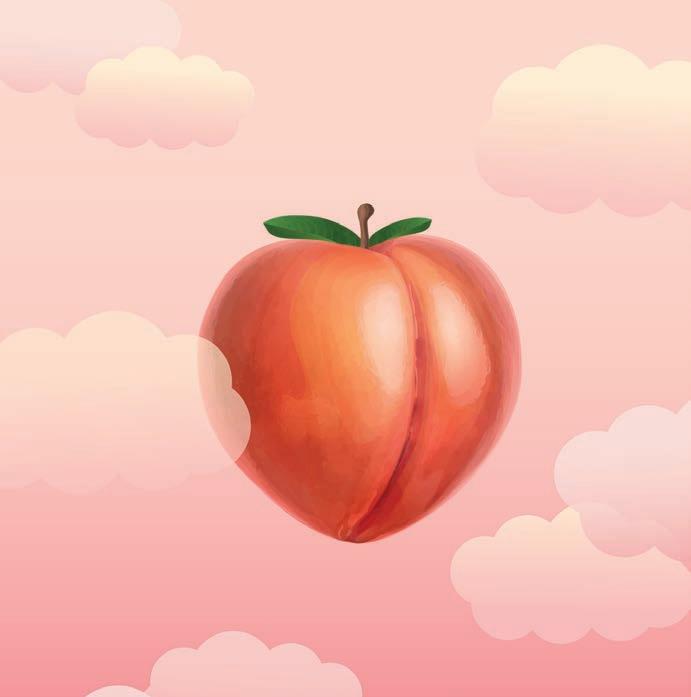
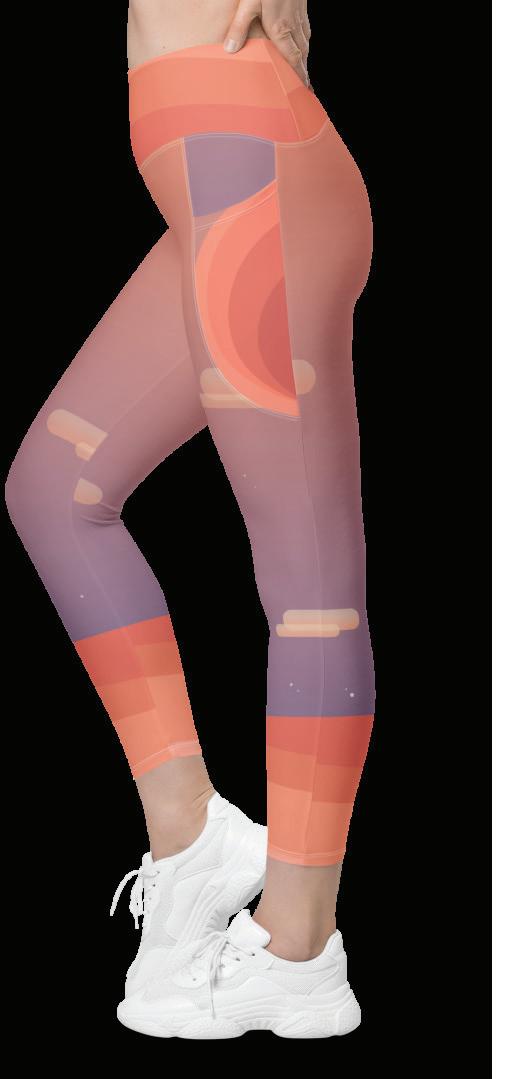

Warm dreamy sunsets, star scattered skys, clouds, lips and somewhat sensual shapes dress the landscapes in Madi’s inviting works of art. Madi’s work isn’t one that goes unnoticed and their captivating simplicity brings the viewer closer. As captivating as subjects go, her most recent exhibit sets the mood at her gallery in Rogers. Featured in the center of the gallery her new piece titled “Peaches and Cream” (as seen on the cover) is a local installation you won’t want to miss.
From waiting tables to Creative Director, Madi Love has worn many hats. She’s created brands, designed graphics and campaigns for large companies and worked with design agencies on a global scale. But who is Madi? The challenge to find this answer has led her on a journey of exploration through nature and visual art.
Each morning Madi watches the sunrise from her dining room window of her quiet forest home. “I observe the colors as they change and fade with the rise of the sun. At that very moment time is fragile, and if you pause something magical happens. The colors are just for you. There is no separation from your fingertips and the skyline. Suddenly the earth is still. “
Madi created her first landscape print at the age of 7. Fascination by the design process and the technology to print herself, eventually led her to pursue a career in the commercial and graphic arts. Her early career allowed her to gain perspective of how brands use art to shape our everyday world.
Madi now designs art and fashion inspired by her love of nature and technology.
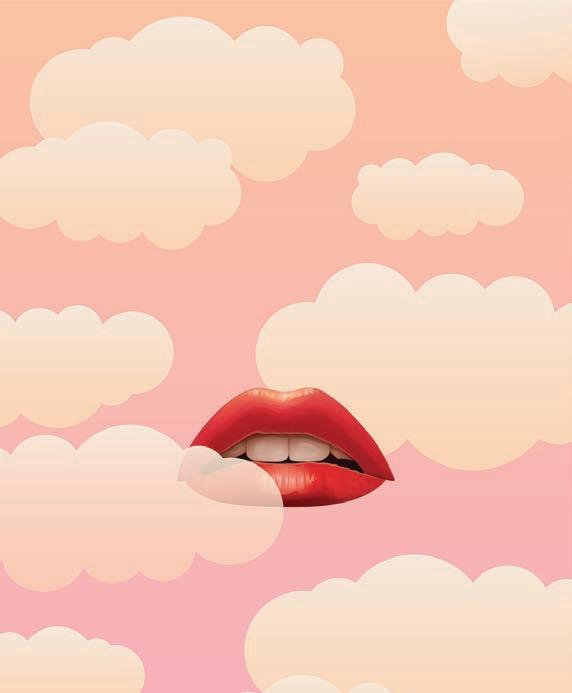
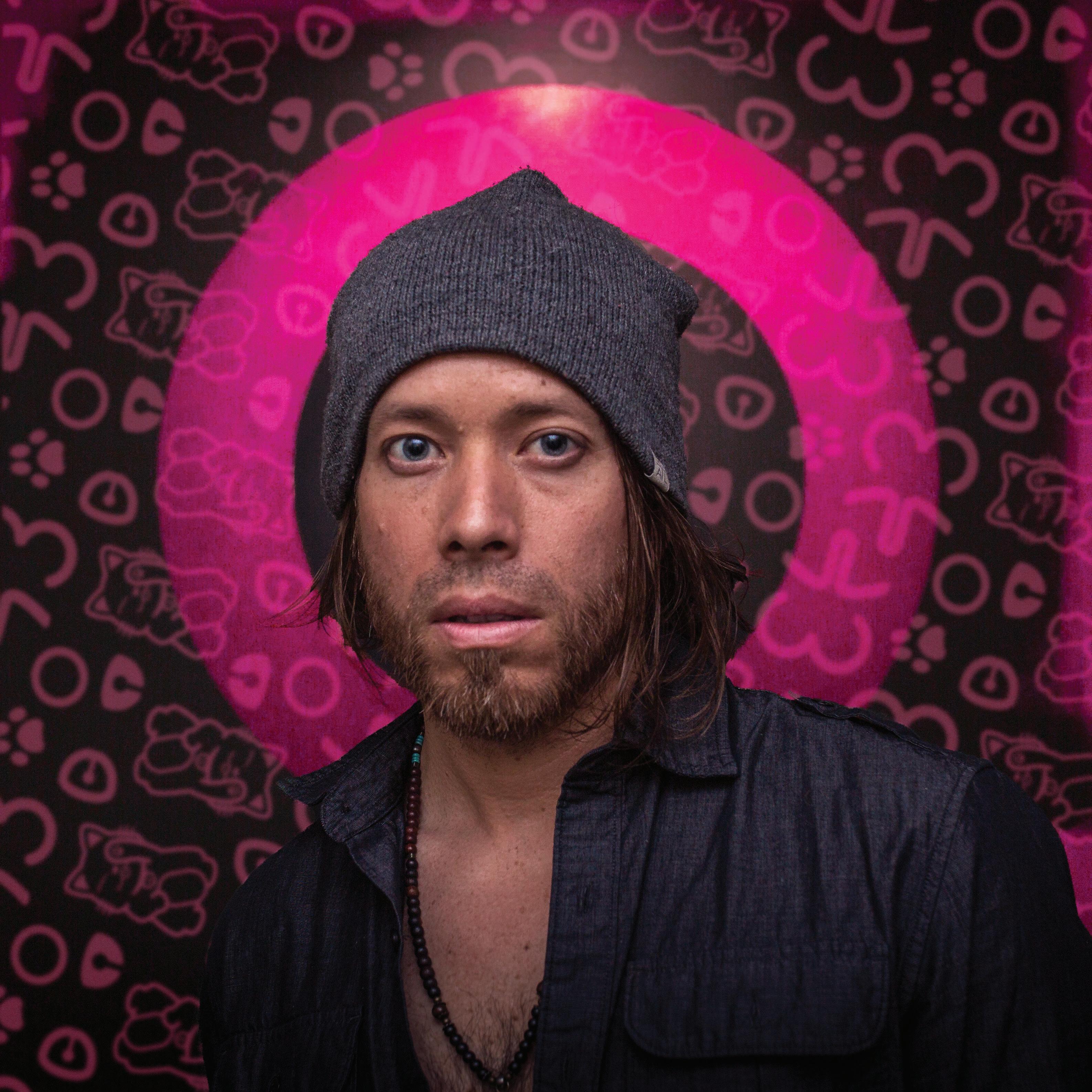
Growing up in Las Vegas, the crazy world that lived behind the buildings and parks where my friends and I would skate, subconsciously influenced us as kids. The marks from graffiti covered trains and alleys that were left on my childhood seemed to offer no other choice but to become an artist.

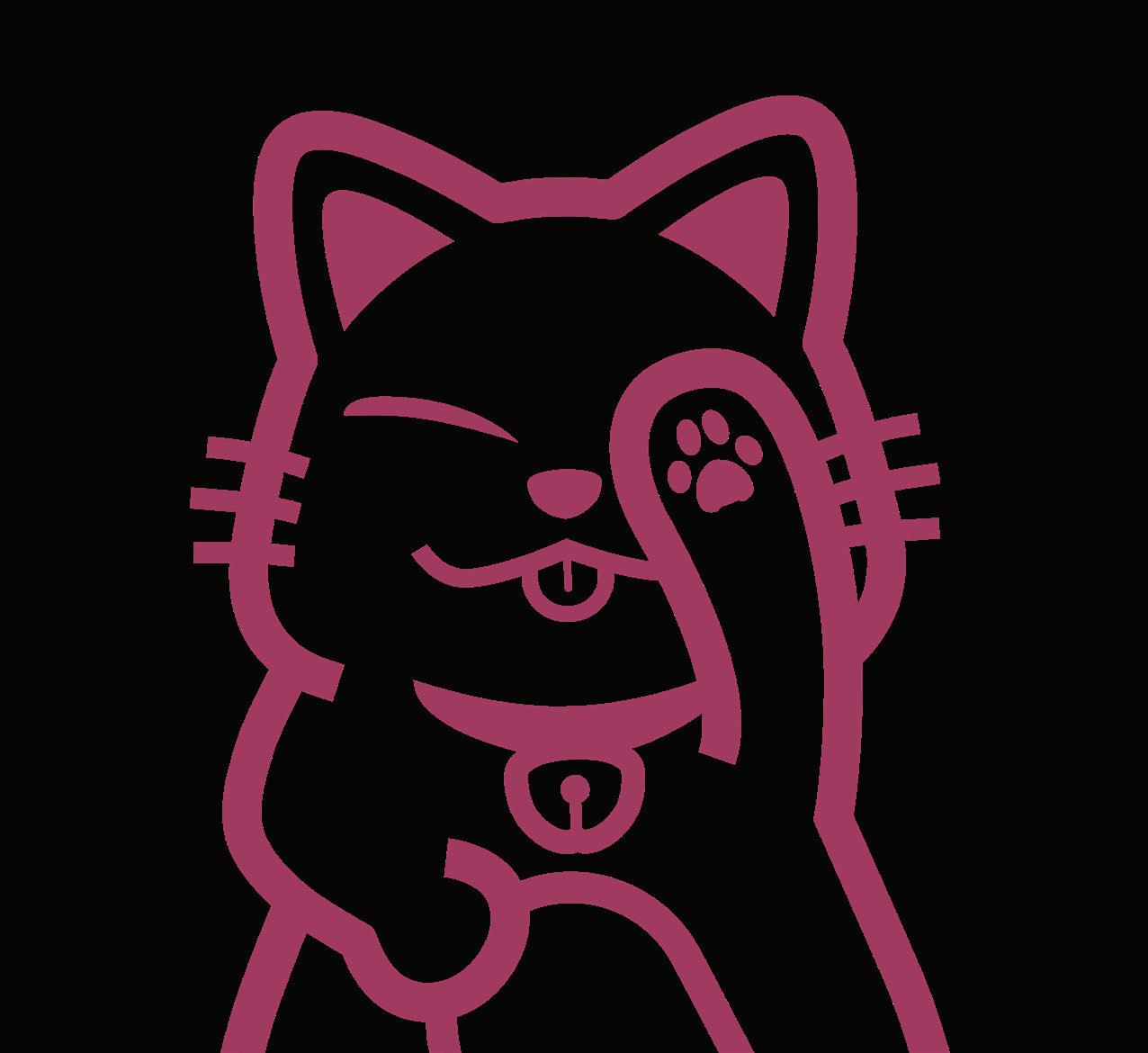
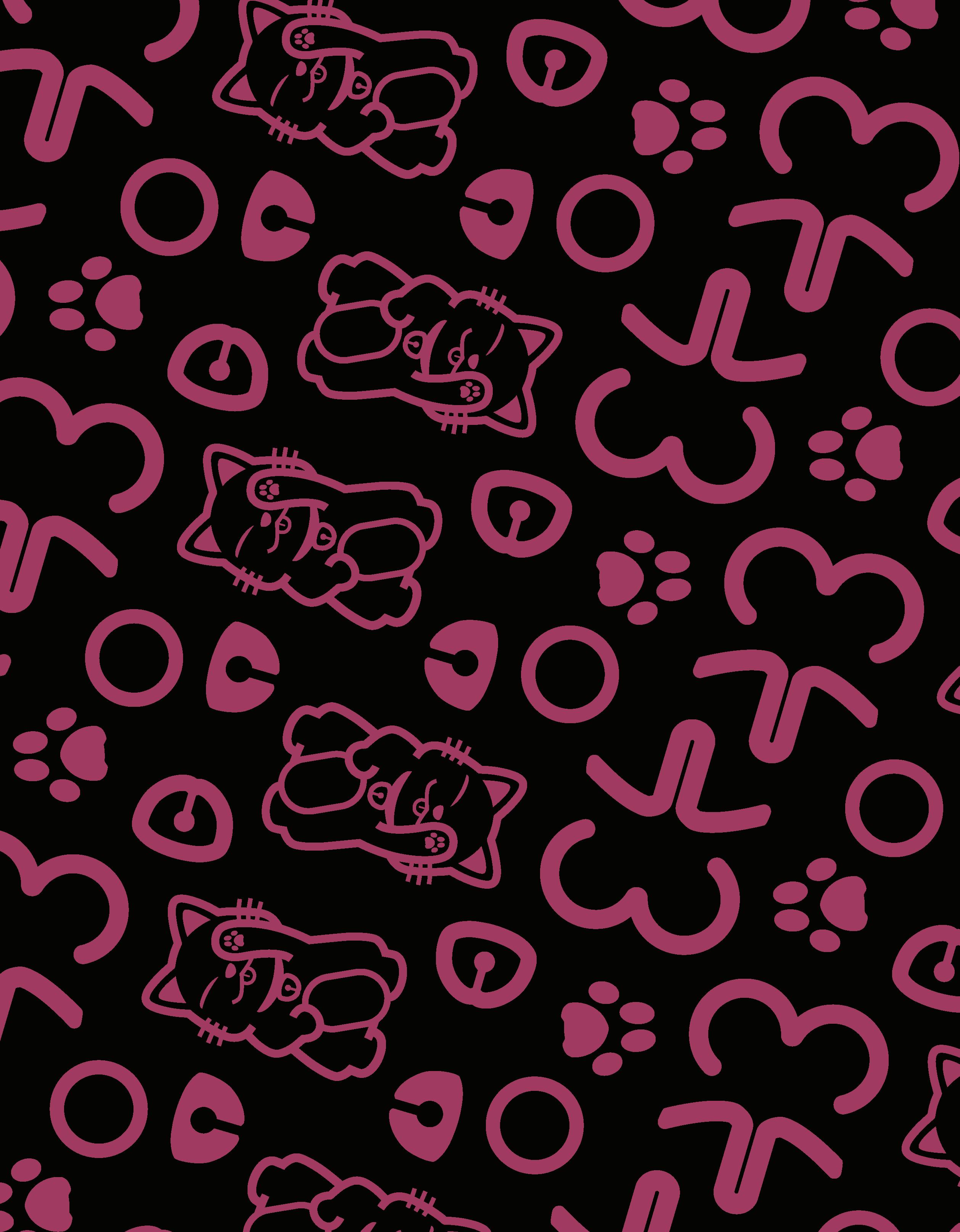
I was in awe of color, lines, shadows and the entire creation process. I loved it as a kid and I still love it today. Even now as I remember that lingering smell of permanent black markers and spray paint I feel inspired to create.
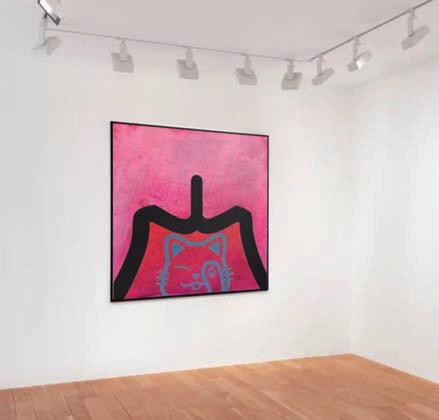
It really wasn’t until high school that people started to recognize me as an “Artist”I didn’t really think of myself that way. The more I painted, the more the paintings transformed me. Art became a passion rather than a hobby and from that passion grew dedication and consistency.
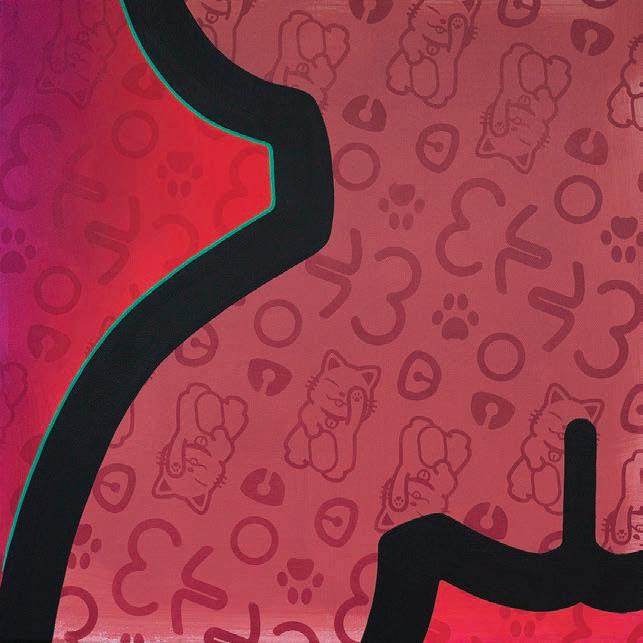
Art is a path with an unknown destination. It will change you. It may scare you. It may even enlighten you. When looked at in a nonlinear way art can unlock deep philosophy and previously undiscovered or unspoken truths. What I currently create could be considered abstract art but what it really is, is a way of looking at and responding to the modern world.
And what is inspiration but a response to life, to death, to pain, to beauty? I think as creatives we are always receiving inspiration - wherever we are, whatever we’re doing. And for me, most of the time that inspiration likes to organize itself and hit me as I lay down to sleep… maybe it’s because that is the time when the heart and mind are still.
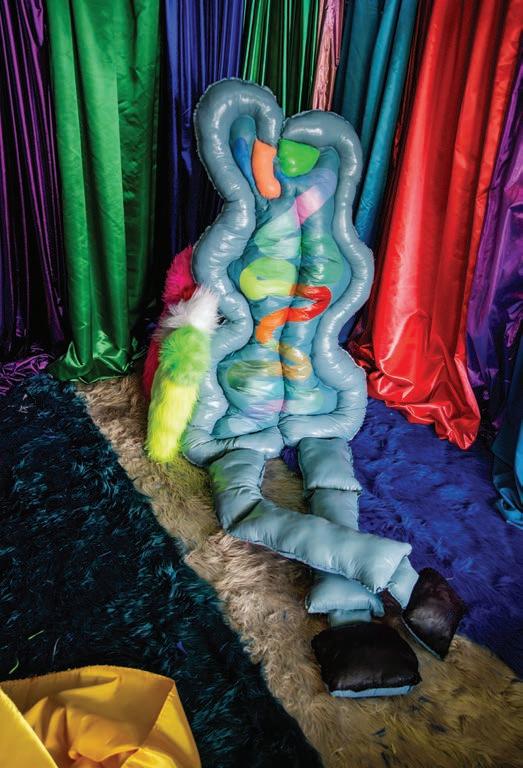
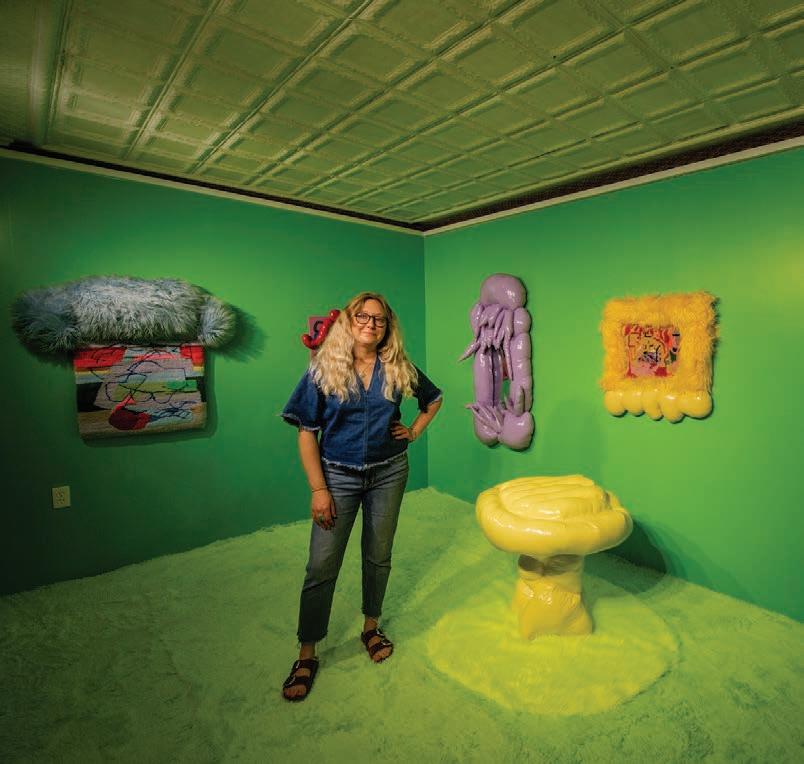
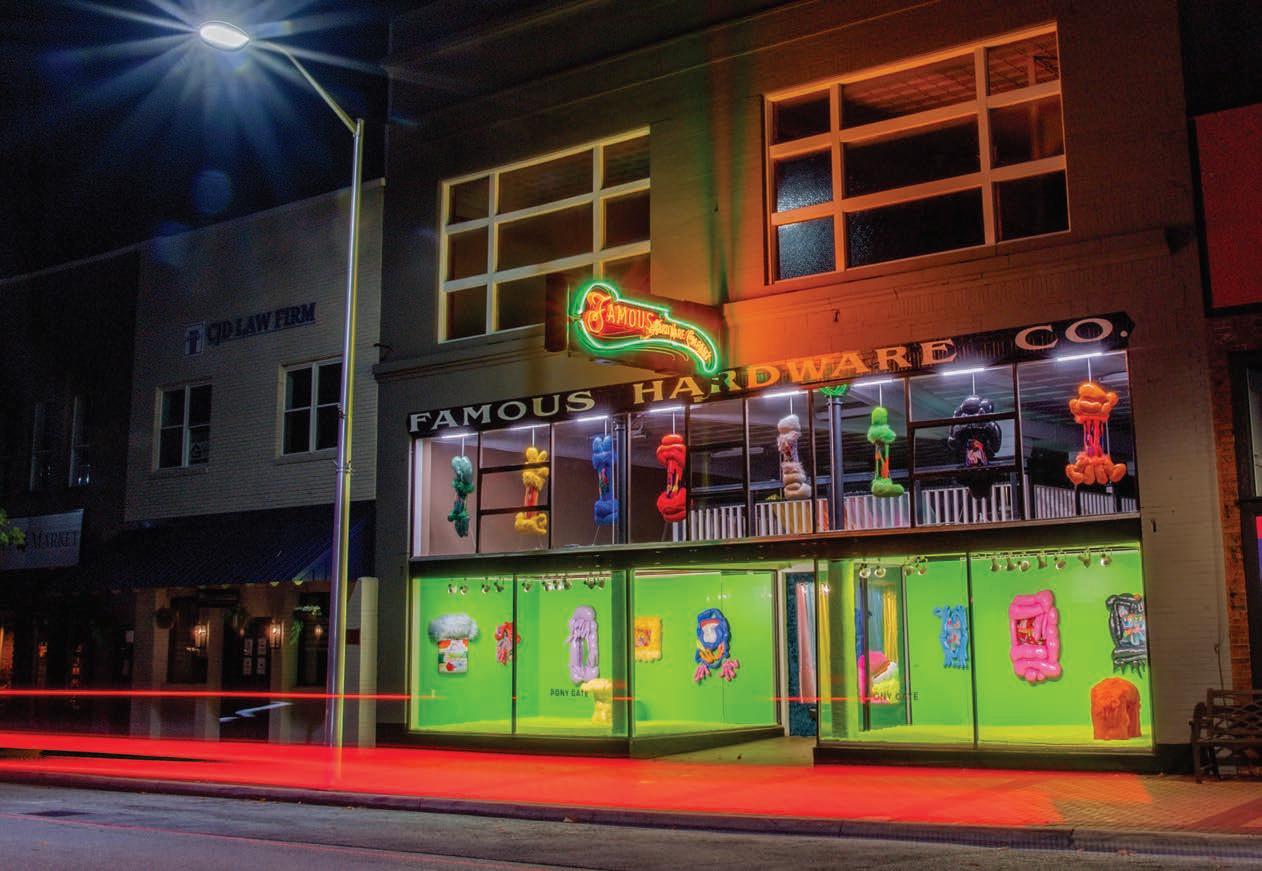 / MEREDITH MASHBURN, KODY FORD
PERRION HURD
/ MEREDITH MASHBURN, KODY FORD
PERRION HURD
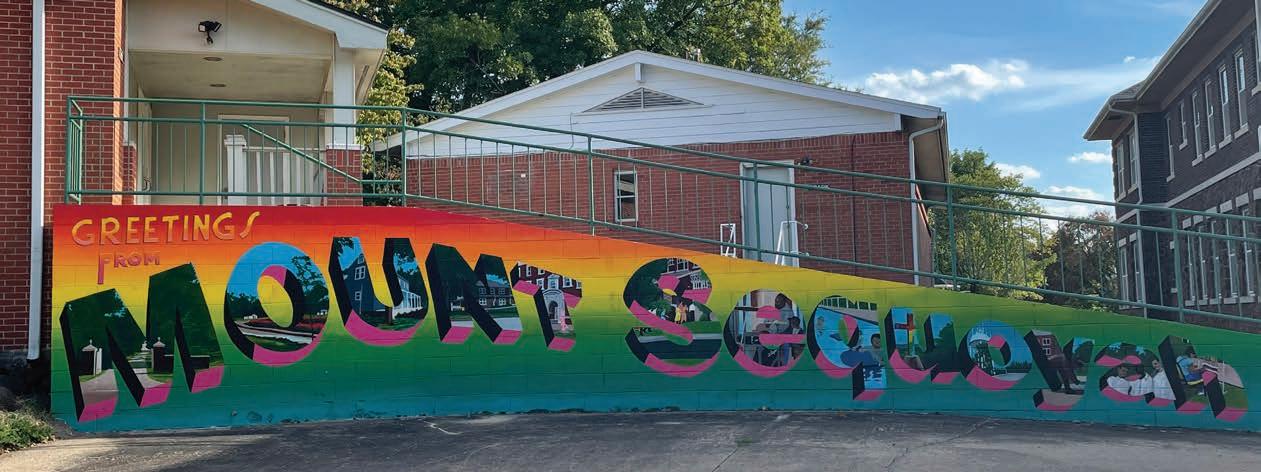
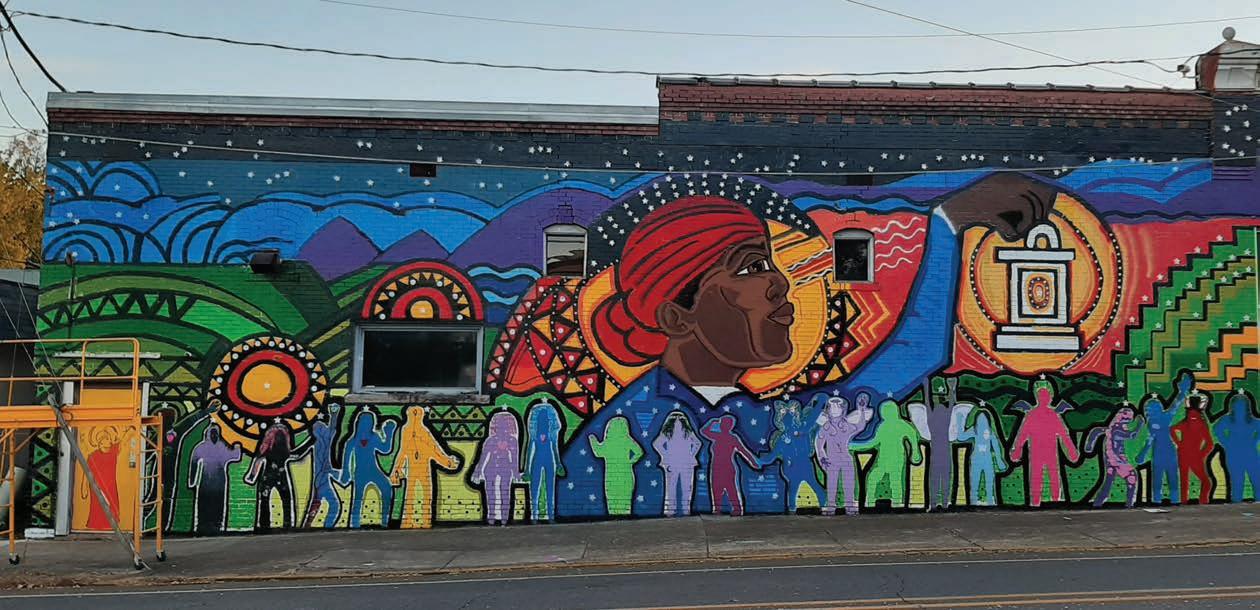
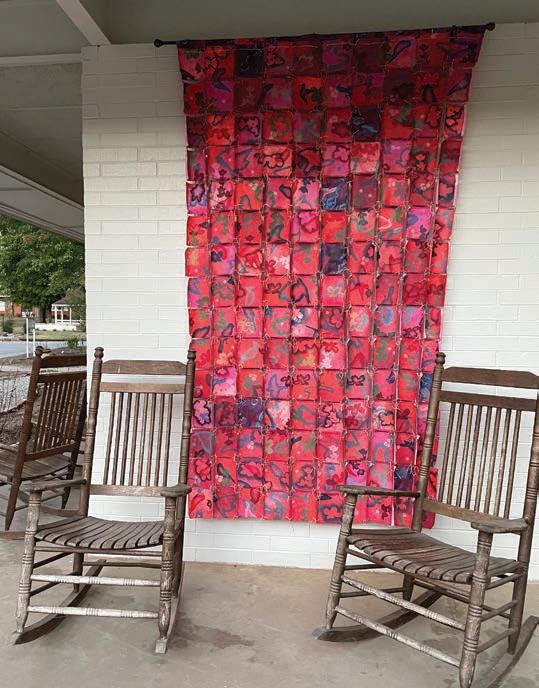
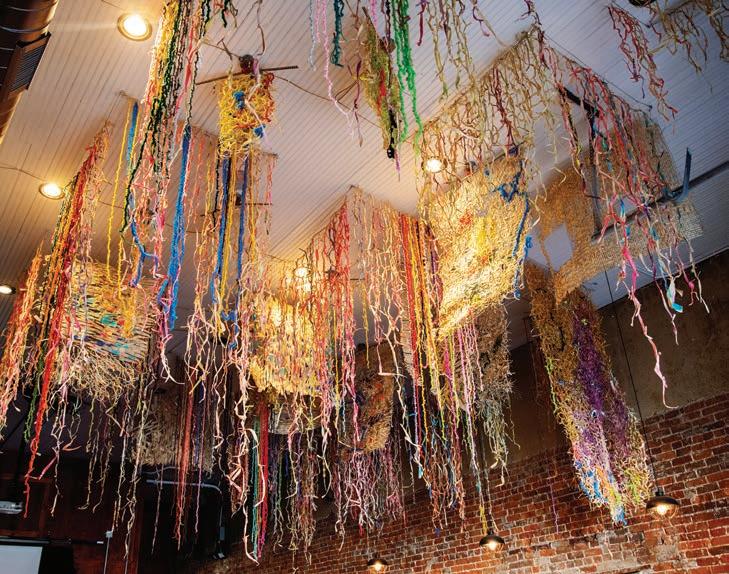
The Arkansas Museum of Fine Arts releases their short film series Delta Voices: Artists of the Mid-South featuring artists from Arkansas, Louisiana and Missouri. WORDS / KODY FORD
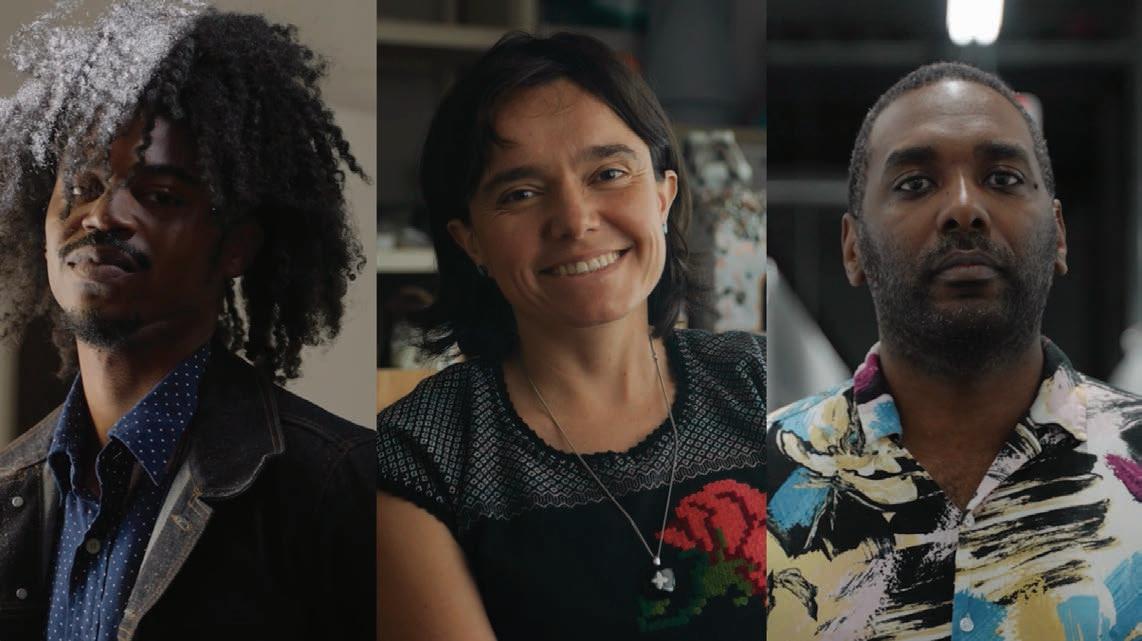
For over 60 years, the Delta Exhibition at Arkan sas Museum of Fine Arts (formerly the Arkan sas Arts Center) has served as a touchstone for art in the region. Each year, artists from across Arkansas and surrounding states would submit their work in hopes of making it into “The Del ta.” However, COVID-19 followed by a complete remodel of the museum put the exhibition on a hiatus the last few years. In 2021, the museum launched a video series in partnership with re gional art museums entitled Delta Voices: Artists of the Mid-South so the spirit of the annual jur ied exhibition could live on until it could return in person at the brand new museum in Little Rock.
In the 2022 edition of Delta Voices: Artists of the Mid-South, AMFA highlights the work of Renata Cassiano Alvarez, Vaughn Davis, Jr.—in partner ship with the Contemporary Art Museum St. Lou is—and John Isiah Walton—in partnership with the Ogden Museum of Southern Art. The films are a three-part exploration of the artists’ perspectives on Place–how their region’s history and culture inform their artistic practice, Content–the stories and ideas expressed in their art, and Form–how
those ideas take shape through the artists’ ma terials. Through intimate vignettes of each art ist’s process and connection to their cities, as sumptions about often under-recognized sites on the national art map are thwarted and a deeper understanding of the region’s cultural richness.
Following the 2022 release of Delta Voices: Art ists of the Mid-South, AMFA will host connect ed programming in 2023, and the first Delta Exhibition in its new triennial format in 2024 at the redesigned Arkansas Museum of Fine Arts.
AMFA Executive Director Dr. Victoria Ramirez said, “For over sixty years, the Delta exhibition has had a profound impact on the artistic community in Arkansas and the surrounding states. Through the video series Delta Voices: Artists of the Mid-South, the Arkansas Museum of Fine Arts has been able to broaden the reach of this region’s cultural richness.”
The short films were released on YouTube and can be found on the museum’s website: arkmfa.org.
On Aug. 31 at the CALS Ron Robinson Theater in Little Rock, the Arkansas Cinema Society hosted a
Renata Cassiano Alvarez Vaughn Davis, Jr. John Isiah Waltonscreening of the three films, followed by a Q+A with all three artists and filmmaker Chris Della place, hosted by AMFA Director of Community Engagement Chris Revelle. During the extensive conversation, the creatives reiterated many of their opinions on the influence of Form, Content and Place while also delving deeper into their own creative practices. (Full disclosure: I organized this event with AMFA on behalf of ACS. — Kody)
Thanks to the AMFA staff, The Idle Class had a chance to ask some questions of each artist. We are grateful for the opportunity as they are all impres sive talents and generally enjoyable to be around.
IG: @renatacassiano
Renata Cassiano Alvarez is a Mexican-Italian art ist and interpreter born in Mexico City and cur rently the Visiting Assistant Professor of Art at the University of Arkansas School of Art. Cassia no Alvarez works predominantly in the medium of clay, in a search for developing an intimate collaborative relationship with material and ma terial language. Influenced by archeology and history, she is interested in the power of the object as survival - objects with a sense of per manence and timelessness, and language as transformation; specially how adopting a differ ent language can affect the physicality of the hu man body, and how this translates into material.
What drives me to create is the wish to commu nicate through something other than words. Cre ating allows me to communicate with material and through my hands. It also opens up a whole universe of possibilities and new languages.
I am intrigued by 3D printing and laser cutters, but I haven’t learned enough about them yet to figure out how I can use them in my practice. One day, but I am not in a rush, I am having too much fun already.
A lifelong native of New Orleans, John Isiah Wal ton is a painter primarily working in oil and acryl ics. Walton received an AA degree in 2012 from Delgado College, New Orleans. He has been a member of Second Story Gallery (2012-13) and The Front, New Orleans (2014-2017) and Level Artist Collective (2015-Present). He has lectured about his work to the graduate program at the University of North Carolina, Chapel Hill and his work was donated to the permanent collection of the New Orleans Museum of Art. His work can be found at the Jonathan Ferrera Gallery and the Gryder Gallery, both in New Orleans.
At first it was that my older brother was good at drawing, then in high school some of my class mates were good at drawing. When I got to Delgado Community College, I found out I was naturally gifted at painting. My new urges stem from knowing I have the opportunity to say what I want in any style I feel comfortable and from learning how to create some of my own per sonal visual language for any surface I work on.
St. Louis resident Vaughn Davis, Jr. characterizes his artworks as forms of circumstance, being each object is a documentation of its making, an em bodiment of time, space and emotion created by the artist himself. Vaughn Davis, Jr. received his BFA with Departmental Honors in Sculpture from Webster University in St. Louis. His work has been exhibited at Philip Slein Gallery, St. Louis, MO, Ma lin Gallery, New York, NY, The Luminary St. Louis, MO, Gazebo Gallery, Kent, OH; among others. He has been invited to participate in the Curated Storefront, Akron OH as part of the Front Interna tional: Cleveland Triennial For Contemporary Art. .
I love how artists are creating installations. Al though multimedia experiences have been created, I’ve enjoyed the emphasis on the vi sual sensory experiences I have seen now. I love the installations of Dineo Seshee Bopape.
.
I think my artistic journey is leading me to express myself in a way that allows me to speak to the world through art. To me that is the poetry in my practice that guides my hand through each work.
(Below): AMFA Dir. of Community Engagement Chris Revelle leads a Q+A with filmmaker Chris Del laplace and artists John Isiah Walton, Vaughn Davis, Jr. and Renata Cassiano Alvarez following a screening of Delta Voices (Photo by Kody Ford)
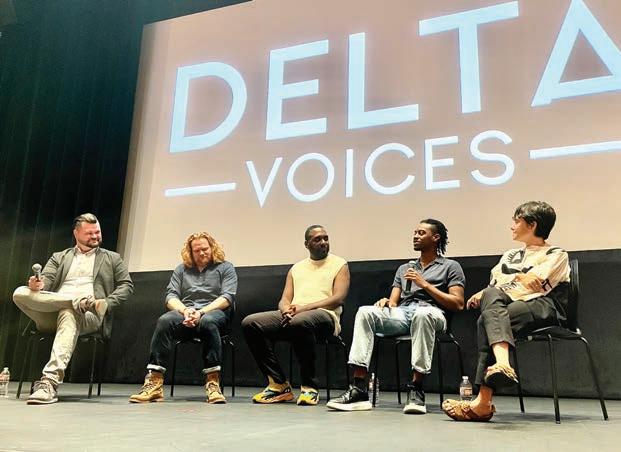
One of the most polarizing movements in art recently, NFTs have been embraced by some and condemned by others. But what exactly are they, and where could they go next?

Few art movements have been more po larizing than the rise of Non-fungible To kens (NFTs). The much maligned and much “memed” digital good has been criticized as a waste of money for something you can “right click and save” and praised by others as a sav ior for digital artists and creators. But for most people, the question remains–-WTF is an NFT?
According to Investopedia, NFTs “are cryp tographic assets on a blockchain with unique identification codes and metadata that distin guish them from each other.” They serve as proof of ownership listed publicly on the blockchain. It does not always guarantee someone intellectual property rights. NFTs can be sold or traded on a blockchain, much like cryptocurrencies; however, no two NFTs are identical or “fungible” like crypto. If you’re still confused, you’re not alone. There’s a lot to unpack and define in this new digital frontier. So, let’s jump back a bit…
First, we have to define a blockchain. Dictionary. com defines a blockchain as “a system in which a record of transactions made in bitcoin or another cryptocurrency is maintained across several com puters that are linked in a peer-to-peer network.” So basically, the blockchain is a peer-to-peer ledger system maintained by many worldwide computers running the same program to ensure security. (I know, I know…we’ll get to the fun stuff in a minute.) Each block has a cryptograph ic hash of the previous block, a timestamp and transaction data. Blockchains are publicly view able and immutable online ledgers. While this is over-simplistic, think of it like a shared Google
spreadsheet that is automatically updated. You have viewer, not editor, capabilities, so you can hop on and watch if your life is that uneventful.
So, all of this tech stuff led to a new asset class. You’ve probably heard of Bitcoin (BTC)–perhaps you blame it and Joe Rogan for the rise of the An thropocene. If not, jump on ahead. If so, here’s a quick primer so you can at least explain why you hate BTC so much. Bitcoin launched in 2008 as a reaction to the global financial crisis. It was de signed to be a decentralized currency, un-reliant on central banks like the Federal Reserve. Bitcoin was quickly embraced by sects of early adopters such as libertarians, drug dealers and libertari an drug dealers. However, over the last decade, it has grown into its own asset class, serving more as a store of value than a daily currency.
Bitcoin is run by a decentralized group of comput ers owned by “miners.” They are scattered around the world. It uses a Proof of Work system to main tain security. To simplify it, all of these computers run algorithms to compete for who gets to create the next block on the blockchain. The winner gets rewarded with BTC. So, essentially they are mining for digital gold. The POS system does use a lot of energy to maintain security, although the exact amount is open to intense debate. Many arguments are made about energy usage–most of which never compare it with other financial institutions or even the day-to-day use of streaming services or social media. But typically, the energy usage argument is comparing BTC to developing countries, often lands ravaged by institutions such as the World Bank and the International Monetary Fund. All of
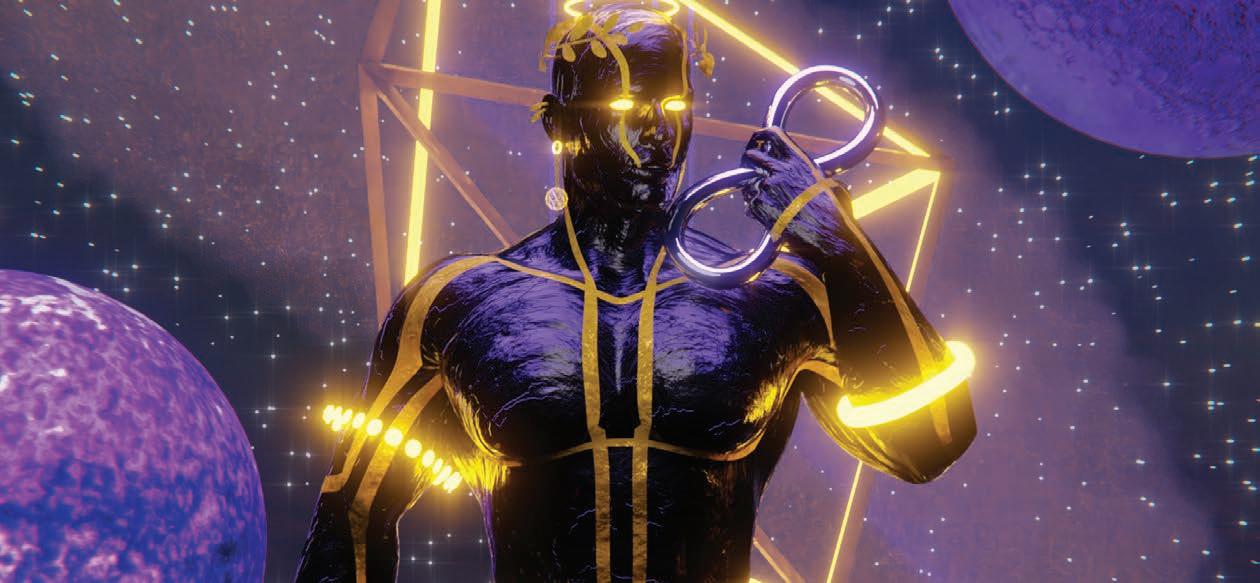 Art by Tiko - IG: @tikodev
Art by Tiko - IG: @tikodev
this is to say Bitcoin and NFTs are two completely dif ferent things. But BTC did play a role in the develop ment of NFTs by popularizing the use of blockchain.
In 2013, a young Bitcoin enthusiast and programmer named Vitalik Buterin conceived the idea of Ethere um (ETH) in a white paper. While Bitcoin was primar ily a method of exchange like a currency, Ethereum was conceived as a network to build decentralized applications—a way to go beyond the monetary confines of BTC–and bring real-world assets such as stocks or property onto the blockchain through the use of code called smart contracts which are written into the blocks. Buterin and other programmers de veloped the idea, which launched in 2015. Ethereum was organized as a non-profit entity, which would help grow the ecosystem but not directly control it.

There are certainly downsides to Ethereum. It is a pay-to-play ecosystem run by “gas” fees (a.k.a. gwei) that users pay in ETH every time they utilize it. Much like BTC, the value of ETH is highly volatile. The Ethereum gas fees are based on a surge pricing model like Uber on steroids which does suck, but at least it’s not ad-driven. How often have you said something random like “I’m full as a tick,” and Insta gram gave you ads for Frontline five minutes later?
Ethereum’s success has led to the development of countless similar blockchains, such as Sola na, Cardano and Avalanche. These blockchains and their ecosystems have been dubbed “Web3” by programmers. Web1 was the websites of the ‘90s, like Yahoo and AOL. Web2 was the rise of social media like Facebook and Twitter. Now, Web3 is the latest Internet iteration and provides a more decentralized and democratized approach.
Until Sept. 15, 2022, Ethereum ran as a Proof of Work system like Bitcoin, trading high energy us age for enhanced decentralized security. On that date, it officially switched to a Proof of Stake sys tem. Rather than spending another 600 words on what that means, let’s just say it cut the energy usage of the Ethereum ecosystem by 95 percent.
If you haven’t closed the magazine by this point, congratulations. We aren’t giving prices, but it’s still impressive because this stuff is tedious. Now that you’ve got the background, we can get around to answering the question–WTF is an NFT?!!
Since its inception, Ethereum has led to the rise of blockchain gaming, Defi loans and other use cas es. In 2014, Kevin McCoy and Anil Dash created the first NFT, “Quantum,” which was a video clip by McCoy’s wife, Jennifer. McCoy registered the clip on the Namecoin blockchain. McCoy sold the NFT to Dash during NYC’s Seven on Seven confer ence. McCoy and Dash referred to the new tech nology as “monetized graphics”--the term NFT didn’t catch on until they later became popular in the Ethereum ecosystem. The process of creating an NFT is called “minting.” This puts the data on the blockchain and allows one to hold or sell an NFT.
Over the last few years, NFT projects such as Cryp to Kitties–collectible cat characters–CryptoPunks, and the Bored Ape Yacht Club (BAYC) gained pop ularity among niche au diences in the crypto community. The prices remained relatively low. Some projects were given away, although the sec ondary market would even tually explode for early NFTs.
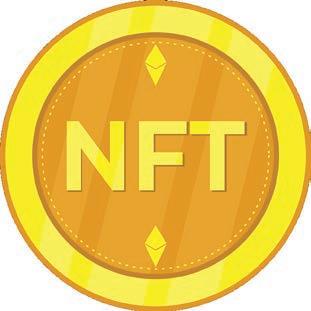
Marketplaces like Open Sea became an eBay for NFTs and companies like ArtBlocks, in Marfa, Texas, became the new tastemakers with gener ative artworks like the aptly named “Squiggles” sold for thousands, if not millions. During the NFT boom of 2021-22, celebrities often purchased these early pieces of NFT artwork. While spend ing an obscene amount on derivative artwork might seem asinine, have you ever seen a Rothko painting? You won’t find them in the bargain bin. So, there are some downsides to all of this. Sure, financial speculation can make you lose your butt, but we won’t go into that here. This is not a place for financial advice. As previously stated, NFTs are smart contracts–just code in a blockchain. The artwork associated with it is typically kept on standard servers and linked to the smart contract. (Decentralized alternatives to corporate cloud storage are currently taking shape.) You can hold and view NFTs in crypto wallets such as MetaMask. However, digital assets are hackable. Every week there are new cases of hacks in the NFT and cryp to space. Holders of BAYC NFTs actually owned the IP rights to their characters…as long as they held that character. Actor and writer Seth Green was developing an animated project around his Bored Apes when he was hacked and had four NFTs stolen, preventing him from continuing with the project until he paid a $260,000 ransom.
Other downsides include displaying the NFTs. Most celebrity NFT enthusiasts didn’t go as far down the rabbit hole as Green, opting to just flex on Twitter by making their six-figure jpeg their profile pic. Howev er, companies are working to create digital frames that link to wallets so the works, either static or dy namic, can be displayed publicly and conveniently.
But what about the upsides to NFTs? For years, digital artists sat back and watched as their work was ignored by the traditional art community. Why purchase something that can only be seen on a computer or TV? You don’t make it far at the art fair or the gallery without at least selling prints. NFTs allowed digital artists to disrupt the biased systems of the traditional art world. Also, smart contracts have enabled artists to receive royal ties every time a work is resold on the secondary market, automatically depositing the native to kens of the blockchain in the artist’s crypto wallet.
NWA artist Tiko (IG: @ tikodev) has embraced the NFT space by selling his own works and col laborating with other art ists. He said, “NFTs are a new avenue for artists to collaborate and reap the benefits of a system made specifically for that purpose. I’m able to make a sale and watch those earnings grow, as well as support other artists with those earnings without the typical obstacles of bank ing or payment apps.”
Even traditional artists like printgurl (IG: @printgurl) and Matthew Castellano (IG: @matthewcastellanoart) have their work for sale on Open Sea. Given the eight-bit vibe of printgurl’s 2D work, it seems like a natural fit for NFTs. She has even animated some pieces for the digital space.
NFTs are also being embraced by Arkansas orga nizations like the Bentonville Film Festival, which launched a membership NFT earlier this year with The Cinematic Center NFT designed by Little Rock artist Sarah Richardson. Holders get access to exclusive BFF events in the future. Writers can
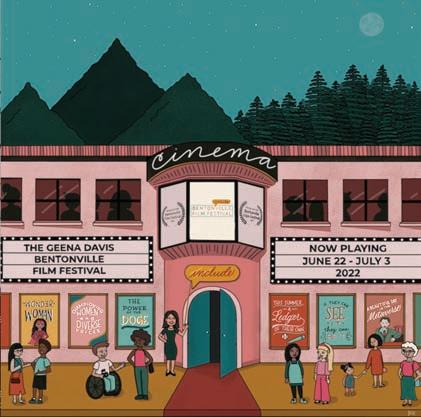
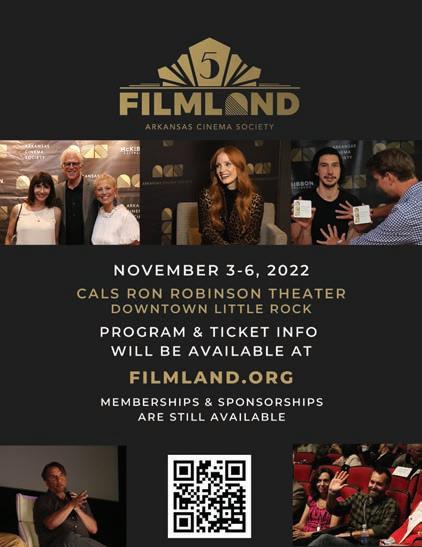
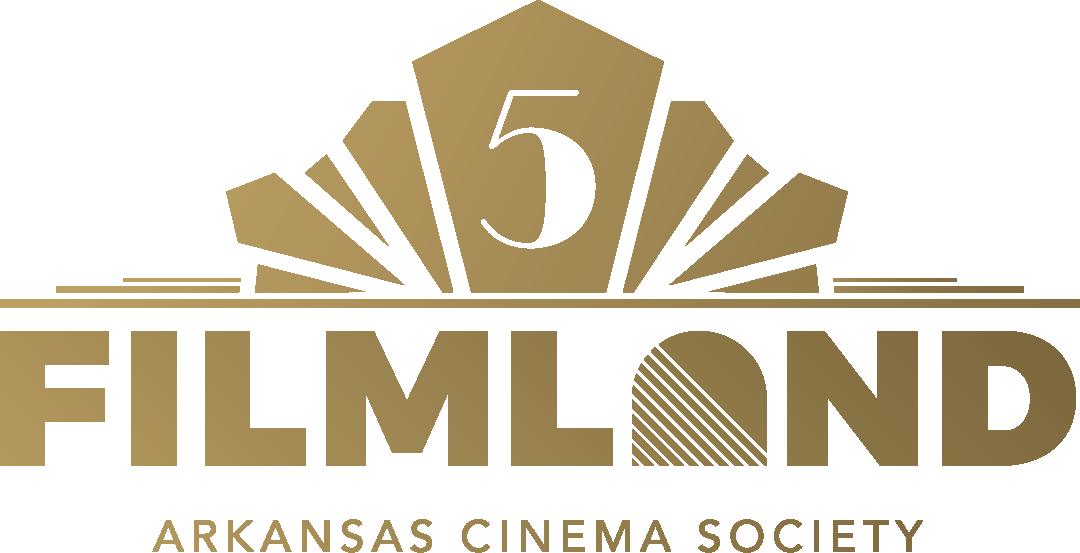
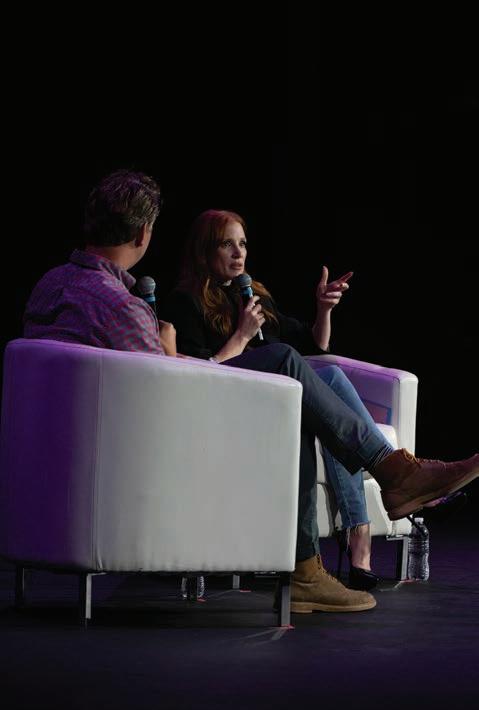
reap the benefits of being an NFT holder as well. Web3 entrepreneur Joe Payne launched The Society of the Hourglass. In this new collab orative storytelling universe people can mint their unique character and then develop a backstory for it on the So ciety’s Discord page, which serves as a writer’s room for character development and storylines. The world-build ing is also paying off in the real world, as the group has hired a writer and illustrator to create a children’s book for the IP. They are even in the development stage of an animated series through a partnership with Jump cut media. The writer’s room has voted on the creatives involved in these endeavors.
We could write another 10,000 words about the thrilling and ridiculous events in the NFT space. Web3 is a new frontier for creatives. It has a lot of potential for good and bad. In future issues, we will dig deeper at Arkansas creatives working in the Web3 space in our new ongoing series–WTF is an NFT? Hopefully, you have a basic un derstanding. If not, there’s always time to learn.

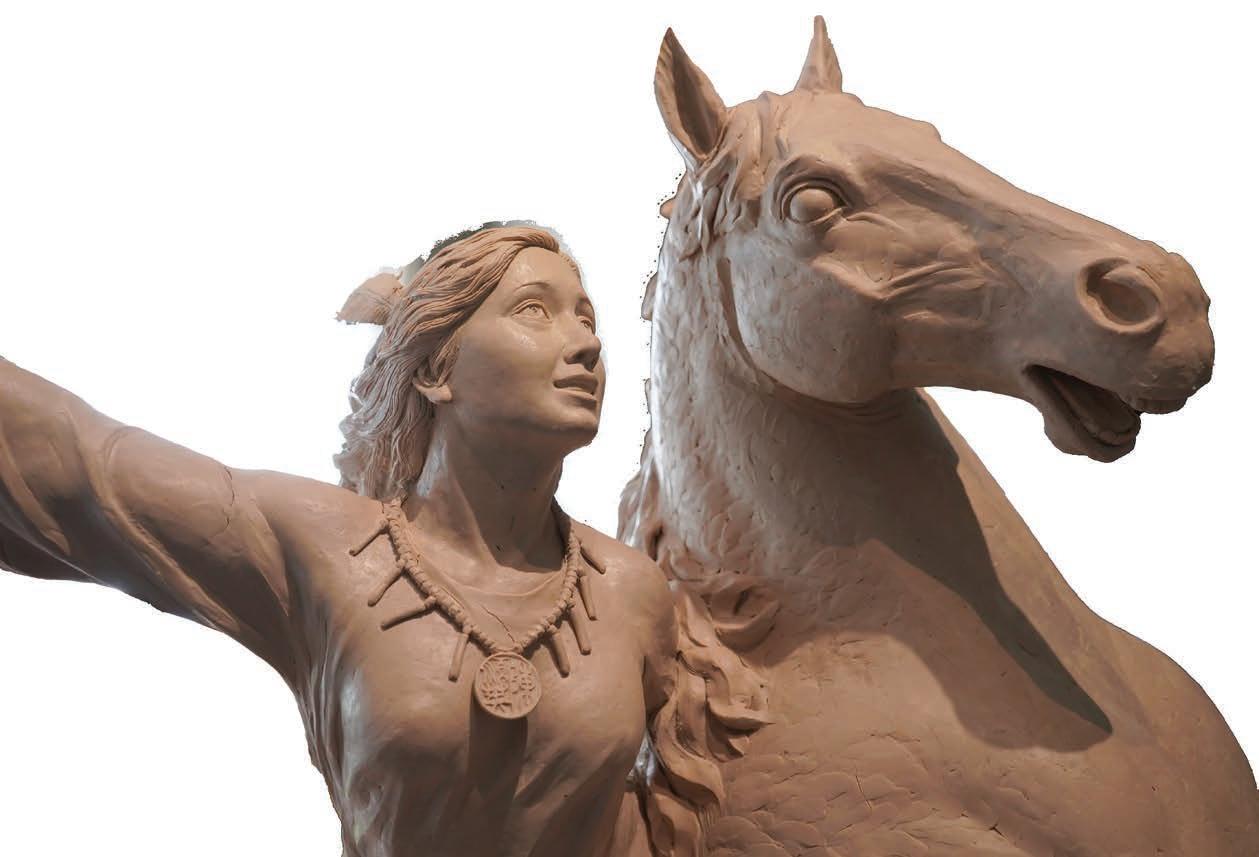
Anything moving, interesting or unique drives me. At the start, it was spirituality, but I always sought inspiration in daily life. For example, if I were to see an old lady working: I see the wrin kles on her face that tell me she is a hard work er, but I also see a flower in her hair that shows me her beauty. This kind of combination would be unique to me. And over the years, the same inspirations are what drive my creative process.
At what point did you know you were an artist?
You’re born with it. In my early life, it started with my brother, and we started to sketch around the park. And now I’m 68 years old and still, the first thing in the morning, I think about art. The day I don’t ac complish anything, I feel like I’ve wasted the day.
My training is as a sculptor, and sculpture takes a long time. Sometimes it takes me a year to finish it. But painting just takes one day or one week. So I use painting as my relaxation. To me, sculpture is a different language than painting. Sculpture is only one thing, so you think about that. It’s very compressed, and it needs a lot of detail. You can put a lot of meaning into the sculpture. To me, it’s more weight and more power than the painting I create. In the painting, you think of more shadow and color. You see the shapes and see the color.
I know several artists that are very good at self-promoting. The way they dress, the way they talk, and of course, their personality. Some peo ple dress in black suits and keep long beards. That’s just not me. I hope somebody can support me like this article will do. Any exposure is good. And when my work is showcased in museums, like it has recently been in the Historical Arkan sas Museum or Mid-America Science Museum. In Chinese culture, you never say “me, me, me.” In Chinese culture, you try to be very low-key.
Bentonville
Visual Artist
10 Years Active
IG: @Brioch17
Brioch17.com
What first drove you to create art? Are you still driven by the same urges?
From a young age, when I found a technique to freely ex press my surroundings utilizing various materials or scales, I was encouraged to continue creat ing. These urges have now mo tivated me to investigate inno vative, unique and alternative approaches that more effec tively communicate my ideas.
At what point did you know you were an artist?
When I agreed, it offered me a special opportunity
to express my viewpoint via my works of art.
If you work in multiple mediums, what do you love about each one?
I like to work and explore dif ferent media. What I like about each medium that I have ad opted for my work has been the exploration of each of its processes, the versatili ty, and how each technique can encapsulate what I’m try ing to convey in my work.
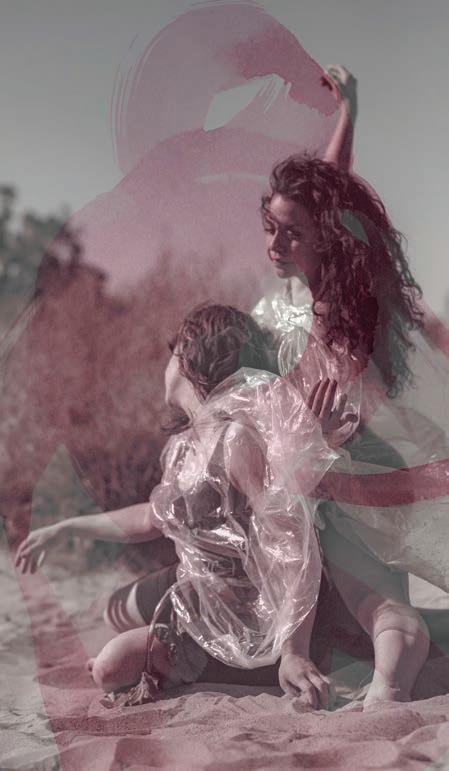
I believe it is the outcome of the 2020 pandemic’s self-ex ploration, which gave emerg ing artists the chance to hone their skills and encouraged them to continue explor ing new artistic directions.
Fayetteville
Oil + Acrylic
25 Years Active
What does your creative routine look like? How do you maintain this schedule along with other life priorities?
Most of my portraits come out of conversations around a mutual interest in talking more, so they come to me rather than out of a forced schedule. I did spend 10-plus years of my life painting or drawing every day in order to get to a place of comfort with myself and my abilities to be able to choose when to paint.
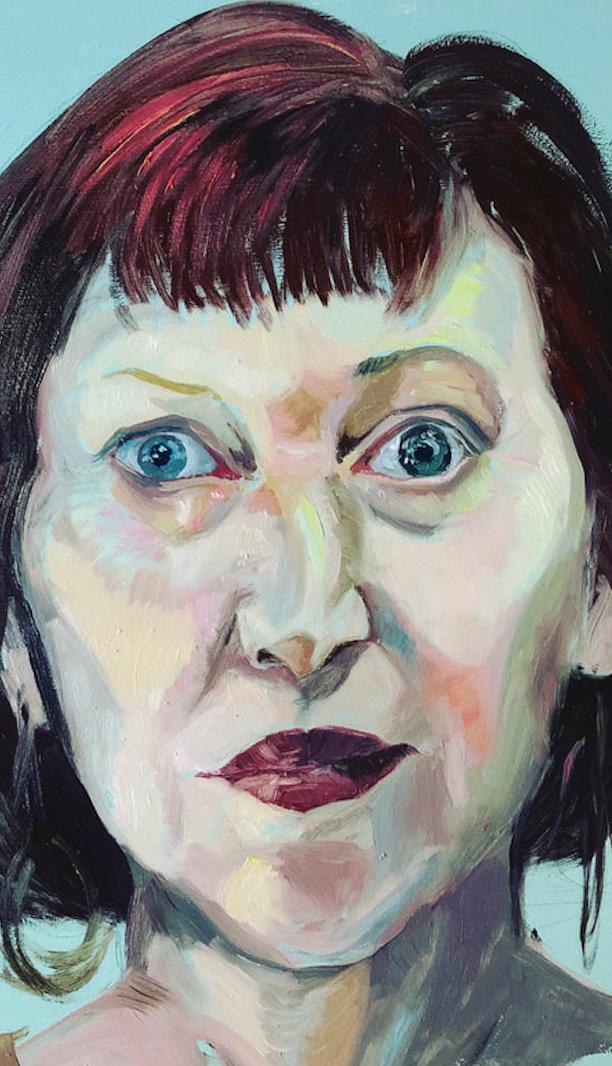
While in DC and New York, I did support myself with mu ral work and decorative work. Now, in Fayetteville, I work as the Director of Creative Spaces at Mount Sequoyah, and my artwork is more of a side job; however, my day job does allow me to make great creative connections.
I am hopeful that I can influ ence the arts ecosystem from this position and help the pop ulation of Northwest Arkansas see the value in paying for art. I would love to see a collect ing culture grow here in a way I experienced it in DC and NYC.
Bentonville Installation Art + Projection Mapping 20 Years Active
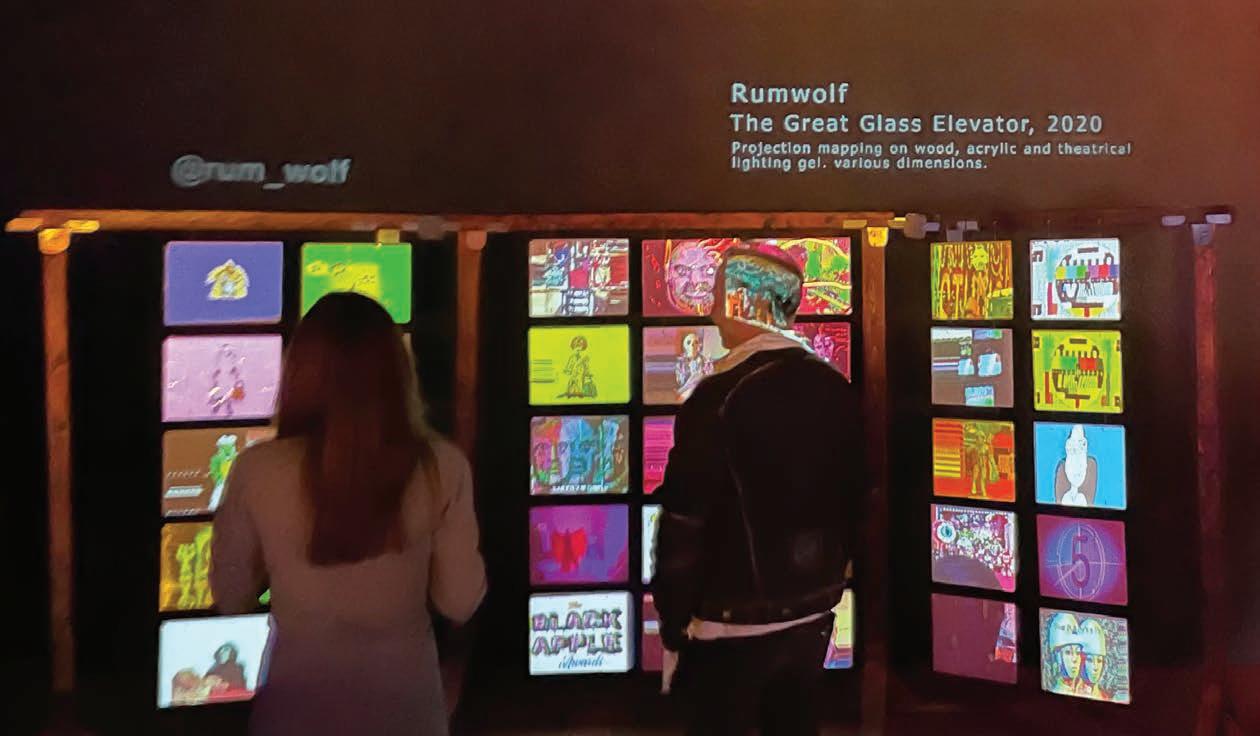
IG: @rum+wolf + @pop_av
At what point did you know you were an artist?
I was afraid to say the word out loud for almost 20 years. You know, because of the fraud thing we all get. But I knew I was an artist forever. It’s funny; I used to think, “I’ll grow out of this in a few years.” But I never did.
If you work in multiple mediums, what do you love about each one?
I love every single medium. It’s true. Every medium is a tool to tell whatever story you’re try ing to tell or whatever point you’re trying to make. It’s why I love art installations. You can use whatever you want to use. Filmmaking, sculpting, sound design, performance. A lot of
folks know me for working in projection. I love projection and video because the possibilities are limitless. With a projec tor and a digital video image, I can make anything. You can do that. I’m painting too, but I have an undo button. Besides, I paint too. And I project on that as well. There’s no rules.
How do you balance your creative routine with other life priorities?
This is something I’ve thought about a lot. I recommend a book called Daily Rituals by Mason Curry. I have been more fortunate than many artists, es pecially in the last two years, as I have been able to support myself largely through creative endeavors. This means I don’t have a side job, so I can de velop routines that are entirely focused on the act of creation. I could spend hours and thou sands of words describing my current and always working the ories on the act of creation and the role of rituals, routines and daily do’s and don’t’s. But I won’t do that here. It’s much to talk about, and I’m so long-winded.
To date, this is my greatest and most worthy accomplish ment. This is the question that plagues the restless and cre ative mind. How do I support myself doing what I want to do? How do I turn my thoughts, feelings, desires, imaginations, fears, etcetera … into money?
Fellow artists, I have been to the other side, and I know what it looks like to live what David Lynch calls the Art Life. How you make it happen is unique to the individual artist. The details of exactly how I did it probably isn’t that useful to someone else.
I believe there is a secret ingre dient to achieving this magic trick. It’s tenacity and patience. Everybody always quits. The trick is to be the person that keeps making art and putting it out there even when you think no one is paying attention. Eventually, you’ll have a body of work. Then people start tak ing you seriously. Because of all the work you’ve done, I mean.
Fayetteville
Representation:
Ventures
What first drove you to create art? Are you still driven by the same urges?
What drove me? Couldn’t help it. Always trying to visualize produce art. My drive is still there just more focused and refined. The advent of Digi tal media and was a huge sea change. I struggled off and on with the dark room because of the chemicals and the process. I never could maintain the per
severance. Digital photogra phy rekindled my focus and fire.
I always felt I was an art ist. Through music initially and then photography. As a child I had an urge to look at art. I always was enchant ed by the feelings and ide ations that visual art provoked.
What new trends in art interest you?
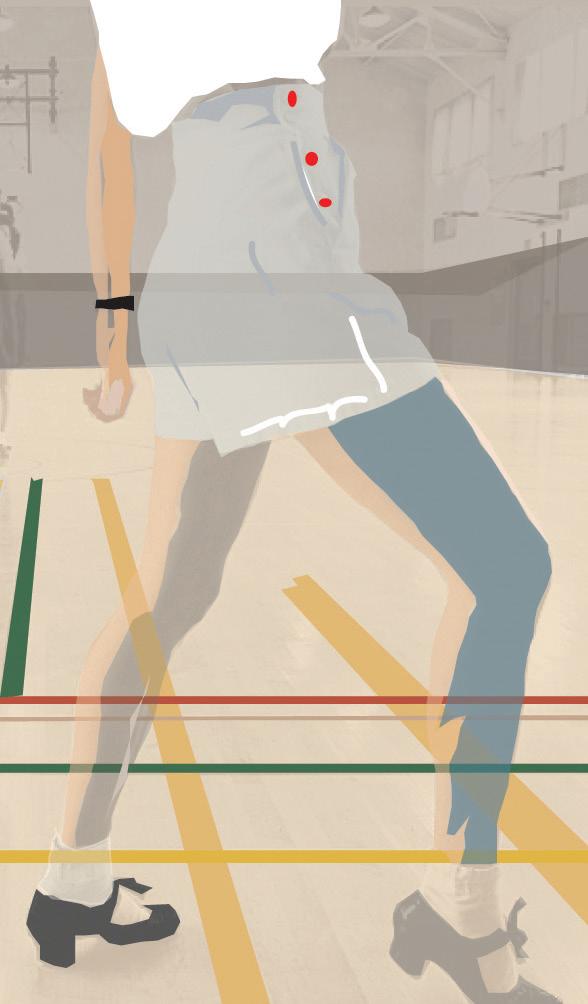
The new trends in photography are the post capture creative experience that digital technol ogy provides. I am beginning to visualize the use of motion, super imposition and media manipulation in the various visu al processing softwares. I think the photographers palette is accelerating with technology and hope to dive in and capi talize on these new techniques.
Fayetteville
Digital Art + Watercolor, Oils + Acrylics
Active since age 7
What first drove you to create art? Are you still driven by the same urges?
My maternal grandmother was a great influence on all things artistic. She was an artist and a practicing psychic medium. She led me to reading, learn ing, questioning and how im portant it is to create your own story and space to thrive. I’m now driven by other art ists’ work, music, books, an tiquing and interesting old photos that spark that nev er-ending story in my head.
If you work in multiple mediums, what do you love about each one?
Digital is such a wonderful medium - I love the variety and how it has become intu itive to use those tools. Dig ital goes with my right brain.
How have you managed to support yourself as an artist?
I ran a graphic design/advertis ing agency in the Downtown Fay etteville Square for 30+ years. It kept my creative juices flowing.
Where do you think your artistic journey is leading you?
Artfulness is such an every day part of my life. I never feel like it’s leading me - it just is.
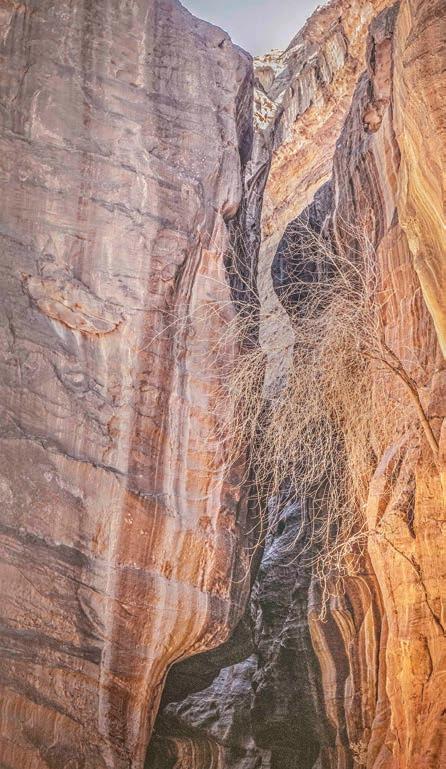
Mixed media
3 Years active angielovesart.com
IG: @angiegomez_art
Representation:
The Gallery on 6th, Fenix Arts Gallery, Artists of Northwest Arkansas
What first drove you to create art? Are you still driven by the same urges?
I began creating at a young age to try to convey my natural cu riosity and unique view of the world. Creating art was an out let for my overactive imagina tion. I am absolutely still driven by the same urge to communi cate my mind’s eye and open a window into wonderment.
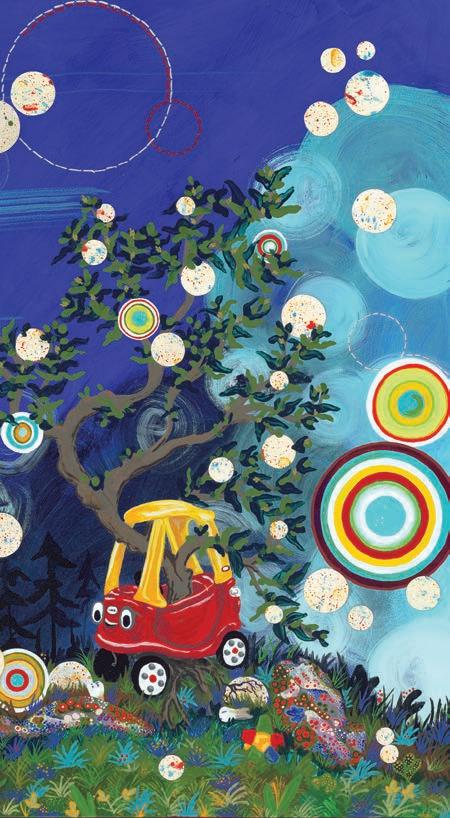
If you work in multiple mediums, what do you love about each one?
I love to paint and sculpt. I am working now with a variety of new materials that allow me to blur the lines between 2D and 3D art. I often incorporate fabrics and thread into my paintings. Currently, I am using molding wire mesh sculptures to make my canvas seem to float and wave in the wind. I love to experiment and explore new mediums. I be gan with watercolors years ago and still have a love for water color painting. I typically create several watercolors each year.
How do you balance your creative routine with other life priorities?
I create almost daily. I do have a family, including two chil dren. I often sit at the table in the evenings with my fami ly and paint while everyone is gathered together. I strive to have a healthy amount of fam ily time and not allow my art to isolate me if I can help it.
Collage + Mixed Media + Cosmetology
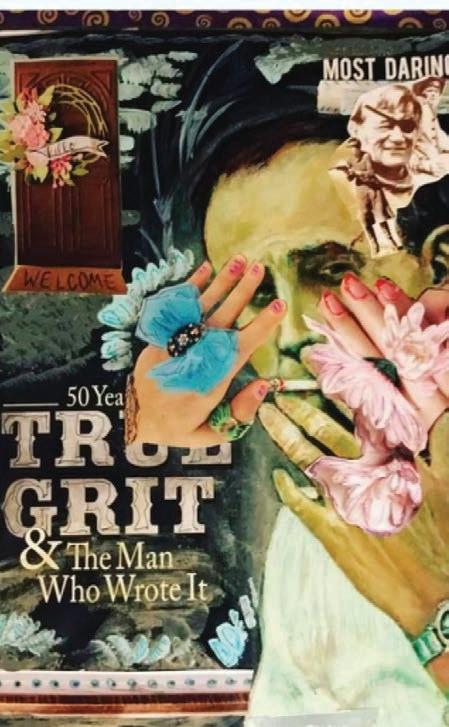
50 years active IG: @artiegraux
What first drove you to create art?
I don’t remember a time when I didn’t love art. I grew up with quilters; the colorful quilt tops were my first memory of mixed colors and shapes. My first hob by was cutting paper dolls from catalogs, along with the furni ture, rugs and accessories. I just loved cutting paper and gluing it down. I’m an Artistic recycler, playing with paints, markers and magazines — with The Idle Class being one of my favor ites. Upcycling ephemera, junk mail fodder that I acquire daily, as well as Collage Glue books
and junky art journals. I’ve used different forms of art, from hair styling for over fifty years to my most recent junk art journals.
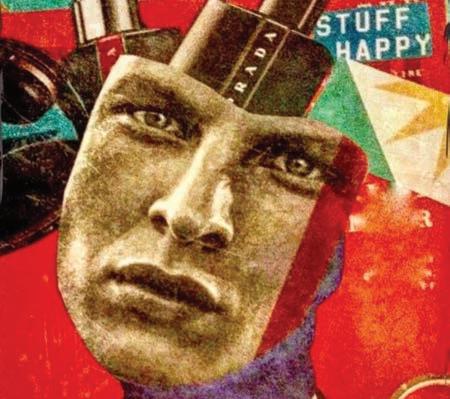
Do you consider yourself an artist?
I consider myself a keeper of pa per turned into colorful memory pages. Be it ads, candy wrappers or clothing tags. I love to find a way to turn trash into treasure.
Fayetteville
Cross-disciplinary Cross Disciplinary with a focus on sculpture, installation, and performance art
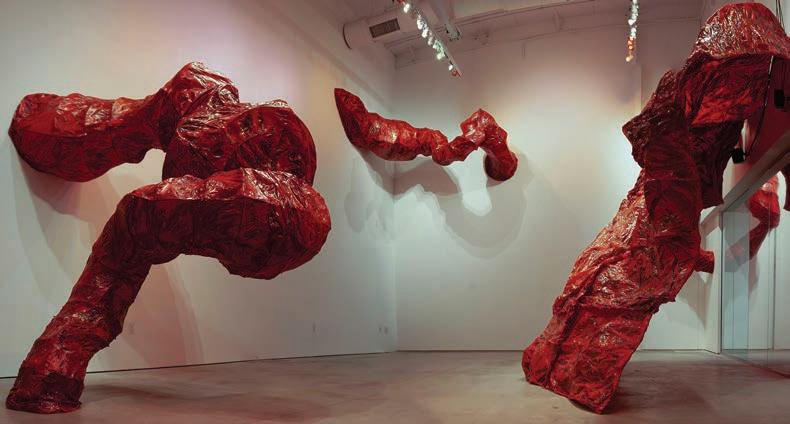
10 years active shelbylynnefleming.com
IG: @shelbylynnefleming
Representation: The Art Collective Gallery
If you work in multiple mediums, what do you love about each one?
I love sculpture as a medium because, as a 3-dimensional object, it becomes unavoidable when you are in the same room as it. Even if you want to ignore it, you must acknowledge it in order to navigate around it. My installation work takes advan tage of this concept by creating immersive environments where the viewer’s body is confronted and included in the installations. Their movements and interac tions with the installation finish it.
Performance art is generally not the first medium that I go to when I am brainstorming a new piece. It usually develops as the piece develops. There is usually a moment when I realize that the piece will not work as a static object, and to fully convey my idea, it needs the body’s di rect influence. This is what ulti mately led me to begin making wearable sculptures, to have a conversation about the body on the body. I was so humbled to be a part of Interform’s Emerge 3 program and to have my first line, “Gut Feeling,” walk the runway earlier this year at the
Bentonville
Mixed media assemblage, acrylic painting and makeup 25 years active IG: @gussyland
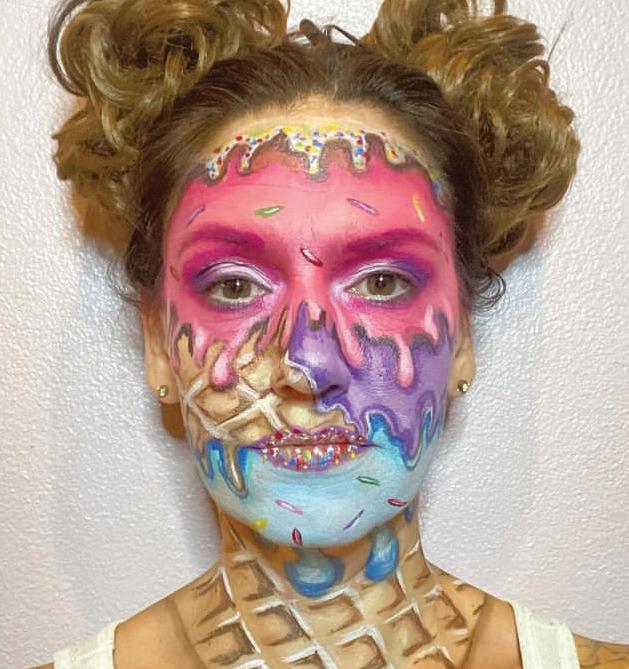
If you work in multiple mediums, what do you love about each one?
Most recently, it’s been as semblage which satisfies my “thrill of the hunt “urges to find unique pieces that inspire me. I might find a single object that, right when I look at it, inspires what the whole piece will look like in my head. I also use re cycled junk. Repurposing trash into something beautiful excites me. I’m also a makeup artist professionally, and there is such
transformational power in that medium! It can add realism to a movie scene, elevate a fashion designer’s pieces or bring con fidence to my clients. In fact, at the start of the pandemic, I turned my brushes on myself and morphed into over a hun dred celebrities. I love painting, but it is the most challenging for me. I think I like it for that rea son. Murals are my favorite; they completely transform a space. I’ve also recently painted some children’s book illustrations. That was new for me and took a little trial and error. It was so worth It! I’m so happy with the results.
How do you balance your creative routine with other life priorities?
Finding time when I can. Gen erally, it’s after the kids are in bed. I’m a night owl, and my amazing spouse does plenty of early mornings, so I can cre
Momentary. I have continued this wearable sculpture momen tum by exhibiting and partner ing with other organizations for shows and photoshoots. For a show at Brightwater, I created a cooking apron that focused on the digestive tract as an overlooked tool in the kitchen. I have also recently partnered with The Transition Closet for a photo shoot with LGBTQ+ models. The shoot was inspired by Lisa Stuart’s quote, “The overall concept of ‘wearing your inside on the outside’ really speaks to me as a trans person who waited many, many years before letting the inside out.”
ate late into the evening. Some days I call it my art ADHD, where I work for a short peri od, go throw in a load of laun dry, walk the dogs, come back to it, repeat. It sort of works for me because if I get frustrated, I tend to ruin my work. Walk ing away and coming back to it fresh helps me be evaluative.
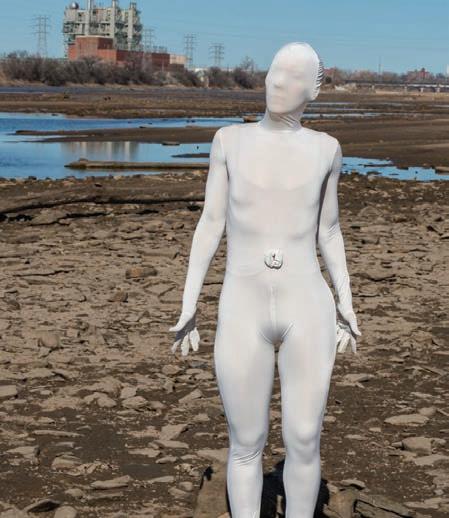
20+ years active
artbabyperformance.com
IG: @artbabyperformance
At what point did you know you were an artist?
I have always known. It’s just that it took me a long time and lots of experience playing in dif ferent art forms to realize this if you know what I mean. The de sire to make, to create, has al ways been at the center of who I am. I have never lacked con fidence in my abilities to take on anything creative, whether it was drawing, painting, danc ing, making up stories, singing, creating costumes, etc. I spent a long, long time, though, feel ing frustrated and deflated, as I wasn’t aware of an outlet or place for the kind of work I want
ed to do. My younger years and even into my 20s were spent primarily enmeshed in the cul tural bubble of evangelical fun damentalism, which tends to foster a particularly narrow view of what makes art. It wasn’t until I really ventured away from this worldview that I began to see the full scope of what art-mak ing can be. Graduate school was particularly exciting for me.
I believe that if you are endeav oring to be completely truthful and authentic in your work, this has a much greater chance of connecting to the universal hu man experience. Like the saying goes, “The most powerful words are not ‘I Love You,’ but ‘Me too.”
At the same time, I understand the necessity of knowing your audience. What I am compelled to make and put out there is not appealing to everyone. That is also a way of staying true to
yourself and your artistic vision. I have always been disappoint ed when I have tried to appeal to more people by watering down or compromising my original motivation to create.
There is a niche out there for everyone, no matter how eso teric or seemingly disconnect ed. The art that I am drawn to is not everyone’s taste.
Graduate school brought me to NWA from Atlanta, and I am planting roots here. NWA offers a lot of opportunities for artists that I could not find in Atlan ta. I apply as much as possible with limited success, though.
There is not a residency or orga nization that caters to artists that require metal fabrication and foundry in the area. I see this as a gap in the market that I can fill.
My one-year goal is to finish building my mobile foundry. My five-year goal is to build influ ence and network to conduct a successful small mobile foundry business, teaching classes and taking on small commissions.
My 10-year goal is build ing a foundry-specific art residency and retreat cen ter for artists and the gener al public to take workshops.
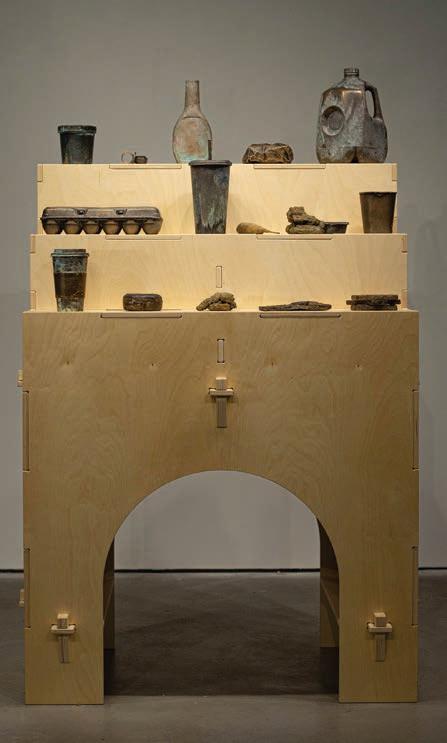
15 years active IG: @crystal_unicorn
At what point did you know you were an artist?
I knew I was an artist when I decided that art and the cre ative sphere would be my tra jectory of a lifestyle. I made a conscious decision to dedicate my studies and life to the pur suit of learning new skillsets so I can give voice to that personal motivation of bringing my artis tic expression into the 3D form as my contribution to society.
Little Rock
Wood sculpture, Painting + Drawing 17 years active sandrasell.com
IG: @sandraleesell
Representation: Justus Fine Art M2 GALLERY
If you work in multiple mediums, what do you love about each one?
Wood sculpture - I find the sub tractive process of carving with the chainsaw the most reward ing and effective. It provides im mediate gratification qualities. I am extremely pleased to have found a process that uses the ac tions, tools, concepts and ideas that give me great pleasure.
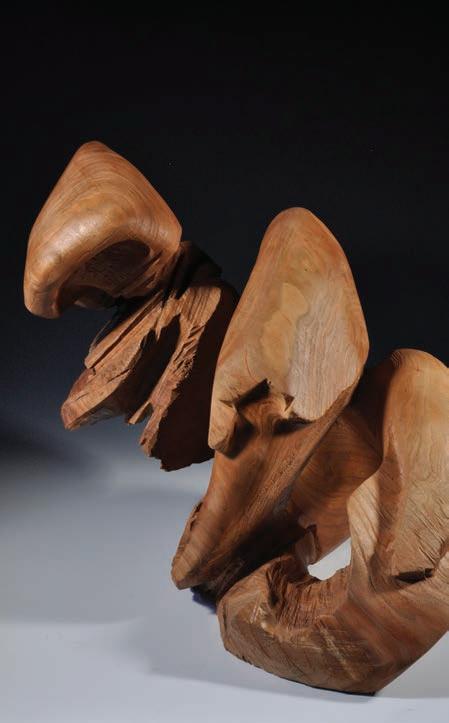
Painting has always provided me with challenges, but I be lieve that when I began carv
ing wood sculptures in 2011, my paintings got better. The connection of body move ment and thought process has developed much more.
Drawing is the base of ev erything. I capture my thoughts as often as I can.
When I was around 12 years old, I wanted to be an artist. As I grew older, I realized it would be hard to make a liv ing. So, I joined the Army and completed the twenty-year commitment for a pension.
How do you feel about the demands of social media and self-promotion to thrive as an artist today?
I find social media quite over whelming, and as a platform of promotion, it only works if you can function inside it. I am not very good at navigating it; many younger people seem to
IG: @goopw0rld
At what point did you know you were an artist?
Well, at first, I couldn’t figure out what was wrong with me. Growing up, I felt different from everyone else around me. I noticed that I thought about things differently, dressed dif ferently, acted differently ... but as it ends up, this was my gift. My gift of creativity, pas sion, and ability to create nov el concepts. I am an artist!
When I started sculpting, it was like a new path emerged into my future. I felt like, for the
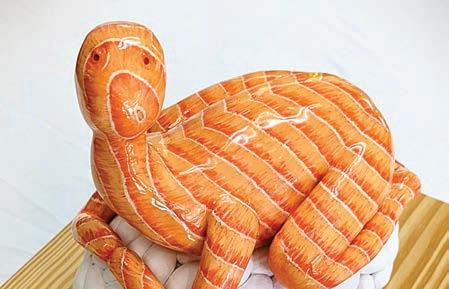
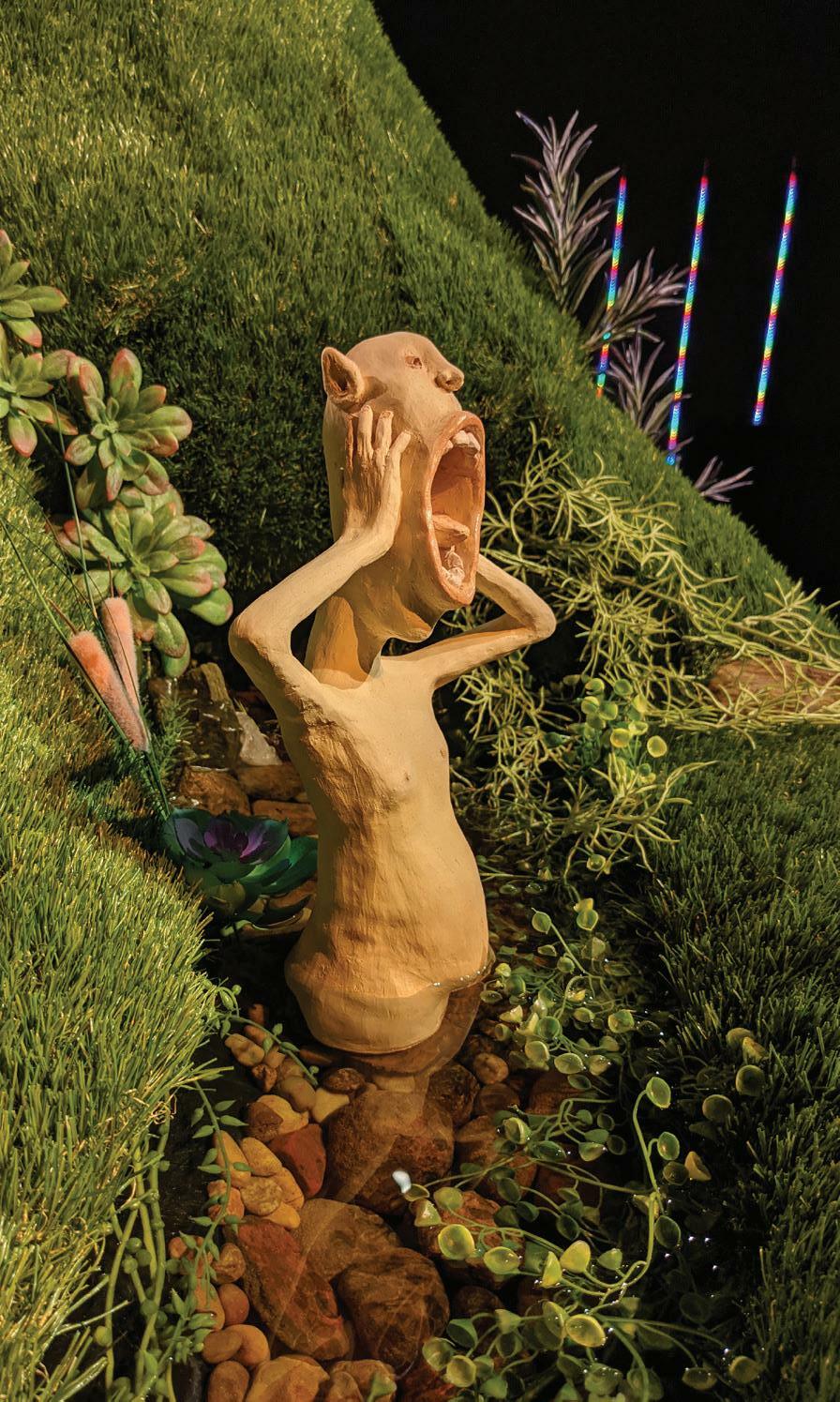
do fine. It would be nice to have a dedicated helper that man aged the social media aspect.
first time, I was able to con nect with everyone around me in a new way, a way that was genuine and special. I wouldn’t give this up for anything.
What new trends in art do you find intriguing?
Recently I’ve been really fasci nated by digital artworks and renderings that people create of their original characters. The effect that they achieve is the most magical mashup of fanta sy and realism I’ve ever seen, and the detail that they go into is spectacular. An example of this is @yugxl on Instagram.
Mixed Media
Design
At what point did you know you were an artist?
This has been more recent for me; I would say my ear ly 40s. I have denied that title my whole life because I nev er felt I fit. Working in the cre ative communities of fashion and design allowed me to grow creatively. Having the support of the arts community in re cent years helped define my skills & find the confidence to share it via different mediums.
Fayetteville Multi-media eandre2.wixsite.com/ eartworld
Representation: Art Ventures NWA
What first drove you to create art and do you still feel a similar urge?
I found myself surrounded by many materials I could make art from (Bamboo, tin, paper, plas tic, etc.) I am still interested in things around me and how they speak to me about what is hap pening in our current climate. I will say that I have developed from just making art with things around me to using them to critique the systems of control.
At what point did you know you were an artist?
I started making art when I was
How do you balance your creative routine with other life priorities?
Maintaining the work schedule is a habit for me. I try to dedi cate 2 days a week to market ing/social media/website listing etc. The other days for creating, unless family duties overrun that, which has happened often these past couple of months.
How do you feel about the demands of social media and self-promotion to thrive as an artist today?
Overwhelming. I like the Ins tagram platform for network ing, but the work needed to keep up engagement and learn the new algorithms every few months is exhausting. I have met some amazing artists via Instagram, so I stick with that. I have recently joined TikTok and trying to learn more as I go. I have to pick and choose where I put my social media energy.
10 years old, but I decided to make it a career in High School Education and further refined my area of interest at the University.
If you work in multiple mediums, what do you love about each one?
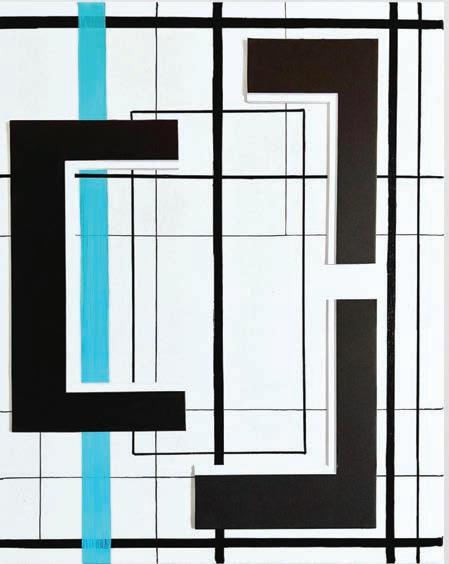
I have different reasons for choosing any medium I work with at any given time. 1. The materiality of the medium as it contributes to the concept. 2. Process: I am interested in how the process of making my piece contributes to my con cept. 3. Construction: the abil ity for the material to respond to the piece’s production.
How do you balance your creative routine with other life priorities?
As a family man, I try to make a piece every two weeks or month, and with this practice, I can des ignate some time aside from my work schedule and family matters to work on my pieces.
Self-promotion is exhausting, so I try to intermingle sharing my work along with photos or vid eos of the creating process. I try to share what I love seeing other artists share. I figure if it’s draw ing me in, it will draw others to me, the ones that matter anyway.
How would you define 2022 in art?
2022 in art means remapping the world through art: deconstructing sytems of oppression.
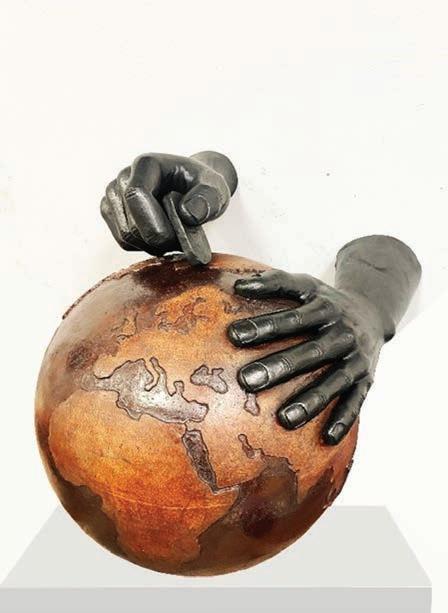
4 years active
Lupitaalbarran.com
IG: @lupe_arra
Etsy: pitachips
What first drove you to create art and do you still feel a similar urge?
Growing up, I initially wanted to become a veterinarian. I was in a tedious medical academy program in high school while also taking art classes on the side. I felt torn between two passions and even considered medical illustration. It wasn’t until the second year of college that I decided to pursue art. Before that, I changed my ma jor four times in one semester
and settled on graphic design.
I always had an innate passion for art and to help out animals.
At what point did you know you were an artist?
I think I knew I was an artist when I was in the first grade. We were required to make a draw ing for class, and I drew a scene where my dentist took out my baby molar in Mexico. I remem ber not feeling any pain and de picted my dentist and I smiling while she was holding the molar. The drawing ended up receiv ing third place in a visual arts contest. I felt like an artist as I expressed that particular vivid memory in that silly drawing.
How have you managed to support yourself as an artist?
I’ve managed to support my self as an artist by just putting my work out there and trying out new things! I was hesitant to start freelancing and an Etsy
shop at first because they felt like intimidating tasks. Now, they are things I love. I believe it is important to keep a positive attitude and learn from your tiny failures throughout your process.
Fayetteville
Acrylic on canvas + panel, paper sculpture, watercolor, or mixed media 25 years active
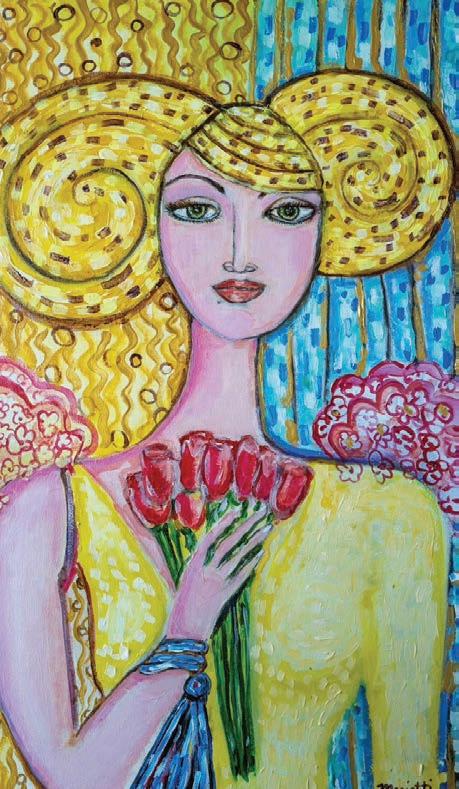
and begin to work, the energy and excitement for it finds me.
What new trends in art do you find intriguing?
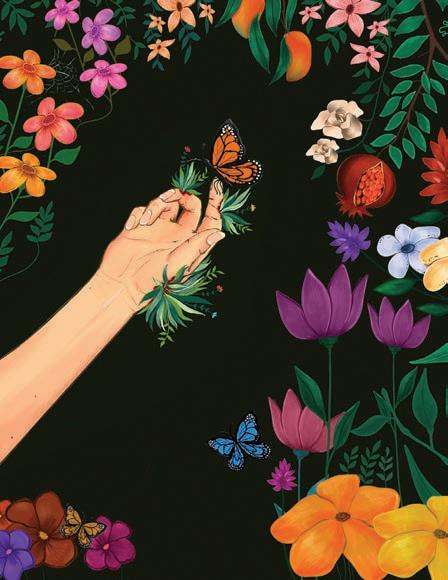
How do you balance your creative routine with other life priorities?
I work as a preschool art teacher at the New School, which frank ly takes a great deal of my focus and energy. I’m very committed to truly introducing the children to the principles of art. I do my best to spend weekends and some evenings working on my personal work, but I sometimes find it hard to find the ener gy after a long day of teach ing 80 pre-K children! I find that once I get into the studio
Kinetic sculpture fascinates me. For instance, the Dutch sculptor Theo Jansen who makes wind-powered “walking” sculptures, endlessly inspires me. I have always had a love for science and engineering running concurrently to my interest in art, and his ability to combine those is frankly mind-blowing.
Where do you think your artistic journey is leading you?
I believe it’s more important to focus on the process than on the end result, and I’m letting the process lead me. The do ing of the work always leads to good results for me, and I’m always focused on the next work… the next ideas. That is where my joy comes from.
Illustration, Painting, Printmaking, Murals
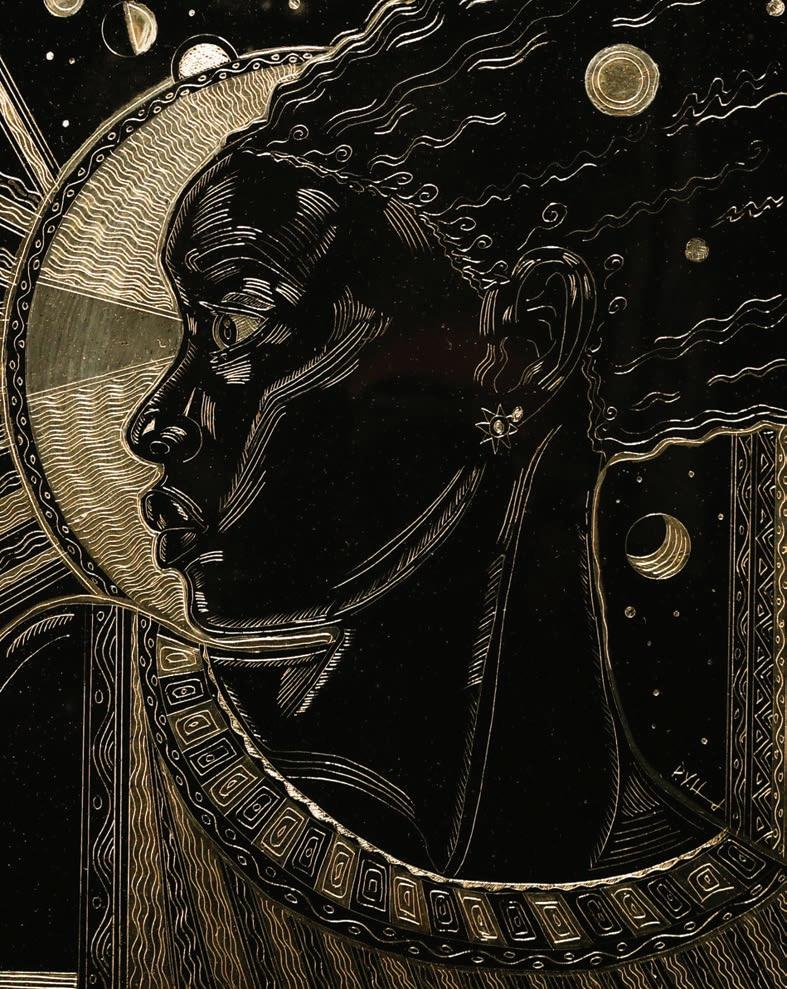
25+ years active
IG: @hurdwiredstudios
Representation: Hearne Fine Art Gallery + The Galleries at Library Square
What first drove you to create art?
I have always been active in the arts, from high school band to being a part of dance groups in my youth. As time went on and I matured, I found that vi sual arts were my real secret passion and talent. The switch from music to visual arts was born of a need to explore and express my inner journey and thoughts about my community, the world, and my place in it.
Are you still driven by the same urges?
Yes, I am still very driven to pur sue a career in the arts, and I regularly produce new work. It is a reflex now and keeps evolving as I practice daily on my skills and learn to use new techniques and mediums.
How do you balance your creative routine with other life priorities?
I have learned to treat being an Artist like the professional skillsbased career that it is. Work ing on my art is a high priority for me. Family and taking care of myself mentally, emotional ly, physically and spiritually are first. It really has become my main job. I have a daily routine with dedicated time to work at home and in my studio. I put in at least 4 to 10 hours a day prac ticing, producing and playing.
How have you managed to support yourself as an artist?
I have learned to create my own
opportunities over the years as well as lookout to find new opportunities that I feel will fit best with my skill set. I spend a lot of time talking and network ing with other creative people and nurturing good, mutually beneficial collaborative rela tionships. Because I work so much, I have a lot of art to show and sell at galleries, museum stores and workshops. Some times I take on commissions.
How do you feel about the demands of social media and self-promotion to thrive as an artist today?
I like that more artists these days are making their own way with social media platforms to build
an audience and get new poten tial clients to see and collect their works without having to solely rely on galleries and museums.
It can be very tricky to man age at times, though, because the algorithms have been pro grammed to promote and re ward the people who are most consistent with the most views.
Deep in my heart and based on my own experience, I feel that no computer program will ever beat word of mouth, showing up and talking to real people face-toface and interacting with them one-on-one. That’s the real stuff!
4 years active Turnersarah.com
IG: @st.bends
At what point did you know you were an artist?
I have always been driven to make — this is true — but I was a bit of a floater in high school. I knew I loved working with clay and using my hands to sculpt, but high school classwork nev er captured my full attention.
My first step into really believ ing I was an artist was really making the decision to pursue a degree in fine arts. When I was finally a Freshman at Al fred University attending my Foundations Art Classes, I can remember so many of my class
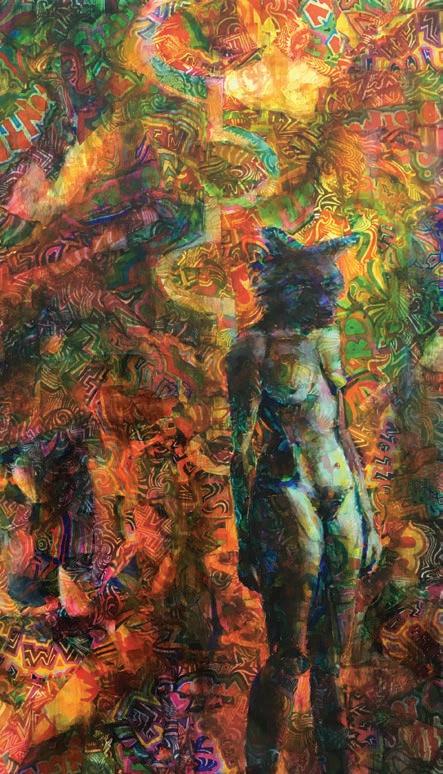
mates complaining about the projects and assignments we were tasked with. They saw the assignments as pointless or a waste of time and ener gy. I, on the other hand, could not have been more excited!
I wanted to spend all of my time in the studio. I cared about the research I was doing and the world I was beginning to dive into. I knew I was willing to de vote all of my time to this kind of work and that I would feel fulfilled pursuing it for a long, long time.
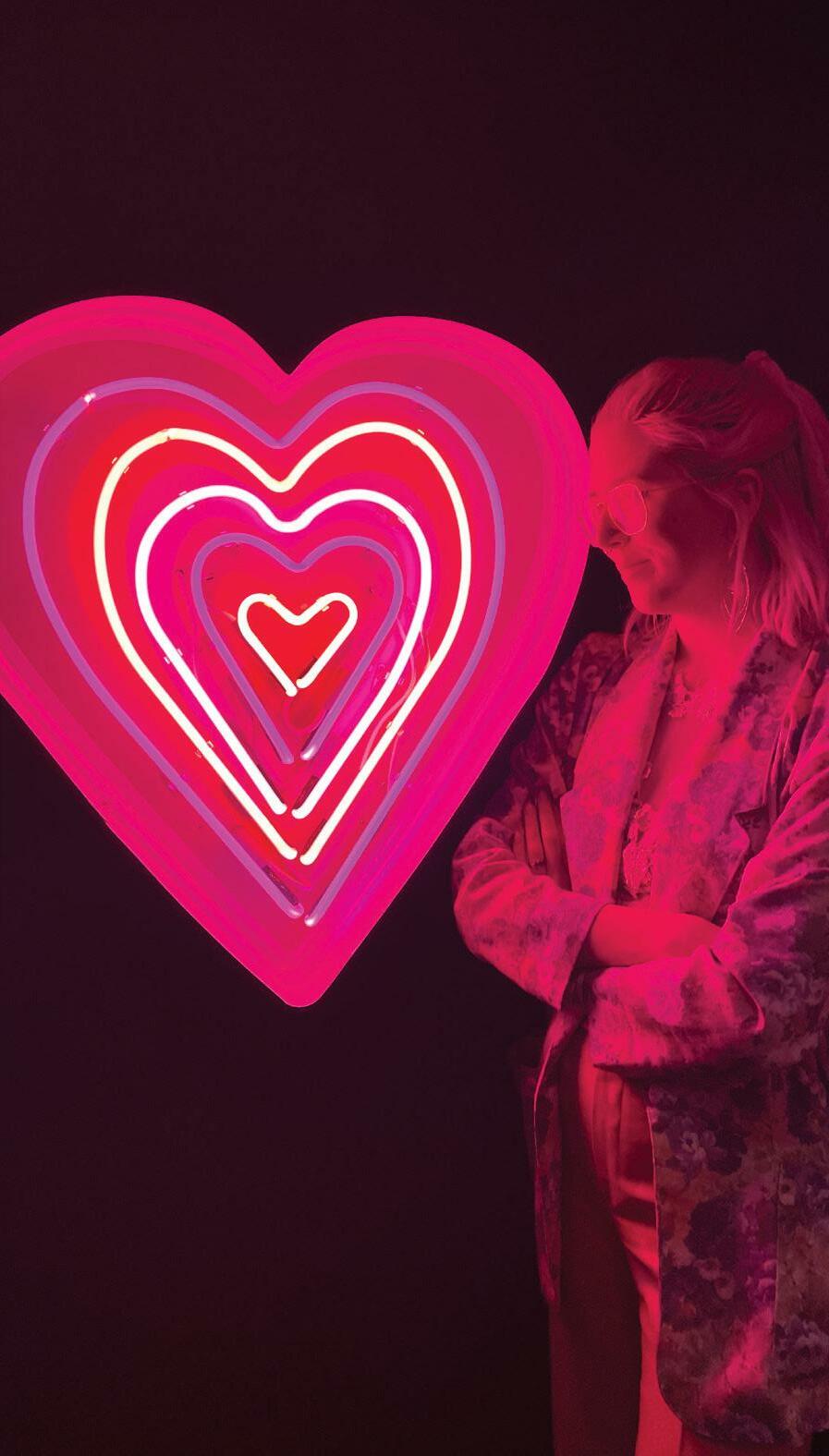
Mostly with my sweet 8-5 job! Having a place to refine skills and simply produce is working wonderfully for me. I do take on commissions as well as other larger projects working in the background.
Little Rock
Mixed Media Collage + Painting
5 years active IG: @lassiter.art
Representation: M2 Gallery
What first drove you to create art? Are you still driven by the same urges?
When I was drawing as a kid, I remember being motivated by my own improvement. It’s so ex citing any time you start to close the gap between your mind’s eye and what you are able to create. The first time I kept something resembling a consistent art prac tice was around age 13, when I began to fill sketchbooks with abstract doodles. It toed the line between therapy and com pulsion, and I loved that feeling of satisfaction when I flipped
through the finished collections. Today it’s pretty similar. The al lure of progress continues to energize me. As soon as you get the hang of one thing, you start to see myriad other ar eas you could improve. That continual challenge keeps me hooked. The act of creation is still exciting and enjoyable, and it’s still gratifying to step back and see bodies of fin ished work that I’m proud of.
Where do you think your artistic journey is leading you?
I see myself spending a few more years developing work independently before either pursuing further education with an MFA or teaching art in Lit tle Rock, maybe somewhere like The Arkansas Museum of Fine Arts or Pulaski Technical School. It feels important to continue to spend time hon ing my own practice before I jump to the next adventure.
If you work in multiple mediums, what do you love about each one?
I do work with multiple me diums; my first love is always going to be the pencil. So graphite and lead are my friends. I love to sketch. It is what I started out doing, and I still find comfort in doing it.
Today, however, I mostly use acrylic and alcohol inks. I love acrylic because, in my opin ion, it is the easiest paint to
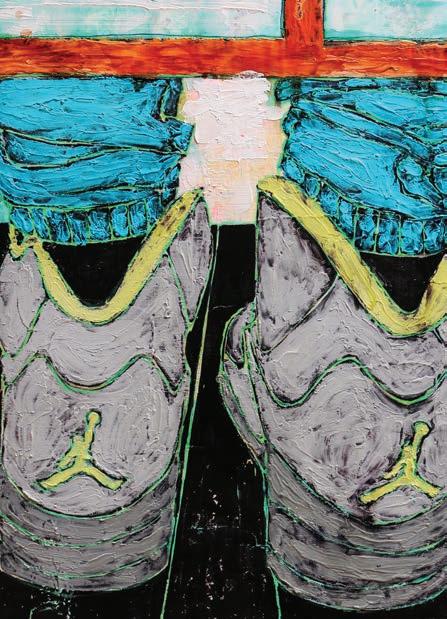
work with for art projects. It dries fast, which is a gift and curse, it’s affordable, and it works well with other mediums.
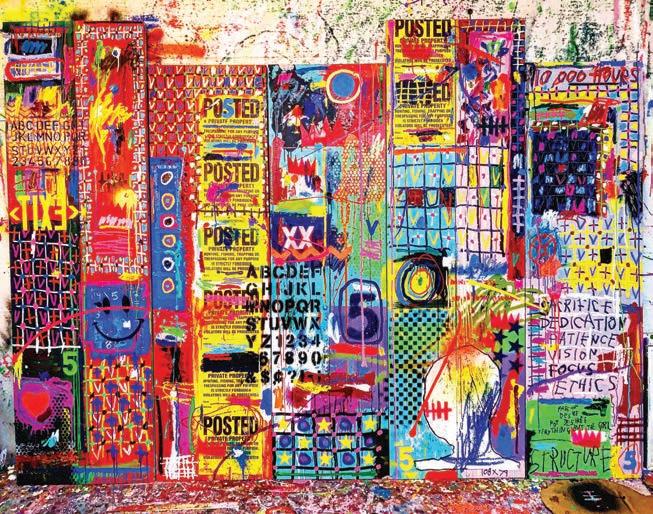
I love alcohol ink because of the vibrancy of the colors. They are so beautiful to me. Inks are a lot harder to work with because they are not made for all surfac es, but once you get the right technique down, it is worth it.
I have another career as well. That helps. I also look for sales on the materials I use. When sales happen, I stock up.
I am recently getting into fes tivals and fairs, and lastly, I make sure that this part of my life is placed in my budget. I take my art seriously and in vest time and money into it.
Where do you think your artistic journey is leading you?
At present, I think it’s leading me
to the next chapter in my life. I think I have made a full circle. I started with art as a main goal in life. I have gone and come back, and I realize now that I love it here and am ready to stay.
At what point did you know you were an artist?
This is a complicated answer. And I’m long-winded in my sto rytelling. Like I said in the pre vious question, I’ve always been into creating art of some kind, ever since I was old enough to hold a crayon. I made comic books in middle school, I wrote really terrible action novels and poetry, and I was in an extra-cur
ricular drafting & design (archi tecture) class for all three years of high school. I wrote screen plays for a few years. I went full force into music/bands at 19 & really thought that’s what my life was gonna be. But I truly
didn’t understand or realize that anyone can just decide to “be an artist” as a lifestyle/career choice. It took me a really long time to come to terms with the definition: “I’m an artist,” even though I always have been.
Centerton
Acrylic + Oil on Canvas + Murals 15 years active roxyshmoxy.com
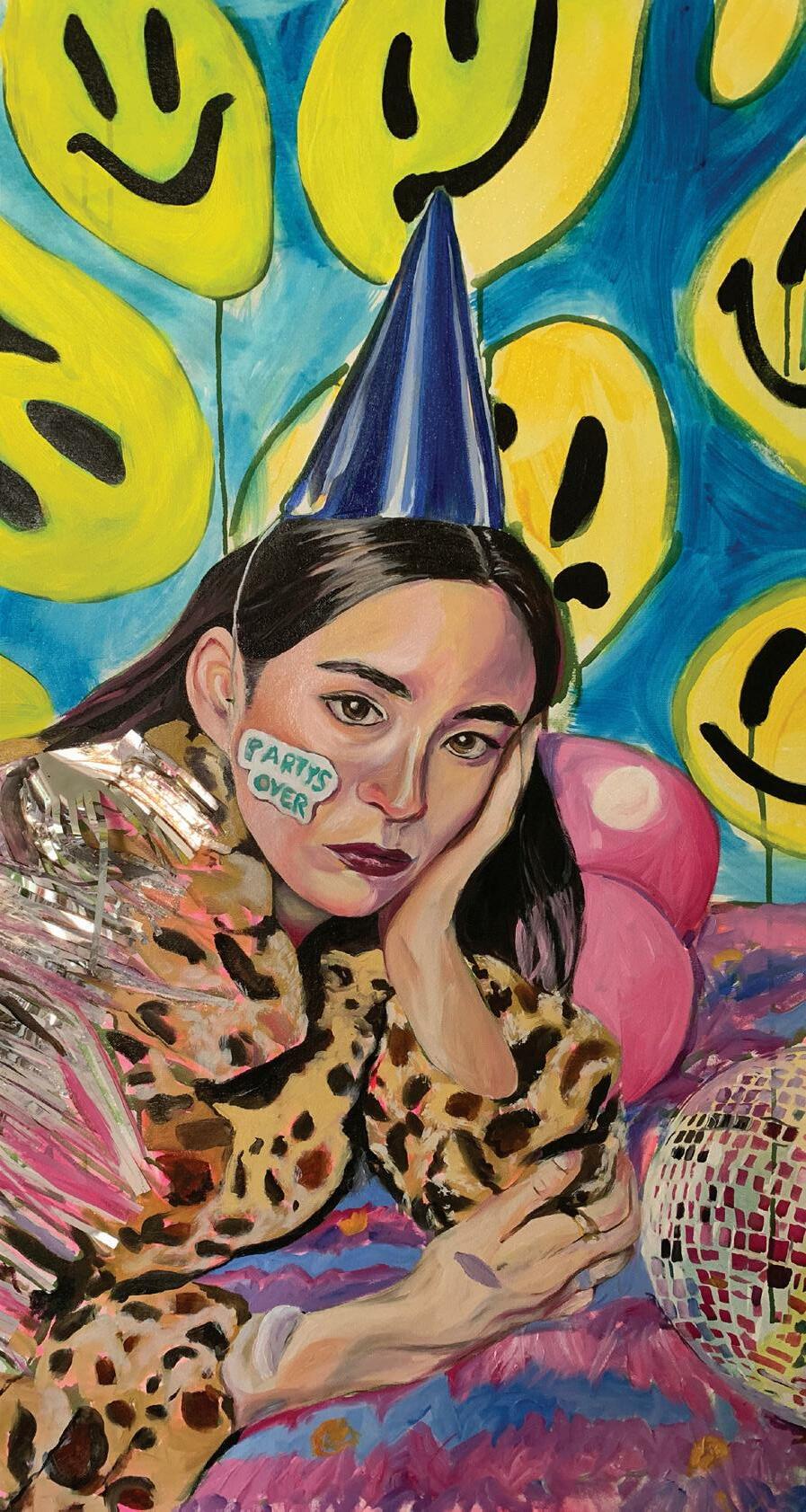
IG: @roxyshmoxy
How do you balance your creative routine with other life priorities?
What first drove you to create art? Are you still driven by the same urge?
I honestly can’t remember any thing specific other than just al ways feeling like I was a creative person who needed to make things. When I was a kid I think I created art as a way to show off to my peers, once I went to art school I started diving into more compelling reasons for making art. For me art is totally an evolutionary process. My life experiences drive my subject matter so even though I gener ally stick to similar themes and styles the work changes as I do.
I’m not very strict with my schedule and it tends to change month to month depending on what big jobs I have lined up.
Summer is mural season and those jobs are generally planned out several months in advance. Once the season is over I tend to move onto com missions. I have days where I just sit on my computer and reply to emails, apply for grants and painting gigs, etc...
Winter is when I am usually the most productive with my per sonal series since I’m inside more. Having a home studio is extremely helpful for me to maintain both an artistic prac tice and keep my life in order.
Gravette Installation Art 12 years active IG: @candohardware + @petpopnwa
What first drove you to create art? Are you still driven by the same urges?
I was first driven to create worlds I wished existed. Some times places that I couldn’t af ford to visit. There is an essence of this that still drives me today. On the other hand, though, as I’ve observed families en joying our installations with their children, I see how great it is to bring people together.
If you work in multiple mediums, what do you love about each one?
I love to work with wood, giv en its simplicity. Structures can be built quickly at a relative ly low cost. I love that differ ent paints/finishes completely change the feeling of a project.
Rubber is great for forming or ganic/fleshy sculptures. Each project is a bit different, but it’s exciting every time we get to work with a new medium
There seems to be a trend of do ing really far-out stuff and not car ing who doesn’t like it. So to me, art in 2022 can be defined as in dividual expression again, rath er than homogeneity. I hope this can continue into 2023 as well.
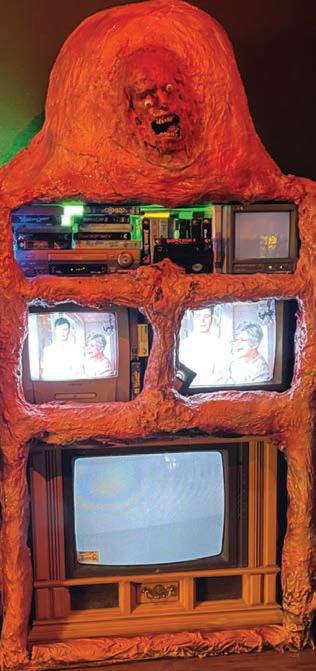
What first drove you to create art? Are you still driven by the same urges?
When I was a kid, my Span ish teacher asked us to make a drawing to illustrate the lec ture. I really enjoyed that mo ment. After, when I was in high school, I had a particular paint ing teacher who helped me to improve my technic very much. I wanted then to study arts, but my parent didn’t believe in a future as an artist, so I studied to be an Engineer. However, I continued painting by myself, taking seminars and workshops to learn more and more. Final
ly, I started exhibiting my work. Since that moment, I have con tinued painting whit some inter ruptions but always looking for the opportunity to be better.
At what point did you know you were an artist?
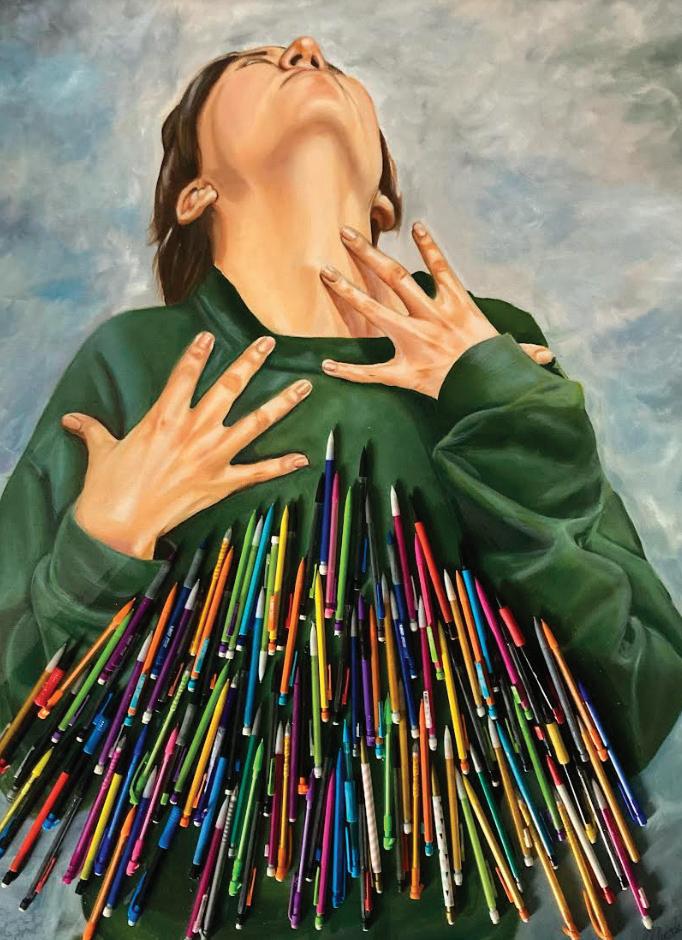
I always have enjoyed paint ing; I simply paint. I never question if I am or not an art ist. But in my particular opin ion, an artist starts when they start creating original art.
If you work in multiple mediums, what do you love about each one?
Well, I love acrylic because it allows you to be fast in your work. Sometimes you have an idea that can’t wait for the dry ing paint, so at that moment, I use acrylic. On the other hand, I love oil because you can play with the color reflection and the juxtaposition to achieve amazing effects on the view.
Where do you think your artistic journey is leading you?
By now, I have the art exhibition Goal 14, Water for Life at Art Ventures, but this exhibition will be traveling through different cities in Arkansas. The next place is Little Rock and then Roseville. We want to finish it in Bentonville, but we are already looking for one more venue. I will start a new exhibition that makes me so excited. I will be in a traveling art exhibition with 37 Mexican artists showing our art to all the Mexican Consul ates in The United States. It will start this December in California. I am open to all opportunities I want to experiment with.
I will have an exhibition with the students of Arkansas Arts Academy (their works) in the school. They will be participating in a project called “Tzompantli,” knowing a little bit about Aztec culture. I created this project to show my culture and history of México. For sure, I will be working on new projects for me and the community.
artist, but I now see that you do.
Be an artist and be the best.”
I was 38 years old. That’s the moment I truly felt like an artist.
I have always “wanted” to be an artist. Even after I started art school, I did not feel like an artist. I truly experienced becoming an artist after I had burned all my bridges to a corporate career (no, I did not quit or do something dramat ic). I decided that after my last layoff, I would not pursue go ing back to a corporate job.
When my dad and mom came to town to check on me and my family, and I had been pursuing my artwork for a year, and my dad saw my resolve, he said to me, “I think this is what you’re meant to be. I never encouraged you to be an artist because I didn’t know anything about being an
While I didn’t paint physically during my corporate years, I nev er stopped painting creatively in my mind. I imagined and imag ined and explored ideas that never saw the light of day until now. I feel like my art career has moved very fast, mainly because of all the creativity I did not get to use during those years. Nowadays, I feel like those shelved ideas are resources that I can pull from any given time.
How have you managed to support yourself as an artist?
Getting busy is the best advice I can give. Participate, sub mit, enroll — any activity that gets your art out of the studio or storage and shares it with the world gives you an op portunity to make a living as an artist. It usually takes more than one source of revenue.
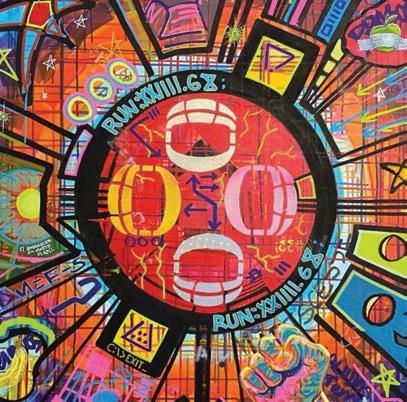
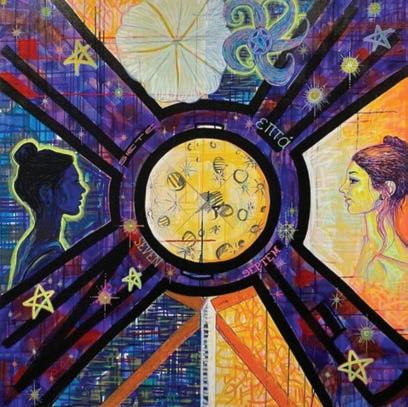
I’m excited about the artists-run fairs that are popping up. This format positions the artists in direct contact with the pub lic – dealers, collectors and designers, giving the artists more access to the art market.
I will be participating in the Superfine Art Fair in L.A. this month (October 2022) and plan to attend others in the future.
I am fortunate to have gallery representation in two galleries, Michael Warren Contemporary in Denver, Colorado and Boswell Mourot Fine Art in Little Rock, as well as an architecture career.
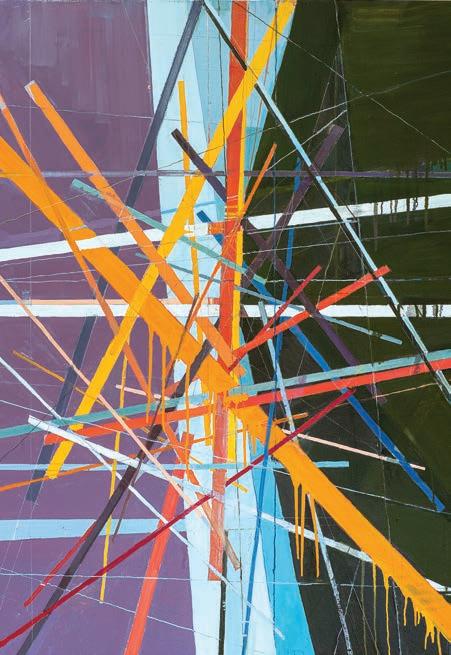
Little Rock
Painting + Sculpture
18 years active
jhortonartist.com
IG: @jwhartist
I have a practice of getting up early in the mornings to work in the studio for 2-3 hours before
start my architecture practice. This allows me time in the stu dio every day, but it is not easy.
Little Rock
Ceramics, Painting
+ Mixed Media
25 years active
YelenaPetroukhina.net
IG: @yelenapeeetroukhina
Representation: Boswell Mourot Fine Art
What first drove you to create art? Are you still driven by the same urges?
Like most people, I was looking for a creative outlet. As a teenager, I took art classes, and making resonated with me on a very personal level. I was a quiet, somewhat introverted kid, so visual language and making artwork became my way to communicate. I now see my work as a physical manifestation of thoughts and ideas. I would say the root of the motivation to make art is essentially the same.
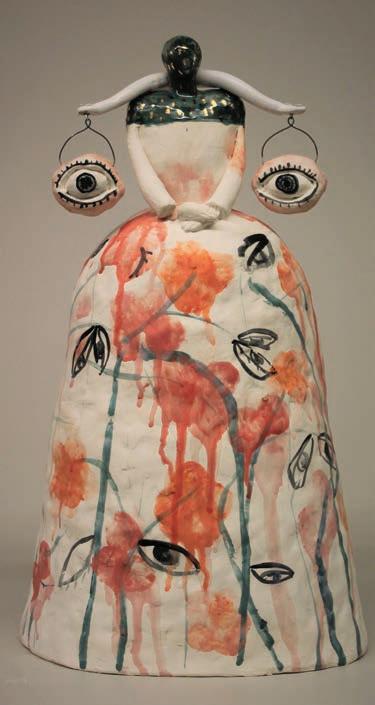
Fayetteville
Mixed Media 25 years active
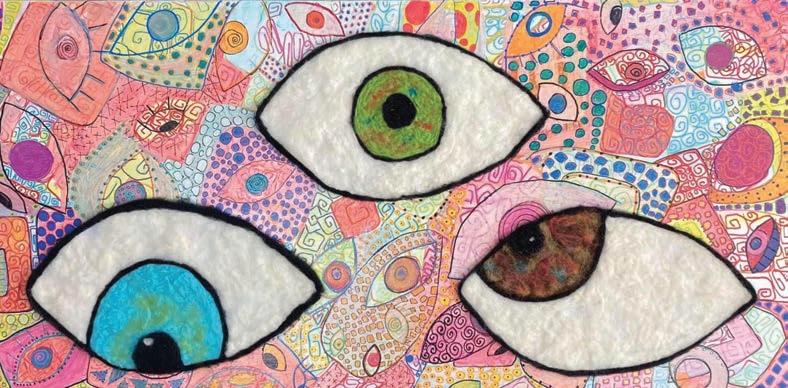
IG: @artistshelleymouber
At what point did you know you were an artist?
That was a hard place for me to get to... I have never had
How do you balance your creative routine with other life priorities?
I have a sketchbook with me to keep up with ideas. It seems
any formal art education, so I had anxieties that I was do ing things ‘wrong’. Years of practice and experimentation, great work, awful work, then finally realizing it wasn’t my work. It was all about my pro cess, my journey of healing.
What new trends in art do you find intriguing?
I am the least tech-savvy per
that this line of thought runs in the background of my mind even when I am not in the studio. I take time to look through the sketches and notes to develop a con cept for a complete piece or a plan to explore a form or surface. Because I teach fulltime, I want to make sure that once I am in the studio, I can focus on making. So, I do my best to keep my thoughts and space organized. I work in the studio in the evenings and on weekends. Summer is always a highly productive season. I can focus larger uninterrupted blocks of my time on making new work.
How have you managed to support yourself as an artist?
Currently, I sell my work at Boswell Mourot Fine Art in Little Rock. I also do commissions and workshops. I did young adult and adult workshops last year at the Arts and Science Center for Southeast Arkansas, and it was a great experience. ASC has beautiful space and great equipment.
son ever. That being said, I love augmented reality art.
Of course, my favorite art ob session is interactive art ex periences. It reminds me, in a way, of Halloween as a child and going to fun houses. The wonderful difference being that you are surrounded by art.
Where do you think your artistic journey is leading you?
I say this often, art saved me. My journey is spontaneous and exciting – I never know what’s next. The only thing I do know, I have to create.
I have to advocate for others through my art. Helping oth ers is a necessity, and the plat form I use to advocate is my art. It’s leading me.... everywhere.
Little Rock
Oil Paint + Ink
7 years active gretakresse.com
IG: @g.kresse.art
At what point did you know you were an artist?
I think it has always been import ant to me to call myself an artist first, regardless of the job I held. It kept me focused on my inten tions with my career and identi ty. The first time I really felt con fident in my work, though, was after I finished a 7 week art pro gram at the Mt. Gretna School of Art after my sophomore year of college. I had entered the program feeling like I had no identity or perspective as a painter, and through making the worst and best work of my life, I discovered some confidence. I think the best advice I can
give to young artists is to make a lot of work without be ing precious. I fought for that trust in myself and my work.
If you work in multiple mediums, what do you love about each one?
Oil paint feels conducive to a longer conversation with my subject. I love that I can make a full painting and come back the next day and scrape the excess paint away, destroying the painting but leaving some thing compelling to work back into. I can be aggressive with the color and layering while still retaining the luminosity and depth only oil paint has.
I like ink for the exact oppo site reason. It is permanent and at its most beautiful when I work quickly and confident ly. At my best, I am able to utilize what makes both of these mediums work for me.
Fayetteville
Oil, Acrylic, Leather, Metal Studs, Cotton Canvas + Guitars 3 years active
What first drove you to create art? Are you still driven by the same urges?
When I was younger, it was bore dom, but now that I’m older, it’s probably still boredom, but with the added need for a break from daily adult responsibilities.
If you work in multiple mediums, what do you love about each one?
My favorite is leather, especial ly leather jackets, because it’s functional art. Wearable art that you can show off anywhere and not leave at home on your wall. Guitars are a close second be cause of the same reason. The
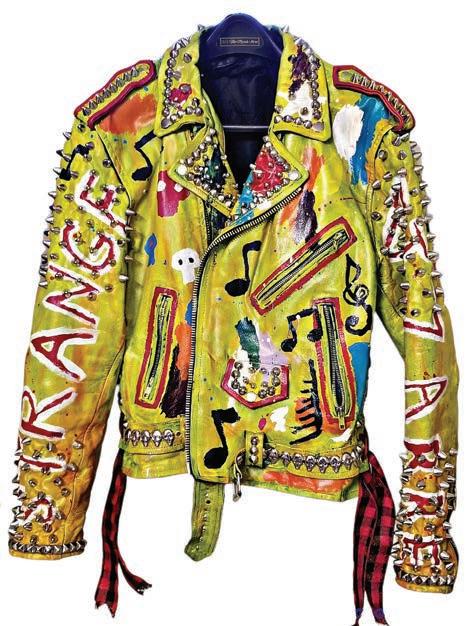
third is oil. The colors are more vibrant and slow to dry, fol lowed by acrylic if I’m too lazy to wash my hands after using oil plus, acrylic splatters better than oil since it’s not as thick.
What new trends in art do you find intriguing?
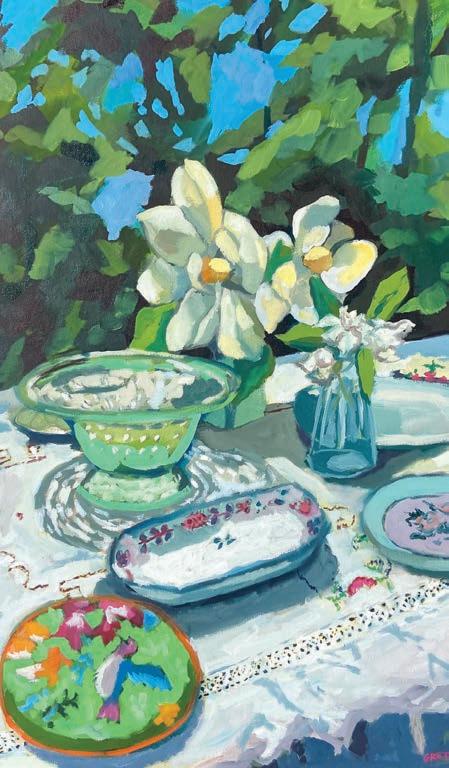
I’ve found the VR and immer sive art exhibitions/experi ences to be very interesting and promising. That’s what I’ve always gone for with my leather jackets. Art should be an experience.
On the other hand, I’m not a fan of NFTs and crypto art, but maybe I just don’t know enough about it to appreci ate them. In my unin formed opinion, unless a person is a digital artist, I just don’t re ally see the point.
Personally, I would
rather see a piece hanging on my wall than as my desktop or phone background. To me, art is like thank you notes. Much more meaningful handwritten than typed.
Fayetteville
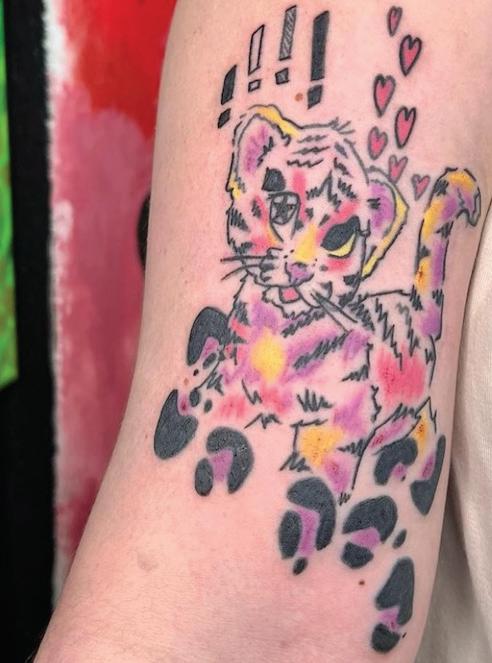
5 years active
amnielsenart.com
IG:@ashley.nielsen
If you work in multiple mediums, what do you love about each one?
I’m a “painter” first and a tattoo artist second, and I’m constant ly working on connecting the two and working through the mental disconnect. I love how freeing painting is, how quick I can make something come to gether, and the room to change things and experiment while making. With tattooing, it’s quite literally the opposite. It’s permanent, and while you can make changes, you definitely have to take time to let the skin heal. I do enjoy that it makes me more conscious about my artistic choices, creating in a way that has a bit more guide lines and connection to skin.
How would you define art in 2022?
I think everything and everyone is growing at a rate that we’ve never experienced before, I think art now is shedding old academ ic skins, and the younger gener
IG: @art_of_egodram
After I quit art school because they were considering kick ing me out anyway, I actual ly kinda gave up on the idea of making art as a serious ca reer for myself. I’d paint and draw when I was home from work for my own enjoyment, and if someone happened to buy something, then great. This little “hobby” of mine was the norm for a very long time.
But, as it tends to go with most people in similar circumstanc es, Iraq changed everything. That environment tore me
ation of artists is creating art that is accessible, understandable, and more inclusive. I’m not re ally sure how to define 2022 art, but I think, as a whole, it’s focus ing less on materialistic value.
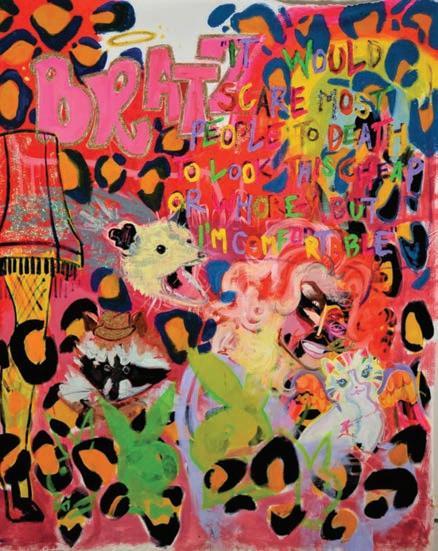
apart and smashed the pieces back into each other in ways I didn’t think were human ly possible and in ways that I still struggle to understand.
Upon my return, I started to notice that not only was the noise now tainted somehow but that it had become over whelmingly “loud” to the point that at peak “volume,” the world around me would cease to exist; leaving just myself and the sketchbook I’d kept tucked under my ACU jacket.
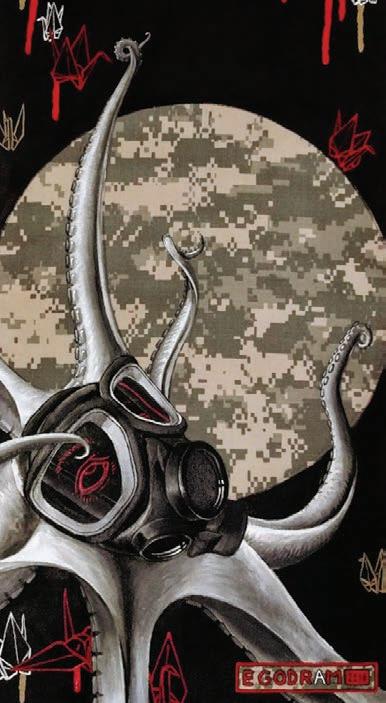
Where do you think your artistic journey is leading you?
Hopefully, into a bigger studio with better equip ment, better lighting, fiber internet, and a wine rack.

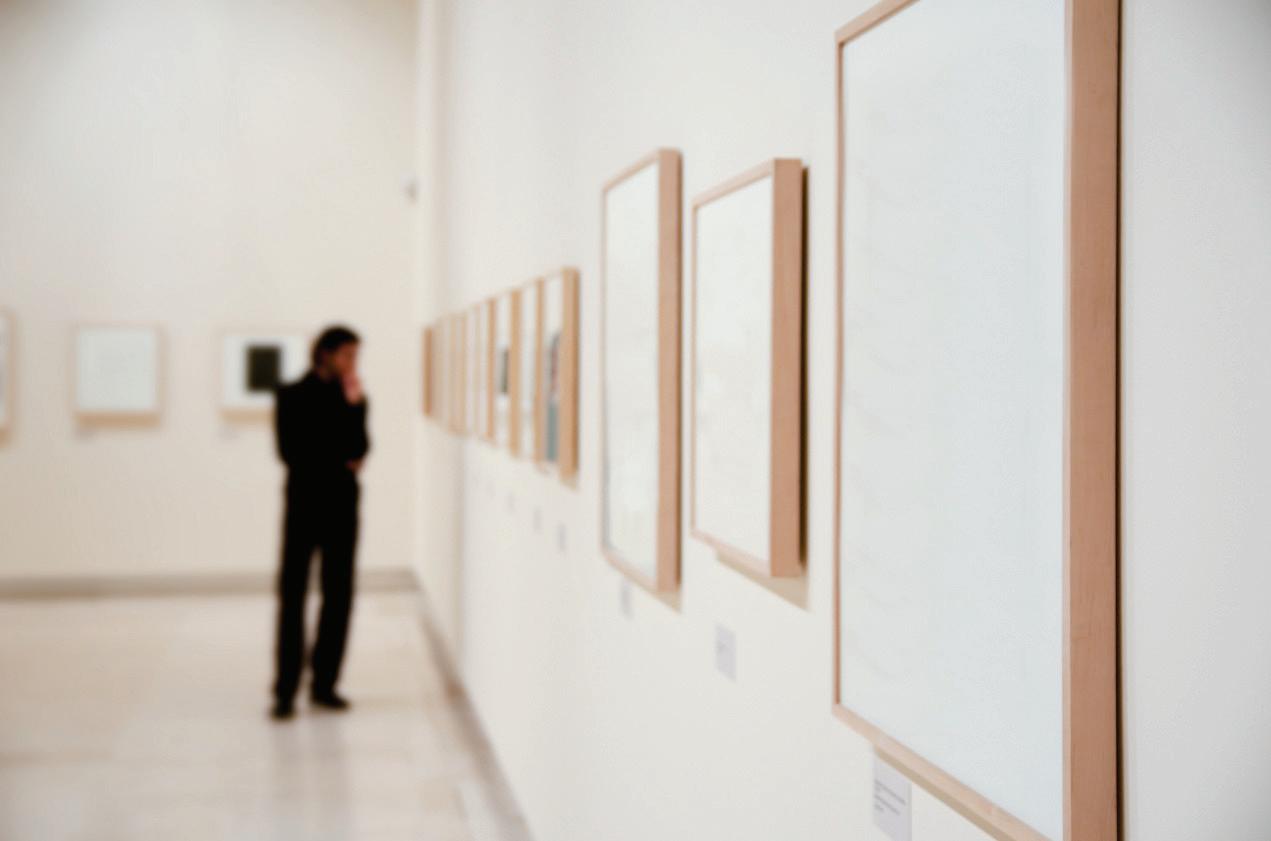
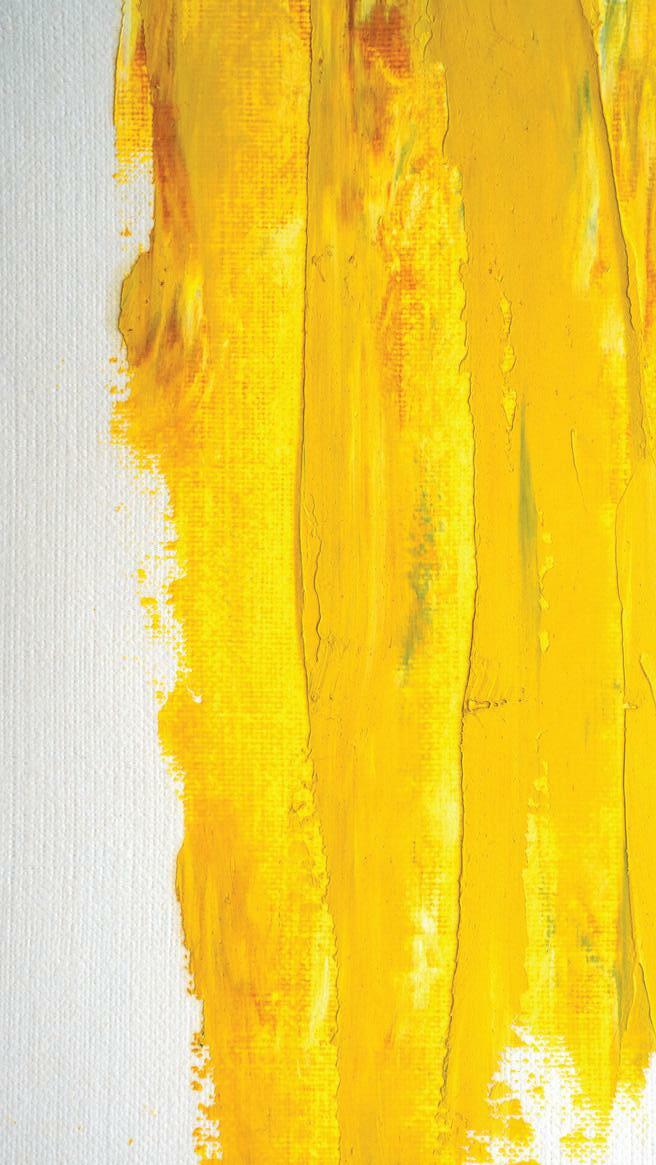


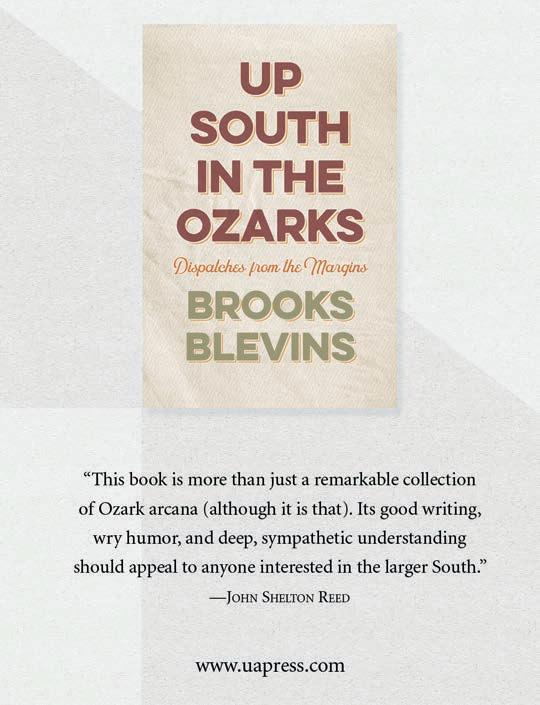
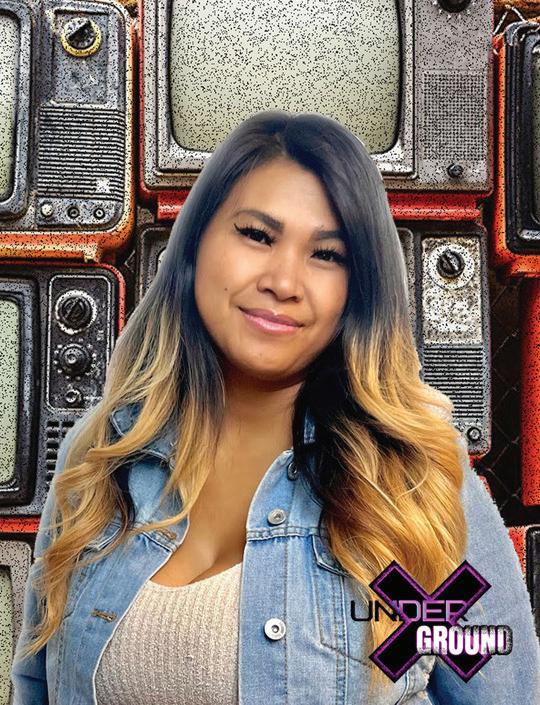
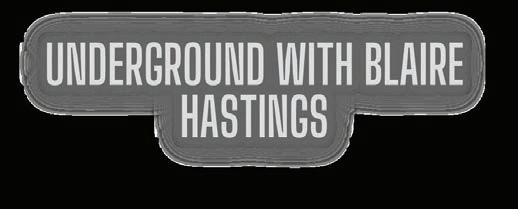
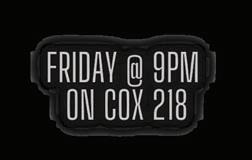

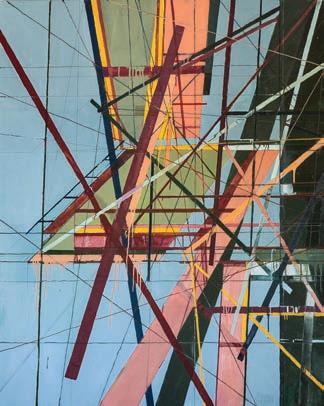
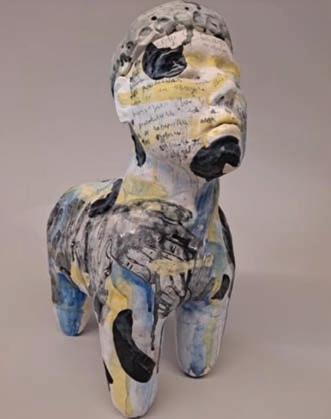
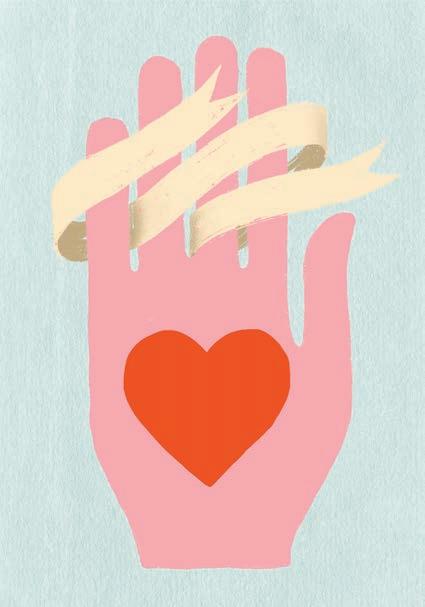





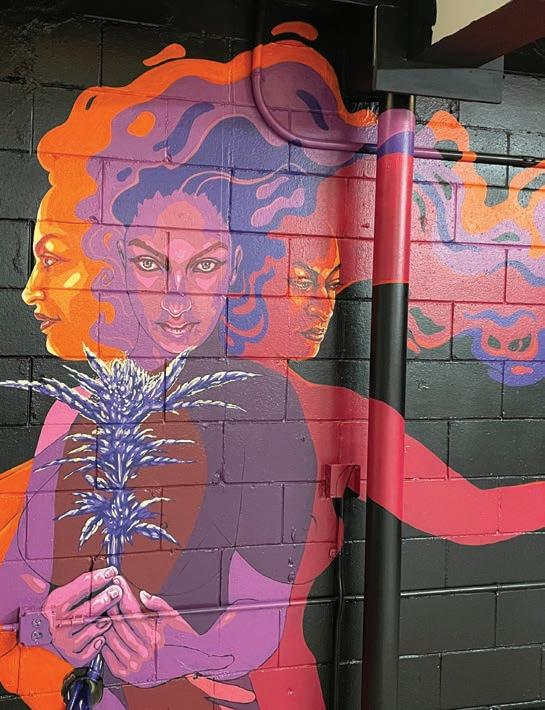

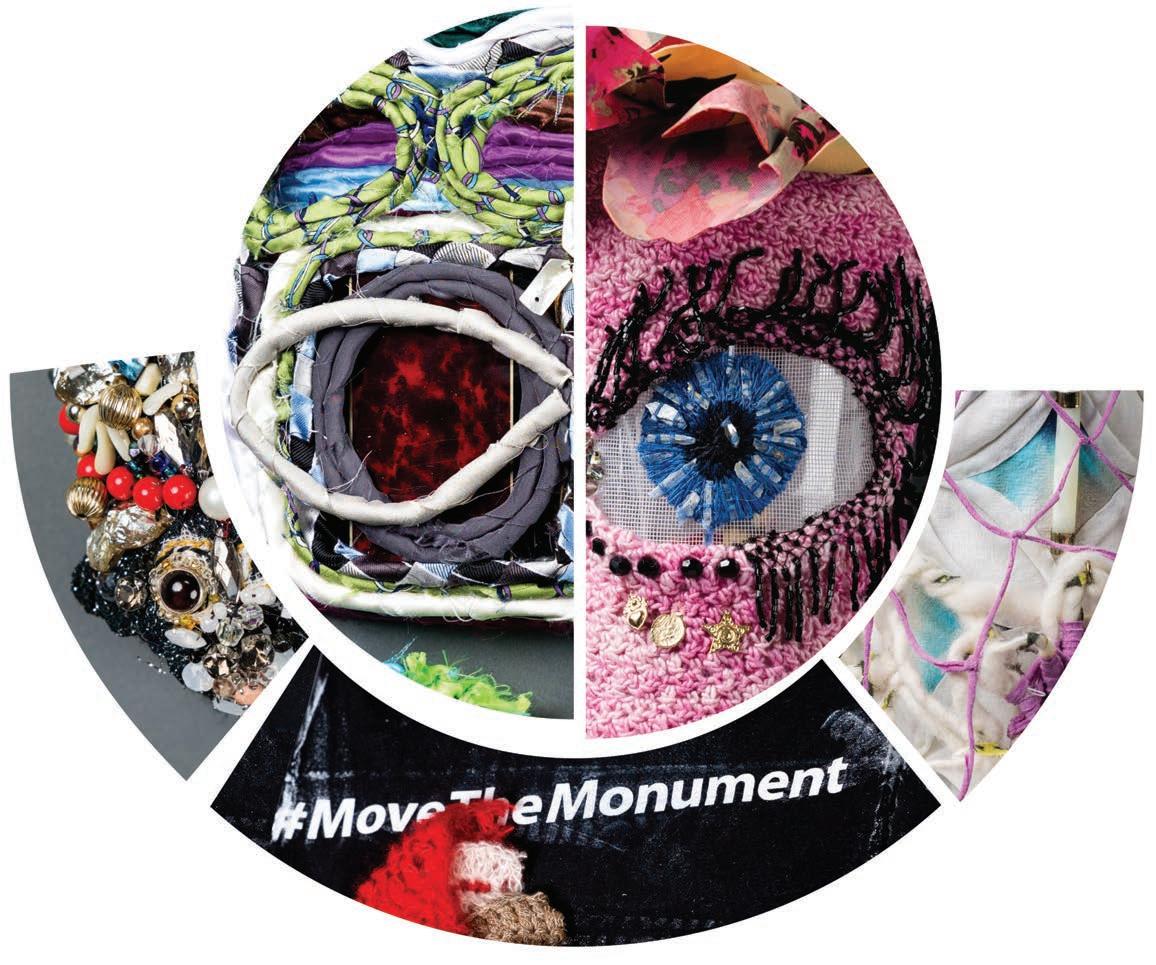
Suzannah Schreckhise is a multidisciplinary visual artist based in Fayetteville, Arkansas. She earned a Bachelor of Art at the University of the Ozarks.. She has participated in and won awards at numerous state and national exhibitions, including shows at the Woman Made Gallery in Chicago, Topanga Gallery in Los Angeles as well as exhibited at the Ceres Gallery in New York City. She received 1st place at the NEA Big Read Recycled Art Exhibition at the Windgate Gallery at UofA Fort Smith. Her art has been featured in several publications, including the international juried magazine Studio Visit. In 2021, her work toured the state as part of Arkansas state Women to Watch exhibition Paper Routes, curated by Allison Glen for the Arkansas National Committee of the National Museum of Women in the Arts; she was juried onto the committee's artist registry in 2019. She won 1st Place at the RAM 2019 Annual Invitational that was awarded this 2020 solo show and a cash award. Suzannah was awarded the Artist 360 grant in 2020 sponsored by the Mid-America Arts Alliance. She is juried into and selected as a purchase award for the 2023
Small Works On Paper Traveling Exhibition sponsored by Arkansas Arts Council.
This project is funded by Artist 36O, a program of Mid-America Arts Alliance with support from the Walton Family Foundation
Thank You to Idle Class
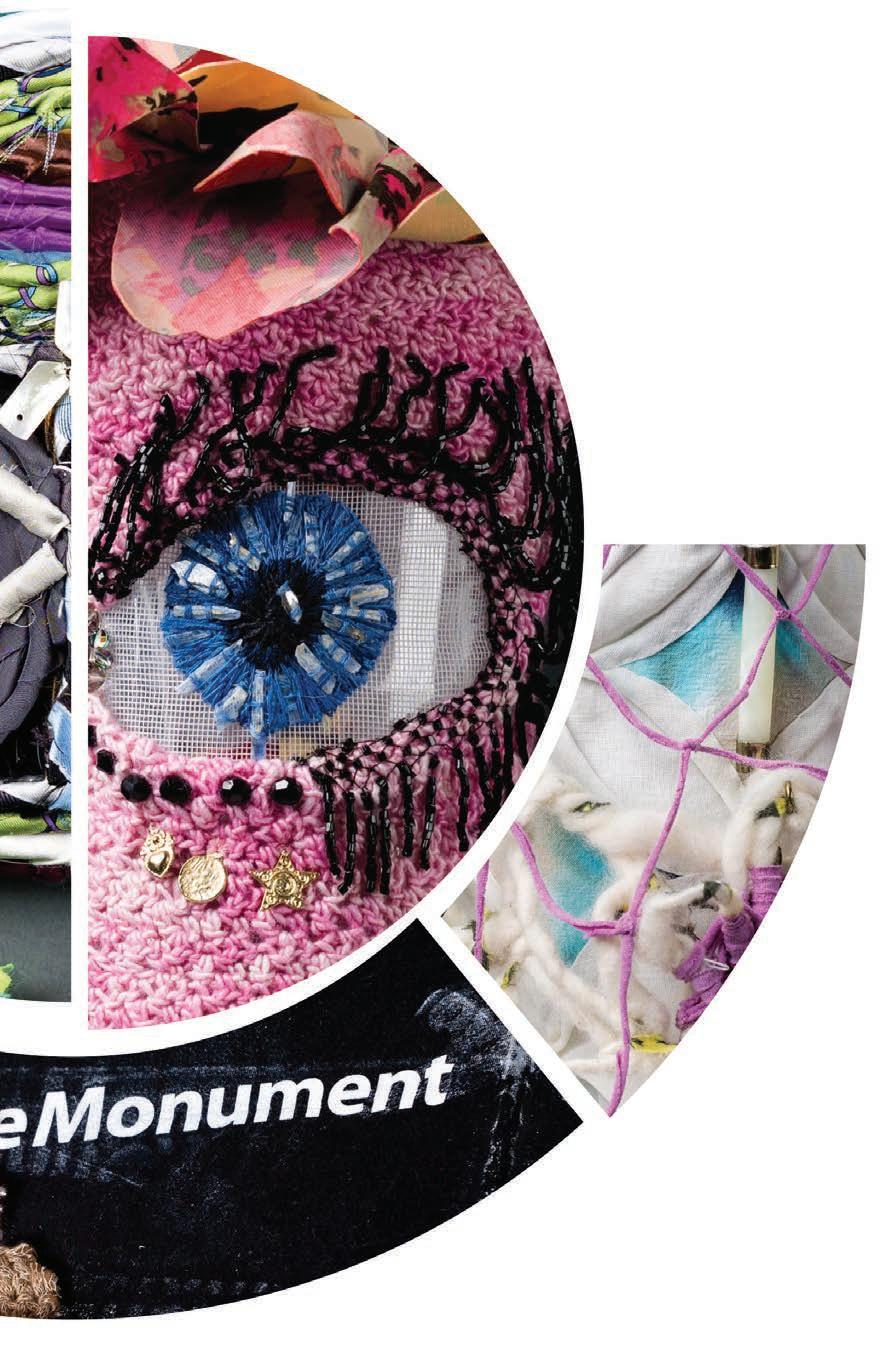
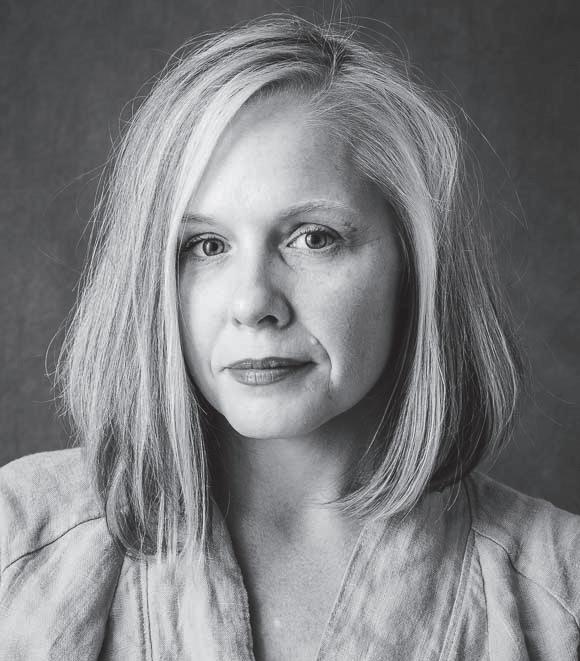
Project is a series of art masks and oral histories funded by an Artist 3 60 grant from the Mid America Arts Alliance. The sculptures (which also serve as func tional masks, plus one quilt) are constructed using materials contrib uted by the participant it honors in combination with personal items of my own. The masks, made in response to interviews with participants conducted alongside poet Molly Bess Rector, serve as little altars to the person’s story as told through ma terial objects, with my support represent ed by contributions of items that hold person al significance for me.
This body of work ex plores the intersections of art, tools, and plvx ace. I spent a full year creating these five works, each mask taking two months to construct and the quilt taking about four. This year was a time of both reflection and action, and as I deep ened my encounters with both the participants and the materials they contributed, I found the project shifting to accommodate a broader interpretation of safety, beauty, and comfort. The resulting pieces serve as a kind of a visual diary of my experience being changed by the stories of the people in my community.
This Zine is a small showcase of that diary. To see more photos of the original materials, the people who contrib uted, and the final pieces, and to read the full story for each piece in this series, and to learn where they are being exhibited:
visit NWAMaskProject.org
Crocheted angora and wool yarn, vintage quilt blocks, silk, wool, cotton fabrics, Sevens #movethemonument t-shirt
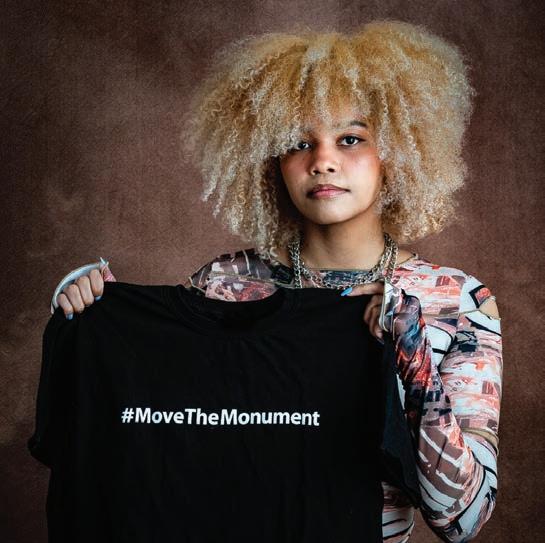
Seven told is one of experiencing racist abuse and discrimination.
Making this piece was very challeng ing for me, as I was aware of the limitations
I faced trying to tell her story in a way that wasn’t completely filtered through my white bias.
When I don’t know the answer to something I want to com- municate, my process is just to start and ask for guidance within myself as I go. This in tuitive process unfolded throughout my work on this piece, in partic ular when I chose to cut up the quilt pieces after I had hand sewed and crocheted the Santa faces. I didn't realize I was going to do that until I got finished with each quilt block. As I cut up work that I had tried my hardest to execute thought- fully, I was aware I was making a choice, and I thought about the ways Seven’s story was about having no choices about how her community received her activism, and the feelings of powerlessness following what happened to her hard and thoughtful work. I wanted to show my understanding and offer some limited solidarity (realizing it still fell very short) by creating a consistent pattern and then tearing it, cutting it, and stepping on it. This process represented the way the Northwest Arkansas community responded to Seven’s efforts toward equity and justice with #movethemonument and the activities of the Black student union she founded.
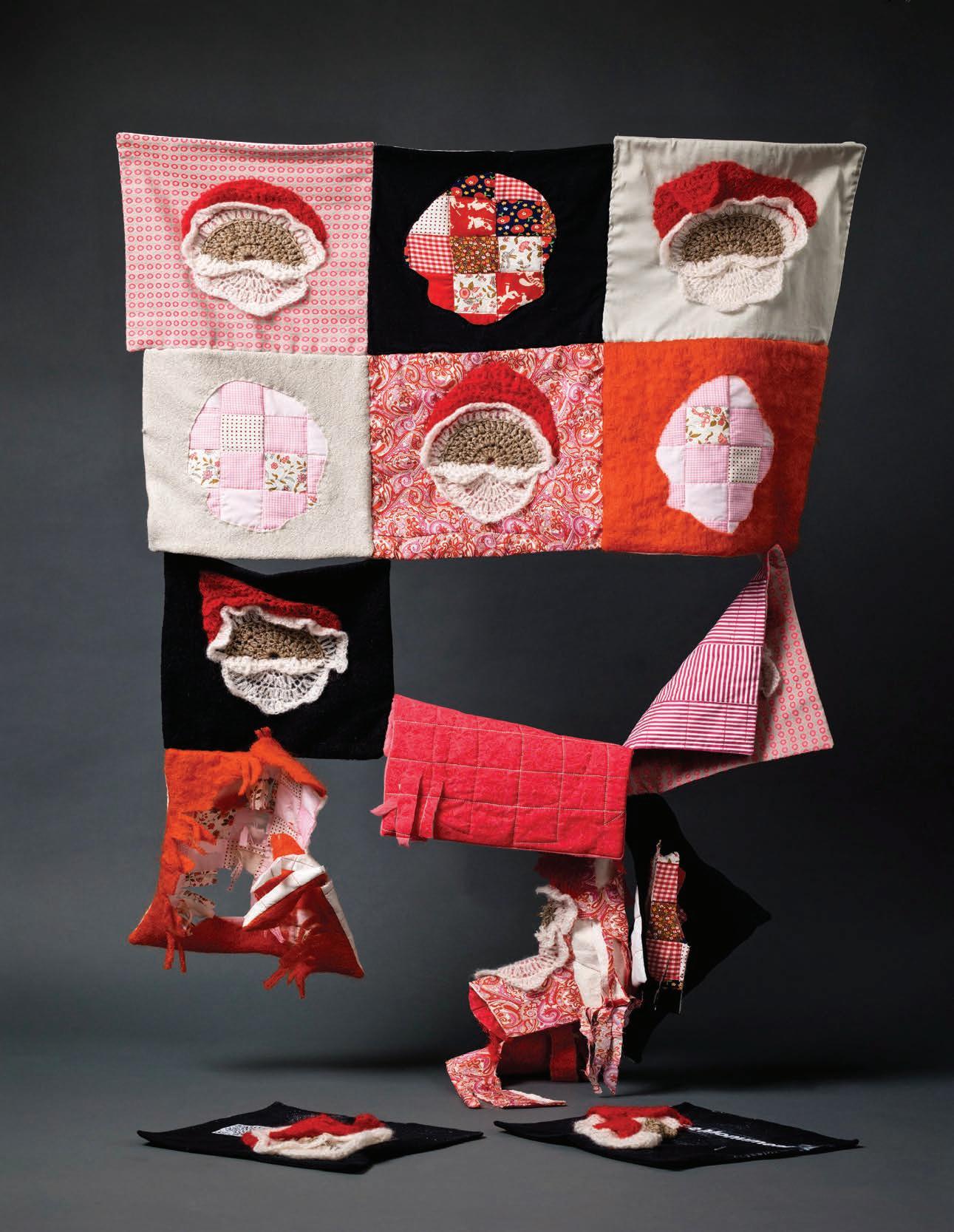
of people define themselves by the things that have happened to them, but I define myself by what I love and who I love.
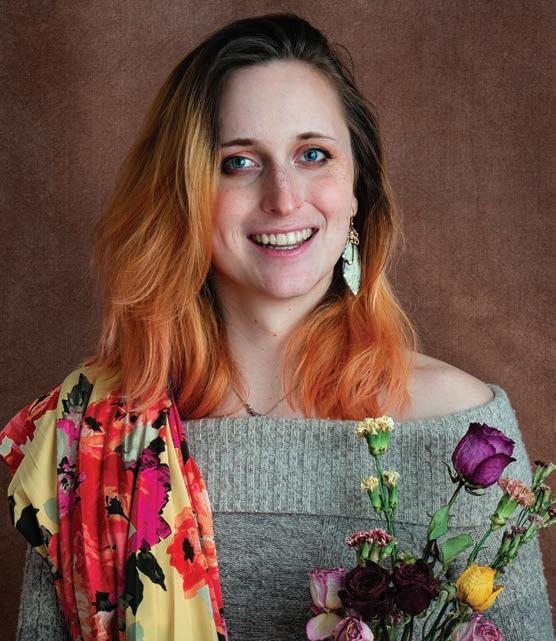
Wool crochet yarn, vintage beads, crystals, screen, embroidery and Bellamy’s dress, Marble Base
x 23" x 12"
To make this mask, I used crystals, vintage beads, Mexican charms, and a Japanese figurine from my personal collection. The figurine of a dancer appears in the middle of the hand made flower constructed from scraps of the first dress Bella- my Brooks wore in public. The balleri na figure represents the freedom that comes with true self-expression, and is inspired by Bellamy’s state ment that when she wore this dress for the first time, she felt “ joy, childlike energy, glee, bliss, ecstasy, eupho ria.” After hearing Bellamy’s story and learning about her advoca- cy for the trans communi ty, I wanted to make a mask that represented the support and energy required to be au thentic in our harsh world. I used the one eye for protection and, for courage, charms representing the heart.
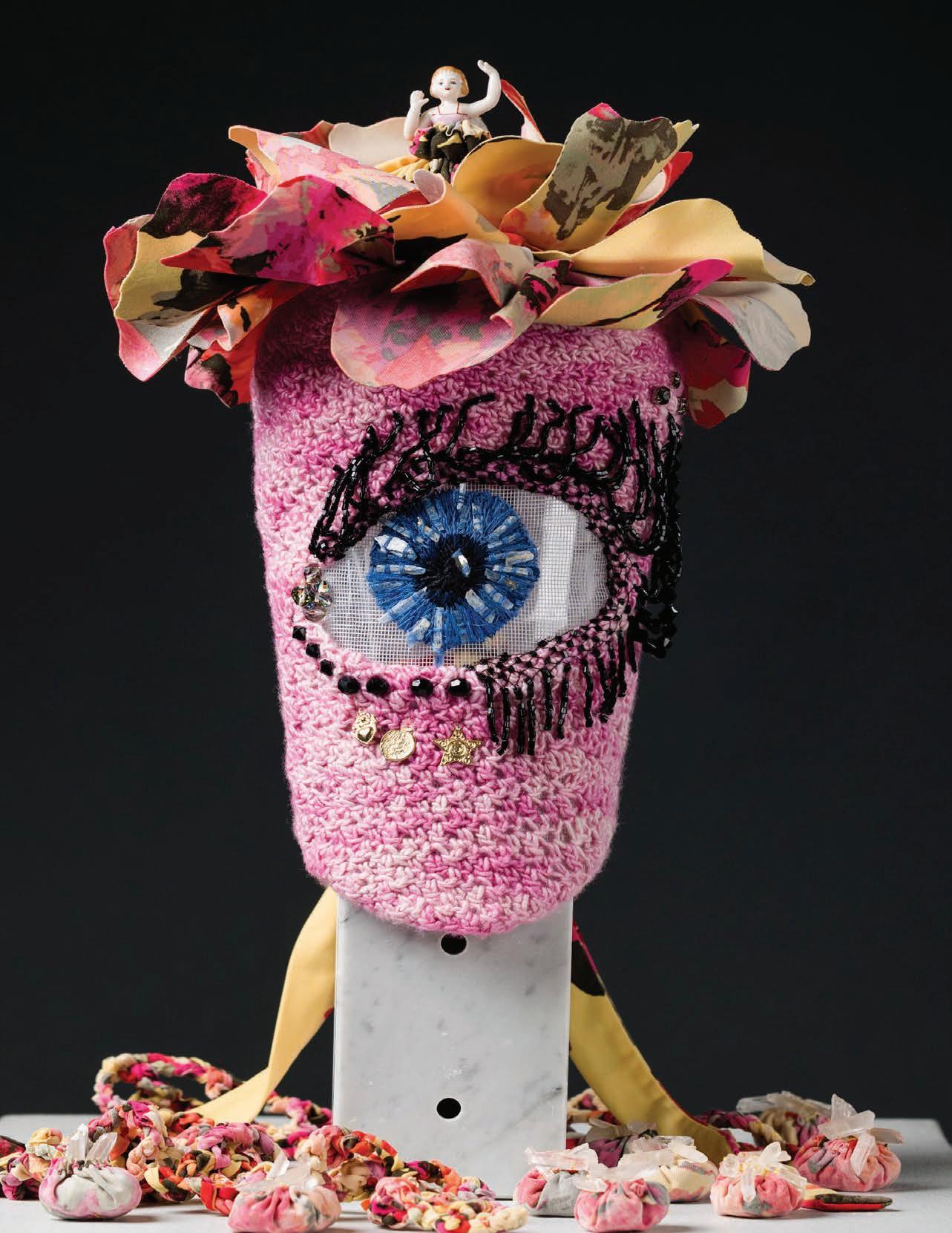
My mom did this
circle.
Hand-quilted Cathedral Window mini quilt, screen, embroidery, jade stones, Mexican charms, beads and Rosie’s yarn and birthing shirt
I used a scarf my mother made for me along with some off white
fabric from my vintage collection to make a mini quilt that is layered under yarn Rosie made from wool and a scarf her own mother made. Layered on top of that is the tank top she wore while giving birth to her youngest daughter, Raven. The cut and macramed birthing shirt is layered over the wire, which is in turn wrapped in the wool and scarf, symbolizing the generations of women and influence they have on each other. I also used jade from my stone/ crystal collection and Mexican charms that symbolize family and love.
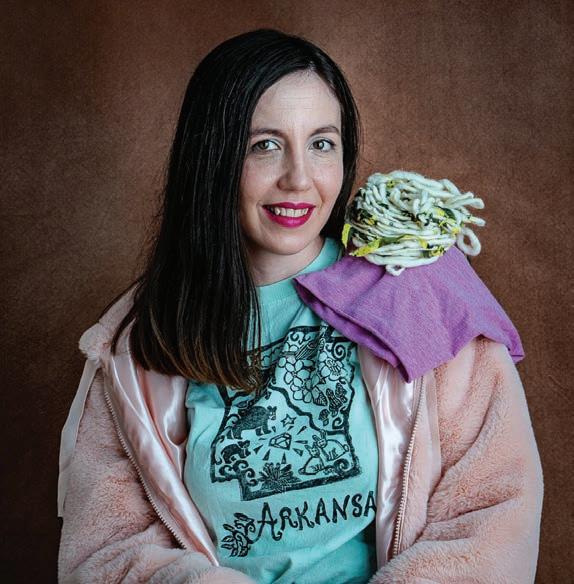
During our inter
view, Rosie’s older daughter joined the call and said of Raven, “I’m proud of my sis ter’s strength,” which I included in beadwork on a miniature pillow. The pain, strength, and interconnectedness it takes to lose a mother, to become a mother, to enter this world, and to love one another are the themes of this mask. It was an honor to be entrusted with making a piece of art that captures three generations of women, and to add my own multigenerational material to represent how each of us is part of this legacy.
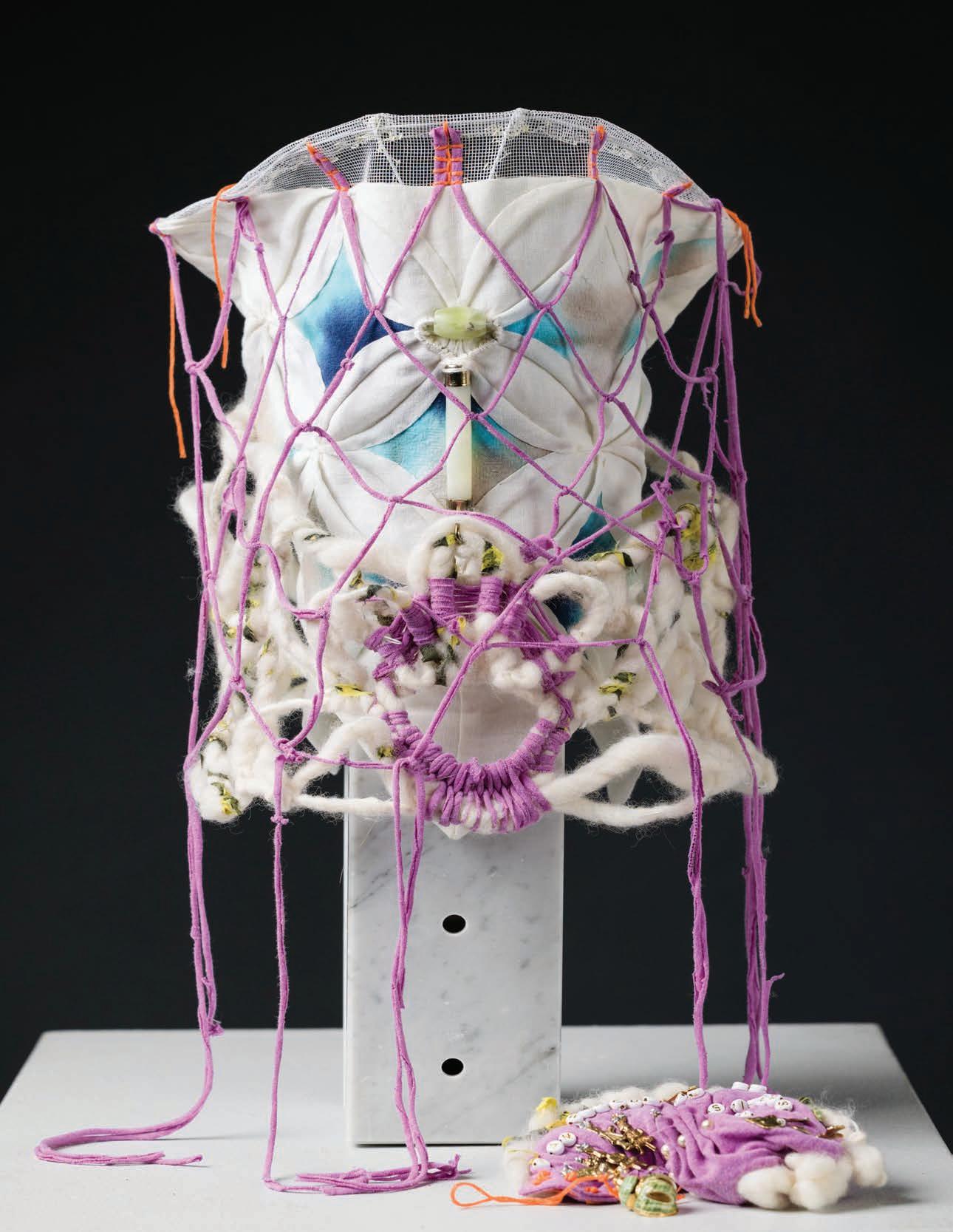
Screen, crocheted wool and plastic yarns, sequin fabrics, beads and stones, embroidery, as well as ruby ring, feather earrings, and silver/black blouse that belonged to Zeek’s mother.
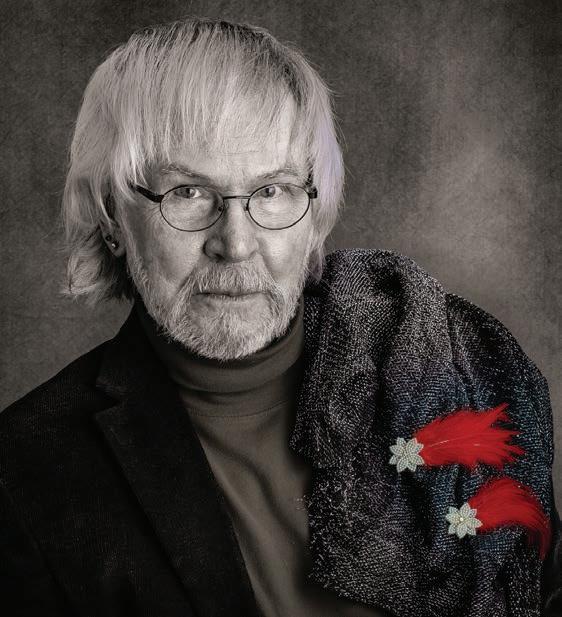
17" x 22" x 4" 2022
parties, tales of growing up, and monkeys.
To make this mask, I used crochet, embroi dery and tradition al hand sewing. I created a monkey head to top the mask out of Zeek’s mother’s going-out blouse and encrusted it with beads and jew- els from my collection. The eye the monkey holds open is his moth er’s ruby ring.
For the lower part of the mask, I used sequin fabric from a blouse I wore to parties when I was younger, which I embroidered with the pattern of linoleum that was on the floor of Zeek’s moth er’s Beauty shop, where she taught him to dance. I was so touched by the way Zeek described his mother: how she incorporated her beauty business into their family, the consistency of uniforms she wore everyday to work, that when she got dressed up to go dancing with Zeeks’ dad, “she looked like a princess.” This mask speaks to the love and support Zeek felt from his mother and the fun and security he had in his home.
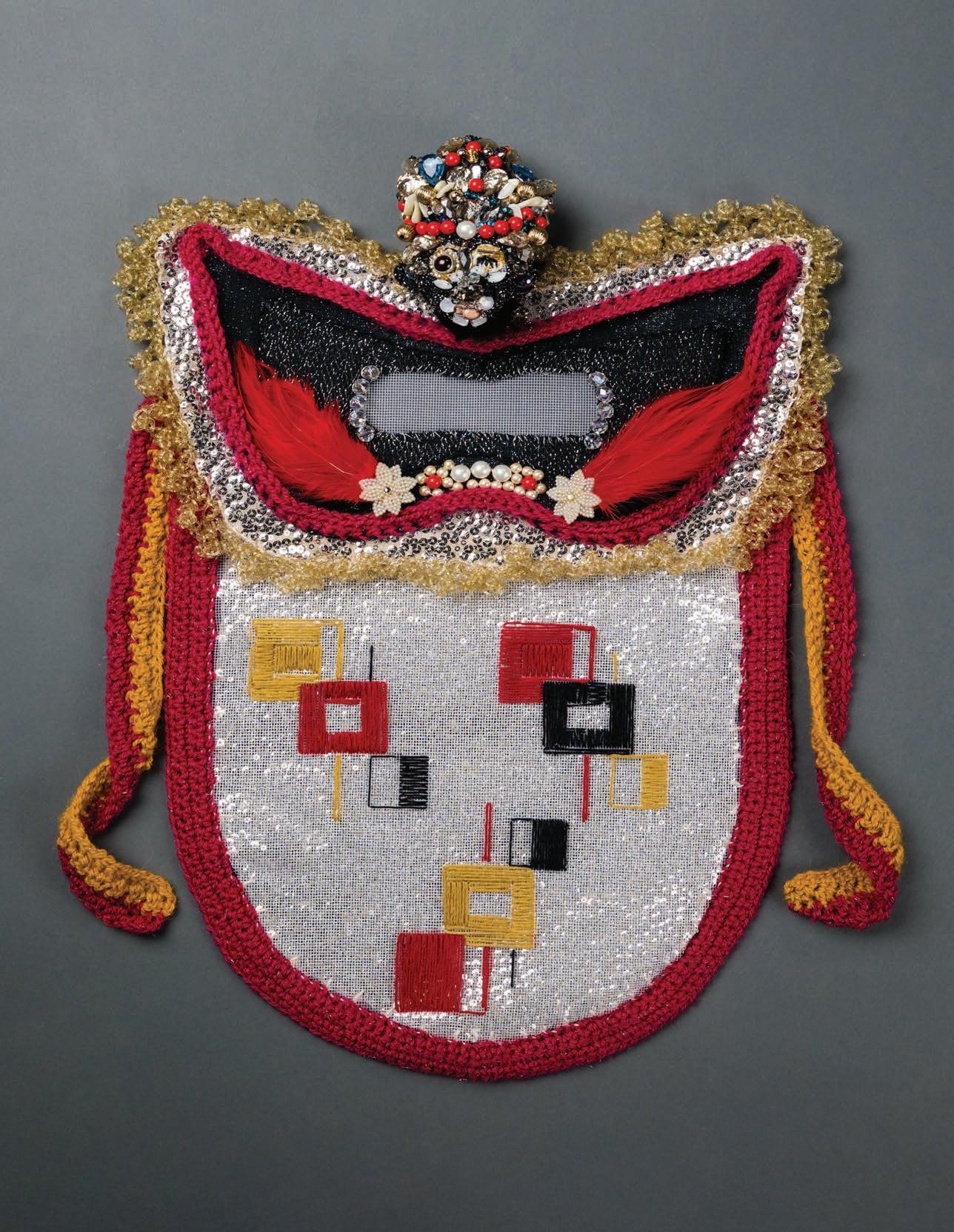
it was important to her that David was surrounded by the things that he loved when he died.
Silk and cotton fabrics hand sewn around cotton rope, and mother of pearl beads (from Mary's friend David Locklas). Pocket squares and scarfs, cigarette case
16" x 25" x 5" 2022
This mask held personal resonance for me, as it honored two friends from college, David Lochala, who died in 2018, and Mary Zunick, who sup- ported David through the end of his life and contributed pocket squares, silk scarves, and a fancy cigarette case that had belonged to him. I combined the items Mary gave me with silk fabrics and mother of pearl beads of my own. David was a perform- er — a musician — and I remember him as always being sharply dressed. In making this mask, I wanted to be able to use and show all the colors of the pocket squares and scarves Mary contributed, as I felt they spoke to David’s creativity and vital- ity, so I hand wound the fabric around rope and hand sewed them together on the back. The cigarette case that is the base and foundation of the piece was influenced by the theatrical masks.
In her writing for this project, Mary stated that it was important to her that David was surrounded by the things that he loved when he died. The mask communicates the power fabric items have to make us feel secure and loved. security he had in his home.
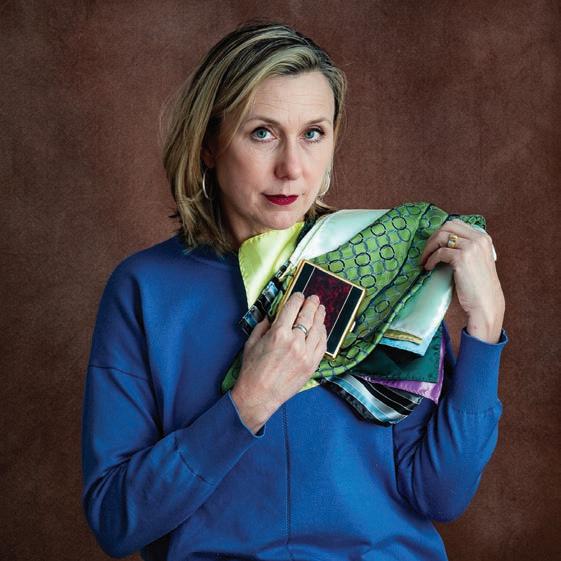
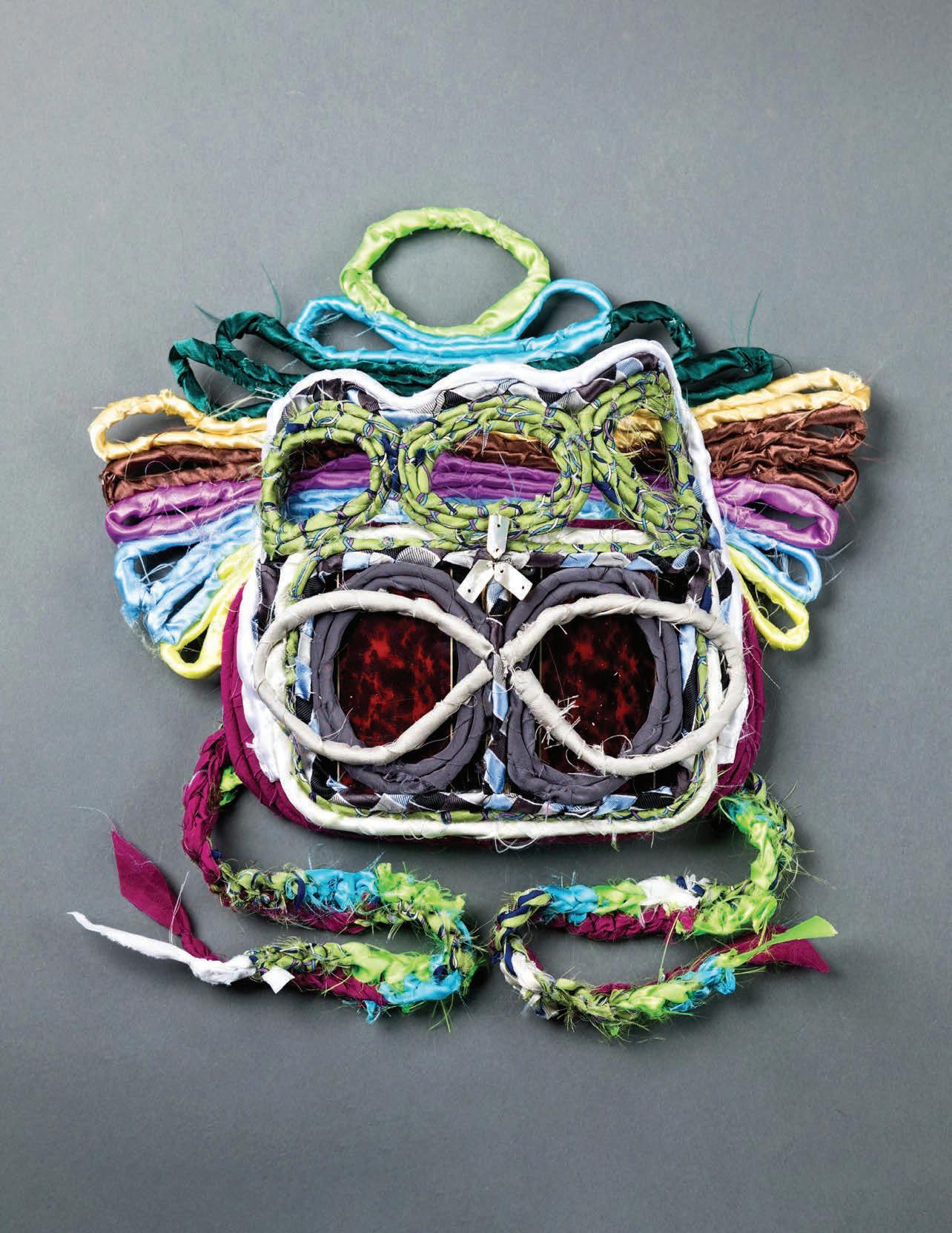
Cowboy boots. Bathing suits. Sneakers. Hollywood gowns. Denim jeans. And more. Step into the story of American fashion.
